




Pleasecheckthis consideredatthe legislation forproposed 2023, link 9,May on or after to be 2
State Bar of South Dakota June 2023 Newsletter Issue 6 4 President’s Corner Lisa K. Marso 12 A2J Superheroes 8 Fellows of the South Dakota Bar Foundation 14 General Announcements ALPS Risk Manager Mark Bassingthwaighte 6 Young Lawyers News 10 Dean’s List: News From the Law School Neil Fulton 18 50 Year Veterans 36 Why Malpractice Policies Typically Don’t Cover Consulting Work? Anthony P. Sutton 48 State Bar of South Dakota Association Healthcare Plan Information 42 Indigent Legal Services Task Force to Host Listening Sessions 44 Committee Assignments 2023-2024 24 Board of Bar Commissioners April Meeting Minutes Understanding the Ancillary Services Coverage Concern 29 2023 Convention CLE/Speaker Line Up 49 Proposed Legislation to be Considered at the June Annual Business Meeting 114 Notice of Special Rules Hearing 116 Memoriam 119 Career Center 132 Upcoming Events 3
What a joy it has been to serve as the State Bar President this past year. I truly hope learning a bit more about our Presiding Circuit Court Judges and some of our hundreds of Public Sector attorneys has inspired you. I also hope you have been able to connect with some of them, some colleagues, and loved ones.
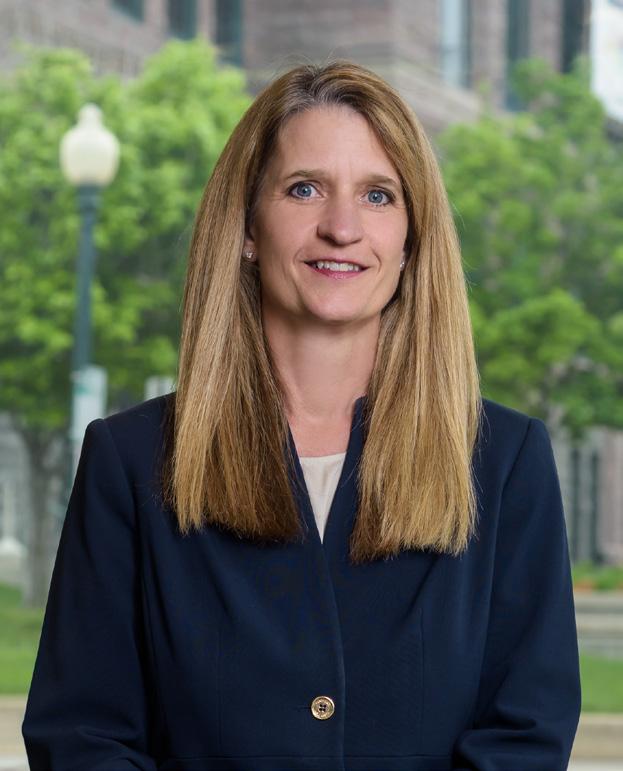
As I am nearing the end of my term, several people have asked what I enjoyed most about serving as President of the Bar and what I will most remember. Certainly, there have been many opportunities to learn about different programs at various national bar meetings and to work to get projects and changes implemented in our State Bar. Yet without question, what I will most remember and have most enjoyed has been the opportunity to develop new and strengthen existing relationships with individuals whom I see are clearly making a great impact for our Bar and State.
Those relationships will not end on June 23rd, but I will slip back into the shadows with those other often unnoticed individuals, and I will continue to engage. I hope you always feel welcome to reach out and connect with me, even though I may not have a stack of coffee gift cards to send out!
For those of you who wonder what did get done behind the scenes this last year, with the help of the hardworking Bar Commission and incredible Bar Staff, here are a few highlights:
Internal Processes/Appointments: So many items this year were worked on behind the
scenes. A budget and finance policy was created, setting forth timelines and expectations, particularly with the involvement of a dedicated subcommittee of Commissioners which has led to a timely and balanced proposed budget. A Commissioner subcommittee was also created to focus on involvement with and support of A2J. Director & Officer insurance for Commissioners was secured. Member Benefits criteria was finalized wherein to become such a benefit; set criteria is to be met and voted on by the Commission. A process of publication was created so that announcements will be made for openings (e.g. ABA, vacated Commission positions). A proposed change to the nomination process for President-Elect was drafted (to be presented in June), knowing that the President position needs a foundation of Bar knowledge, involvement, and ability to plan to be unavailable for client work, particularly when the President position sometimes seems to be a part-time job. The Bar retained a new accounting firm as our prior firm no longer provides such services; that firm will be providing a report on its evaluation of the separateness of CLE, Inc. We evaluated retaining a communication consultant and, at the request of members, re-evaluated the mailing of the newsletter (ultimately decided not to do either). We also created the ability for each Bar Commissioner to hold a meeting in their districts spending up to $500, so they could connect and listen to your ideas.

4
Health Insurance Offering: The offering of health insurance for attorneys has been a longtime project worked on by many Bar Presidents, Commissioners, and Staff for several years. Roll out was finally possible this year, and members are being signed up and insured.
Annual Meeting Updates: We are mixing things up here again in small ways. I am hopeful presenting some key awards at the Wednesday evening social will provide a good audience for the well-deserved awards (50 year vets, McKusick, Pro-Bono) and recognition of our outgoing Commissioners. It also will allow the Friday business meeting to end prior to lunch. I am also excited about the Thursday BenchBar social to allow our Judges and Attorneys to connect outside of the courtroom, and I thank Chief Justice Jensen for his support for this event. I am also excited about the slides that will be shown throughout the meeting, highlighting some of our members, activities, awards, and CLEs.
Hiring of a new Executive Director: Certainly, this year, a large undertaking was done due to the quite unexpected resignation of Andy Fergel, who moved to North Dakota. The Bar was blessed to have numerous well-qualified attorneys apply and be interviewed, with the Commission making the great selection of Paul Cremer. Paul has been a great asset so far, and we are looking forward to his continued leadership.

More details of these highlights and other work accomplished this year can be found in the April Bar Commission minutes on page 24. Or just ask one of the Commissioners, President-Elect Lammers Bogard or me as any of us would love to visit with you.
Lastly, please know that I am exceedingly grateful for the leadership of the past Bar Presidents and of those who will come after me (such as Pres-Elect Lammers Bogard). Also know that we are in good hands with our current staff, whose support has been unending and for whom I am so grateful. It has been a privilege and honor to be your President these last 12 months. Thank you for the opportunity and your support this year.
Heather, thanks for your friendship this year. Here’s to your Presidency! Lisa

“If your actions create a legacy that inspires others to dream more, learn more, do more, and become more, then you are an excellent leader.” Dolly Parton.
5
As I prepared to write my final YLS President’s message, I was struck with pride in the work the current YLS Board accomplished this past year and also recognized there is still much work to do.
In my May message, I noted several items relating to the State Bar Convention that warranted highlighting. Of those items, I want to remind everyone of the events the YLS will be hosting. Those events include:

• YLS Speed Networking. This will take place on Wednesday, June 21, 2023, at 3:30 pm. If you are interested in participating in this event, please register using the following link: https://www. surveymonkey.com/r/ZLLQSCW.
• YLS Annual Business Meeting. The YLS annual business meeting will follow the Speed Networking event. Elections of new YLS Board members for odd-numbered circuits (1st, 3rd, 5th, and 7th) and officers (President-Elect and Secretary/Treasurer) will occur at this time. Nominations for these positions can be made from the floor during the annual business meeting.
• YLS Legalpalooza. The YLS Legalpalooza will follow the YLS annual business meeting. The YLS wants to thank the SD Trial Lawyers Association for helping sponsor this event. During Legalpalooza, the YLS will hand out its annual Young Lawyer of the Year Award, and the State Bar will hand out a few other awards at the same time.
• Free Professional Headshot Photos. As a new offering, the YLS has hired a professional photographer to set up and take headshot photos of any member of the Bar or any
law student who would like a professional photograph. The photographer will be available between 3:00 PM and 5:00 PM on Wednesday, June 21st, at the Best Western Ramkota. Signups for headshot times are available using this link: https://www.signupgenius.com/ go/10C0A4BACA92BA3FC1-ylsfree.
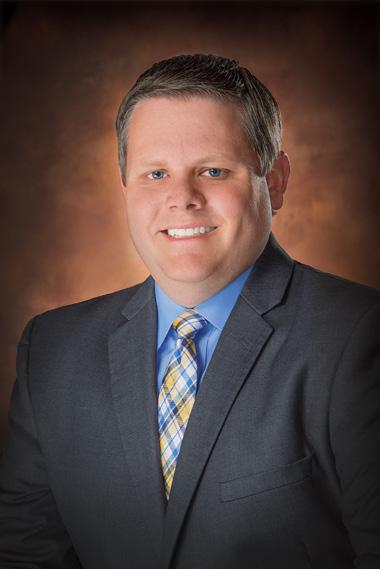
I also want to encourage every member of the Bar to attend the State Bar Convention. The CLEs planned this year are great, and the Bar Convention is a oneof-a-kind networking event. I would further encourage every firm that has an intern this summer to encourage them to attend the Bar Convention. Registration is free for law students.
Before I conclude this report, I want to take a moment to pass out some thank yous. First, I want to thank the entire YLS Board of Directors who put in many hours in service to the Bar to do their part to improve the practice of law for young lawyers: Kelsey Blair, Chelsea Wenzel, Mallory Schulte, Brooke Schmidt, Tony Teesdale, Spencer Prosen, Rebecca Ronayne, Rachelle Norberg, Katelyn Cook, Mae Pochop, and Alex Hoffman. None of the accomplishments of the YLS Board would have been possible without each of you. I am honored to call you all my colleagues and friends.
Second, I want to thank the State Bar Leadership and the Bar Commissioners. You each played a role in supporting the YLS and our work would not be possible without knowing that we have buy-in from the Bar’s elected leadership. I specifically want to thank President Lisa Marso for her support of the YLS and constant words of encouragement to me and to the YLS Board.
AnthonySutton
6
Third, I want to thank the State Bar Staff: Paul Cremer, Andy Fergel, Elizabeth Overmoe, Tracie Bradford, Nicole Ogan, and Kylee Hoffman. You are all so invaluable to the Bar. I have truly enjoyed working with and getting to know each of you this past year and during my other years on the Board. No matter what questions the YLS Board had or issues we faced, you were each willing to take the time to help us work through anything that came our way. I appreciate that you all have always been there to sit on a zoom call, respond to my emails, or take my phone calls with questions.
Fourth, I want to thank the entire State Bar membership. Through my service on the YLS Board, I have been privileged to interact with many different lawyers and have gained an appreciation for how diverse and talented our Bar is. Not only do many of you give back to the Bar itself through your work on committees and sections, but many of you contribute to your local bar associations and communities – oftentimes without the recognition you deserve. I encourage all of us to keep alive a spirit of service so that we can continue serving our communities and the public.
Fifth, I want to thank the many other Young Lawyer leaders and mentors who have supported me during my five years as a part of the YLS Board and encouraged me to get involved. Although I cannot name everyone specifically, I do want to give special thanks to Tamara
Nash, Elizabeth Overmoe, Bob Morris, Nicole Tupman, Judge Karen Schreier, Carrie Srstka, Nathan Chicoine, and Ole Olesen.
Finally, I want to thank my mentor and law partner, Pamela Reiter. From the day I began working with you, you ingrained upon me that service to the State Bar was the expectation. I am so glad that I heeded your advice and am honored that I could follow in your footsteps as a President of the YLS. I hope that someday my service to the State Bar can be as impactful as yours.
Of course, I also must thank my wife, Stephanie, and our kids, Quinn, Callum, and Elijah, who were there to support me as I took additional time away to be involved in the State Bar. I love you all.
Thank you for allowing me to have the privilege of serving as the 2022-2023 YLS President. I have been humbled by this experience and hope my efforts were able to play a small part in the Young Lawyer Section’s overall goal of improving the practice of law for our State’s young lawyers. I look forward to seeing what the YLS Board will accomplish next under the leadership of my friend and current President-Elect, Kelsey Blair.
Best Wishes, Anthony Sutton
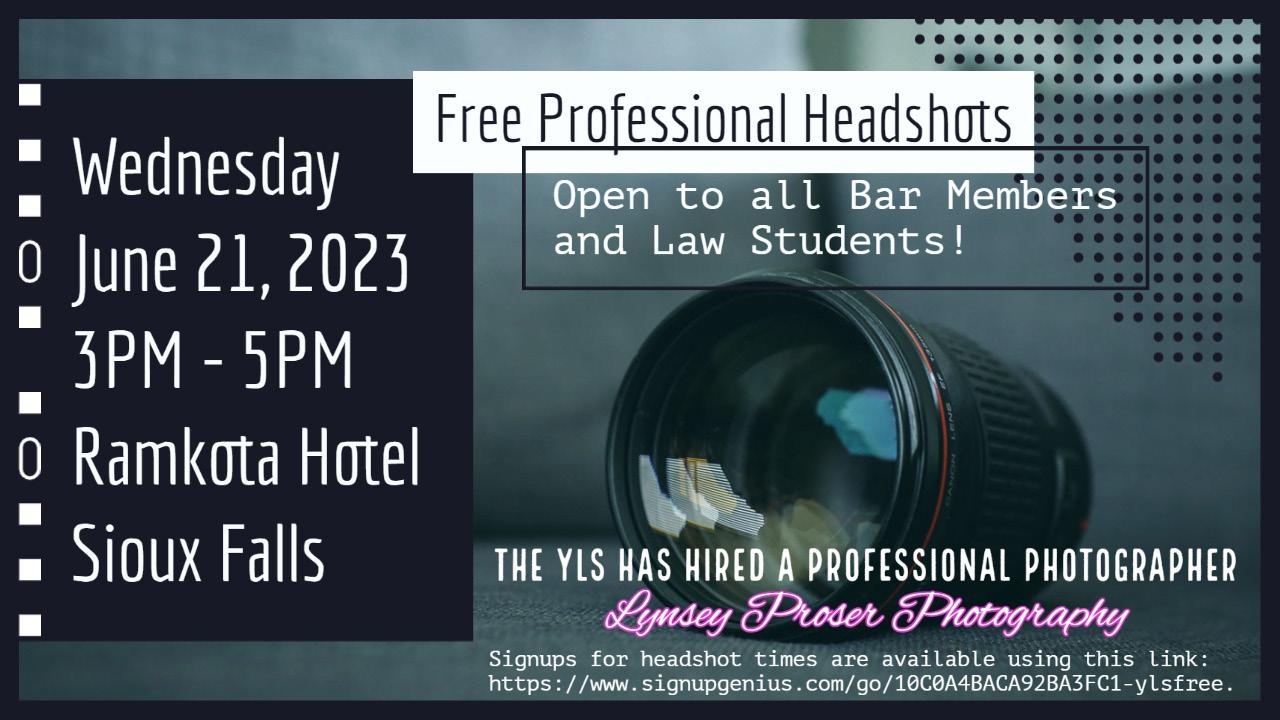
7

8
Fellows of the South Dakota Bar Foundation

– – – – – – – –9
Grades play an essential role in law school life. Law schools across the United States take many approaches to grading. It is important to have an appropriate and understood grading system. To that end, the faculty here has been engaged in an evaluation and reformation of our grading policies and procedures over the last year. I am happy to share the outcome and reasoning behind those discussions.

Our discussion started with the question of why we assign grades. Grades can serve many purposes, but faculty identified two that predominate for the Law School: differentiating among students and communicating with students and potential employers. These purposes drove decisions about our grade scale, range, and distribution.
We made initial decisions about our grade scale and range from this foundation of shared purposes. The Law School has long had a numeric grading scale that ranges from 50 to 99. Faculty decided that this scale and range fit our purposes well. More numeric grade options allow finer differentiation between student performances than a four-point scale. This helps achieve differentiation within our smaller classes. It also advances the purpose of communication because it retains a grading system that students and employers have become generally familiar with over many years. Faculty did decide to discontinue assigning letter grades to number ranges, however. We agreed that letter grades were misleading because 80 and 89 were both nominally B's while actually being more comparable to a grade only one number away but assigned a different letter grade. Additionally, the numbers did not appear in official transcripts. Going forward, the Law School will assign numeric grades without attachment to letter grades. Faculty concluded
that for communication purposes, cumulative averages and class rank were more useful than letter grades for both students and employers.
Having established a grade scale, the faculty turned its deliberation to grade distribution. Faculty believed it was important to have some system that compelled grade distribution for several reasons. First, compulsory distribution helps normalize grades across instructors and classes. Second, distribution checks grade inflation.
For some time, the Law School has required the average grade in upper-level classes to be under 89. First-year classes did not have such a requirement. Faculty preferred this “not to exceed average grade” system over a forced curve or other systems of distribution. We concluded that this checked grade inflation and normalized grades while still allowing faculty to achieve their distribution in somewhat different ways. For example, a required class may have a broader distribution at the top and bottom ends, and a smaller elective class may cluster in a smaller band without being unreasonably high in the aggregate. In other words, while this system creates an apples-to-apples comparison, not every apple must be a Red Delicious.
Faculty also determined that it was important to expand the reach of the “not to exceed average grade” system and to tailor its application to certain realities. Reach was addressed by applying the rule to all classes regardless of type (i.e., doctrinal and clinical) and to impose it for first-year courses. First-year faculty have traditionally coordinated to establish a target average grade, and that practice will likely remain, but there is now a formal policy capping averages as well. The expectation of student growth was addressed by setting
10
the maximum average for first-year courses at 84 and 86 for upper-level courses. While this slightly lowers the permissible maximum in upper-level courses, it is close to the recent average of averages. As a result, it should not work a dramatic reduction in grades across the board. This should also allow for a bit more recognition of truly exceptional performance at the top of the scale, check grade inflation, and do both while not excessively disrupting the historic understating of what is a poor, average, or exceptional grade at the Law School. In other words, the overall system will remain familiar if some of the details are different.
Faculty approved a maximum average of 86 for firstyear legal writing. This was based on the conclusion that the process of multiple drafts with feedback placed a higher premium on student growth and effort than in other first-year classes. A slightly higher maximum average recognized that distinction while keeping all first-year grades within a reasonable proximity.
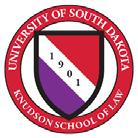















Given the nature of small sample sizes, faculty also approved different maximum averages in small classes. Classes with fifteen or fewer students have a maximum average of 88. Classes with fewer than five students (typically independent studies) have no maximum. The reality is that in smaller classes, a lower average can be unrealistic and somewhat unfair—particularly if highly motivated or exceptional students enroll.



Faculty also approved a variance process for truly exceptional circumstances. The dean may approve a variance from the not to exceed averages in upperlevel classes upon the demonstration of exceptional circumstances. While that term is not defined, in my opinion, it would likely require an enrollment of disproportionately high-achieving students or some truly exceptional performances across the board. Even with a variance, the average grade cannot exceed 90 or the cumulative grade average of the students enrolled in the class, whichever is higher.
I want to share some final thoughts on this process and its outcome. First, our grading policies are important, but it is also important that potential employers understand them. We are developing an information sheet that students can provide employers (particularly out-ofstate or irregular employers) to ensure they understand the system. I will continue to take opportunities to discuss these changes when I am speaking publicly
so there is a broad understanding and awareness of the changes. Please do not hesitate to reach out with any questions you have about the Law School grading system.
Finally, I must compliment the Law School faculty on their work through this process. This was a year-long conversation that involved both deep cultural questions about what we want to be as a law school and numbingly detailed questions about grade scales and policies. These discussions were vigorous, thoughtful, and energizing. Faculty cared about these topics and demonstrated that care through the discussions. But these discussions were consistently collegial and courteous without losing their rigor and vigor. Passionate debates can turn sour. That never happened because the Law School is truly exceptional and collegial. The entire process was a great reminder that this truly is a community of excellence, service, and leadership, and I am incredibly fortunate to be part of it.
DeanHoodingSpeech2023 Fulton’s Click Here 11




send a message to access.to.justice@sdbar.net 12
Please
13






Raven Industries, Inc. welcomes attorney Kiira M. Weber to the company and its mission of helping farmers feed the world. Raven Industries, Inc. 205 E. 6th Street Sioux Falls, SD 57105 Telephone: (605) 809-2923 Email: Kiira.Weber@ravenind.com The Law Firm of Bachand & Hruska, P.C. 206 W. Missouri Ave., Pierre, South Dakota (605) 224-0461 is pleased to announce that Kendra J. Mulder kmulder@pirlaw.com has joined the firm as an associate, effective May 22, 2023. 14
YOU ARE CORDIALLY INVITED TO ATTEND THE INVESTITURE CEREMONY of
LAURA L. KULM ASK
UNITED STATES BANKRUPTCY JUDGE FOR THE DISTRICT OF SOUTH DAKOTA
FRIDAY, JUNE 23, 2023
3:00 P.M.
U.S. COURTHOUSE 400 SOUTH PHILLIPS AVENUE, COURTROOM 1 SIOUX FALLS, SOUTH DAKOTA
RECEPTION IMMEDIATELY FOLLOWING
RESPOND BY JUNE 16, 2023, TO: rick_entwistle@sdb.uscourts.gov
Northern Plains Weather Services, LLC


Matthew J. Bunkers, Ph.D. | 605.390.7243

•Certified Consulting Meteorologist (CCM)
What does a CCM do? Check out: https://npweather.com/forms/CCM-article.pdf

•30+ years of weather/forecasting experience
•Consulting, reports, depositions, & testimony
•Specialties: forensic meteorology, weather & forecasting, radar, satellite, severe storms, hail, rainfall & flooding, fog, winter weather, heavy snow, icing, slips & falls, fire weather, high winds, lightning verification, applied climate & meteorology, and agriculture weather

https://npweather.com


as
nrnplnsweather@gmail.com 15
|
ZOOMLINK
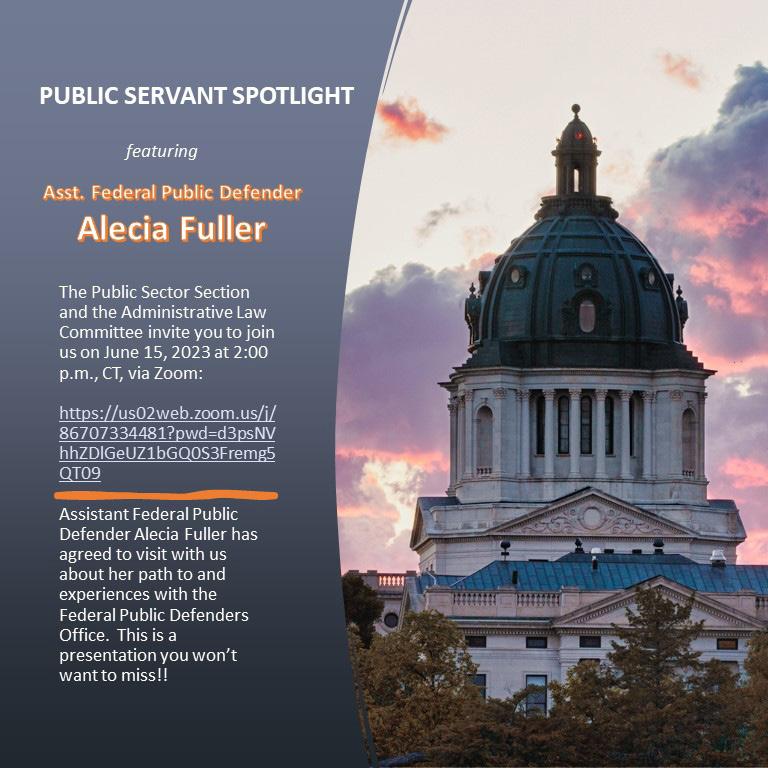
16

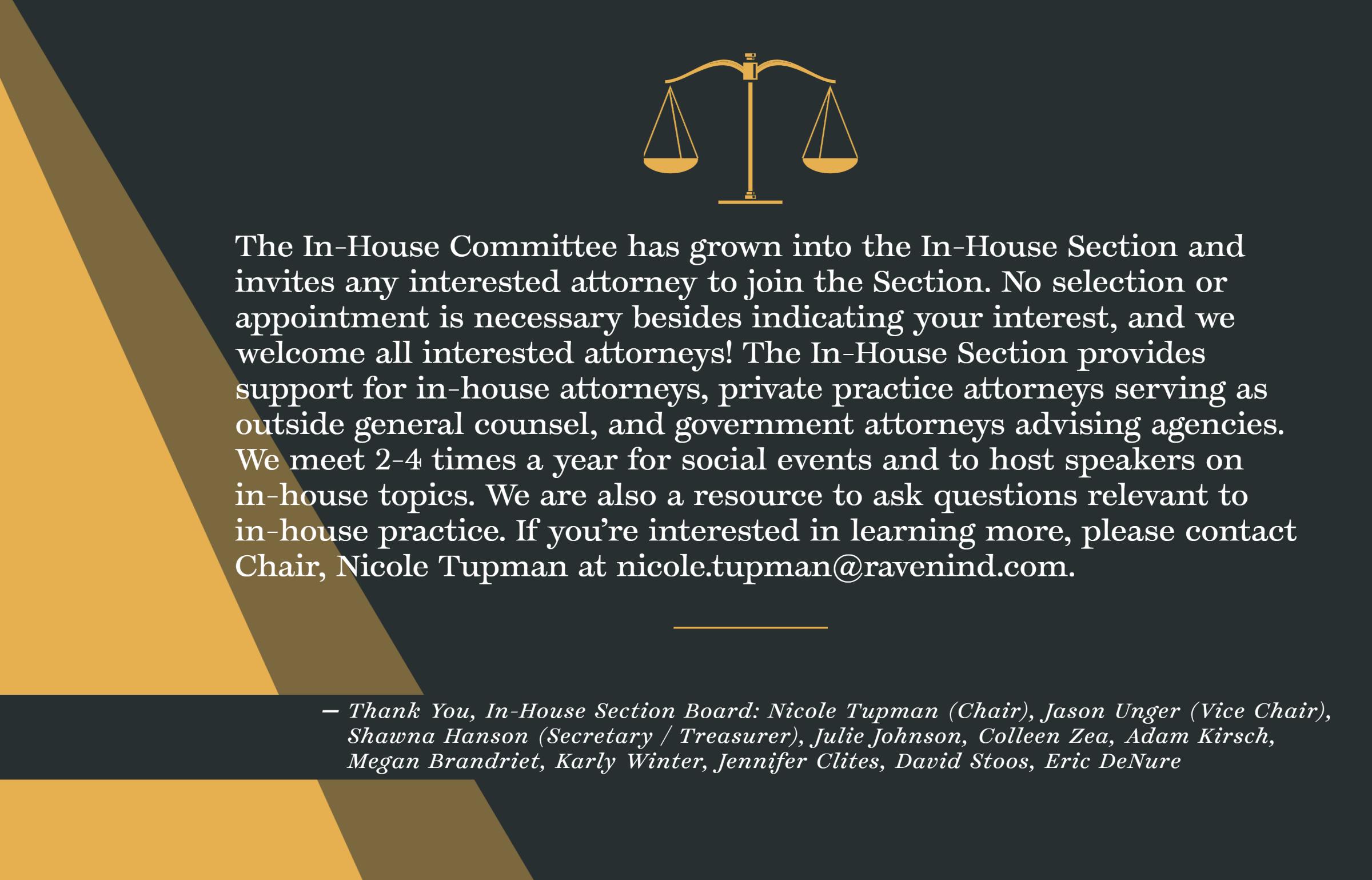
17
theState whohave the ourAnnual
issuing awards to those members of the fifty-year milestonesinceadmission the State of South Dakota, inaugurated1973, in2023. The ceremony has becomeone highlightsof
Bar to practicein Convention.
ThefollowingState receivetheaward

ArlieBrende
BarryS.Thompson
BethChapman
BonnieUlrich
DanielJackson
DeanDunsmore
DennisDuncan
DouglasDeibert
DrewJohnson
Fred Winkler
HarveyJewettIV
law is being
Black-TieAffair”Social to
eligible the Wednesday Bar members are eveningduring
JamesMcGreevy
JanWright
Hon.
JeffDavis
JohnLovald
JohnMaynes
LarryKyte
LylePetersen
MarioGonzalez
RichardMoe
RickYarnall
RobertBurns
RobertButterbrodt
RobertRiterJr.
RoryKing
Thomas
Duncan
ThomasMaher
Dean
N.NasserJr.
PeterMcGovern
RaymondDeGeest
reached continued in 18
WilliamDelaneyIII
WilliamFuller
a“Not
Thepracticeof of


19



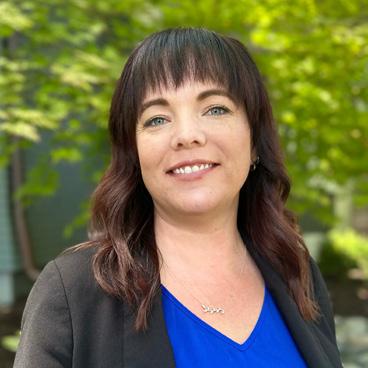

We are proud to announce the formation of Halbach | Szwarc. The newest full service law firm in South Dakota.
Emily Maurice partner
Alex halbach partner
Joshua Clark partner
Anna limoges partner
20
Stefan szwarc partner
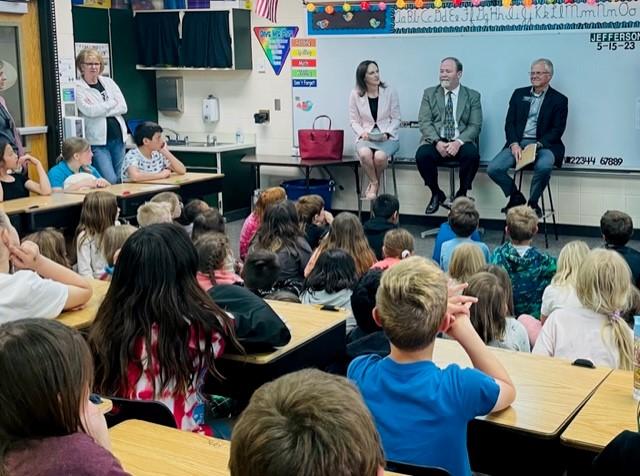

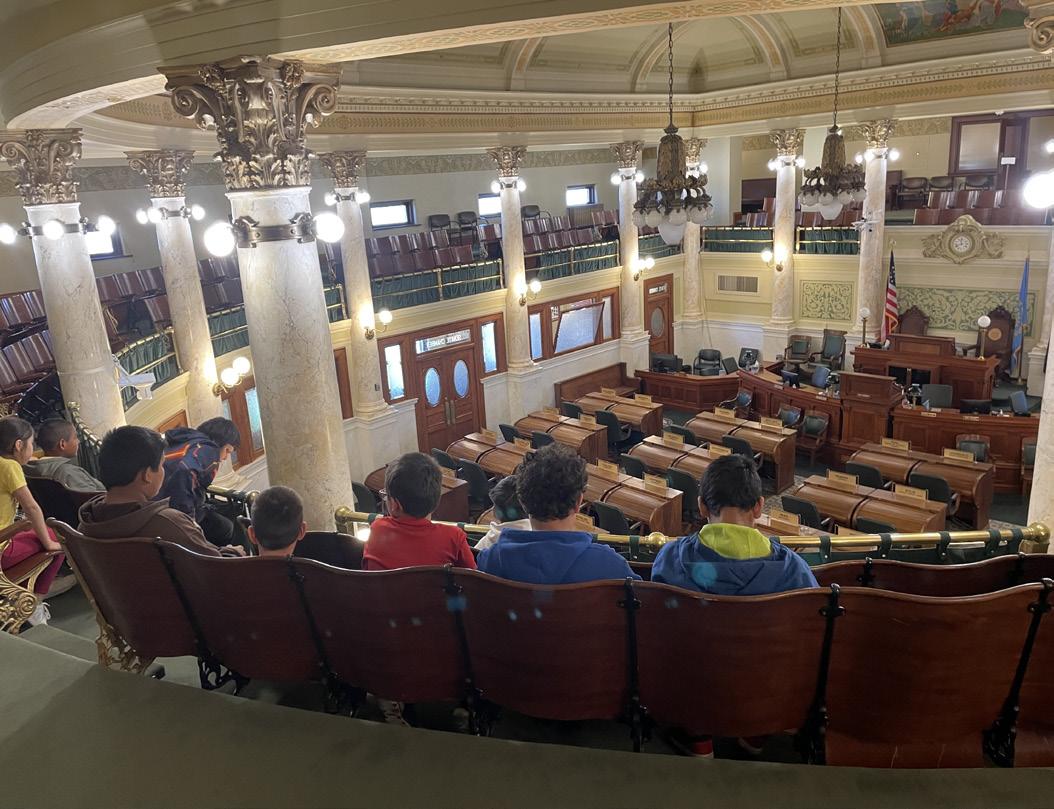



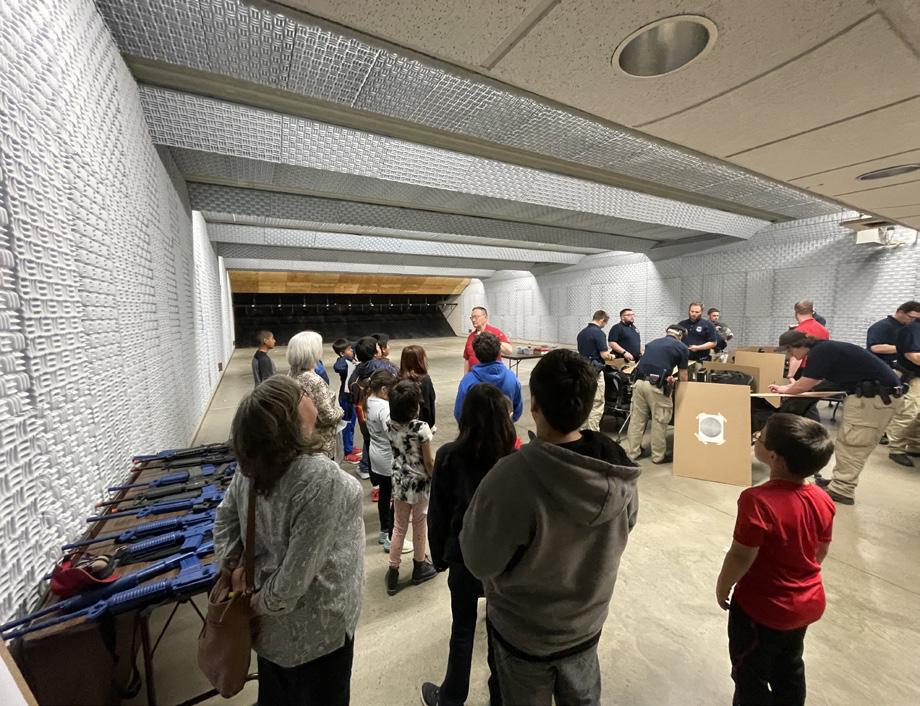

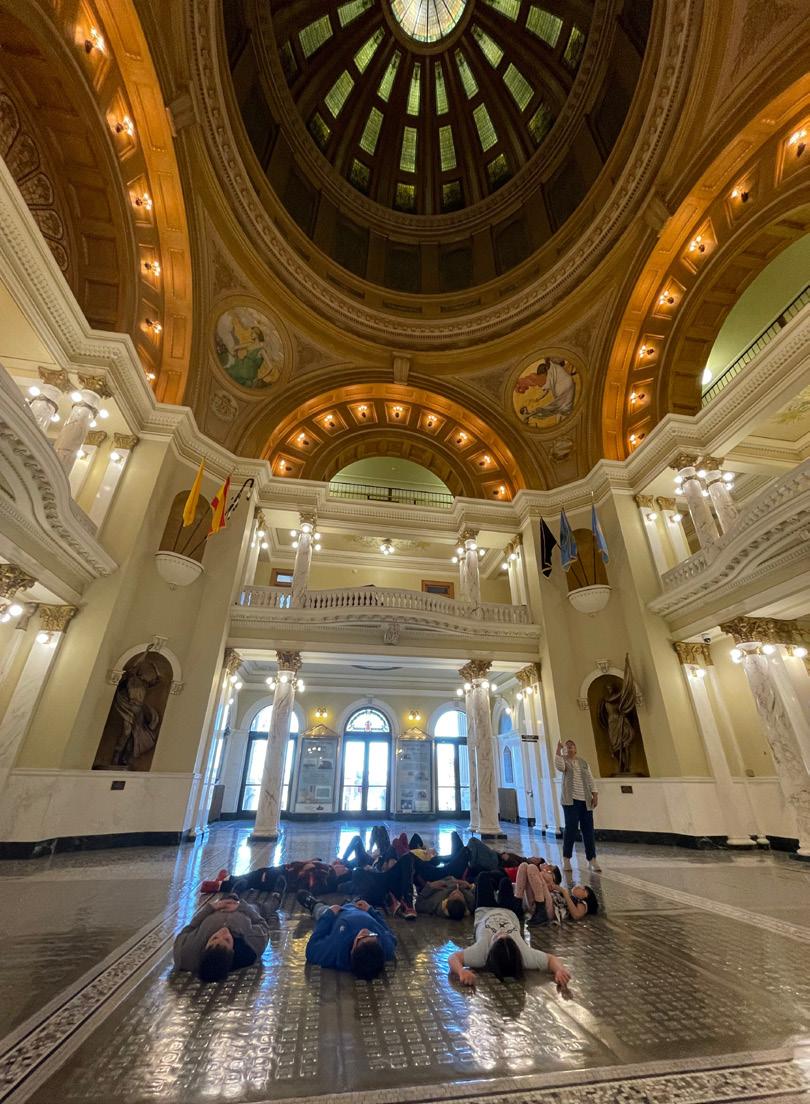



SpecialThanksto: for makingthis possible! Thanks for Participating KristenEdwards,Justice Myren,Mike Weisgram, Kylee Joe Thronson, JenniferUtter,Jenny Jorgenson, SarahThorne, ChiefJusticeJensen, AG Marty Kimberly Manthei, Zachrison, Jackley and JeffersonElementary, Pierre Crow CreekTribalSchool, Stephan SpearfishHighSchool, Spearfish Waubay HighSchool, Waubay NorrisElementarySchool, White River SanbornCentral, Forestburg 21





SAVE THE September29,2023 3:00PM CST CAPITOLROTUNDA SOUTH DAKOTA PIERRE, TheStateBarofSouthDakotaYoungLawyers Sectionrequeststhehonorofyourpresence atthe Swearing-InCeremonyfor thenewSouthDakotaattorneys. StateWide 22
JustinSmith
SarahLarson
DeliaDruley
BethRoesler
JosephHogue
RossWright
AndrewHurd
OlinClyne
AlexHagen
AndyFick
KristinDerenge
JoseyBlare
KalebPaulsen
LaneHaskell
LisaMarso
HenryEvans
Thankyou!
AnthonySutton
CareyMiller
JoseyBlare
KeithGauer
EricSchulte
MarkKrogstad
ThadTitze
SarahTheophilus
JoelRische
BrookeSchmidt
PamelaReiter
AlaynaHolmstrom
ScottCarlson
RichardL.Johnson
MatthewTysdal
TimBjorkman
CurtJensen
MattMcIntosh
NathanOviatt
MattLucklum
JessPekarski
GarrettKeegan
KeelyKleven
AaronEiseland
MarthaRossiter
SaraBaron
Houy

FrankDriscoll
TerryPachota
ConnorDonahue
MikeSteve
NateChicoine
ScottSumner
ArmanZeljkovic
EricSchlimgen
AlanSmoot
LauraHauser
JennAlbertson
AidenGoetzinger
LaraRoetzel
HollieSmith
OwenWiese
AlanSmoot
SteveDemik
TylerWettering
JennAlbertson
LisaCagle
23
BOARD OF BAR COMMISSIONERS
Minutes, April 27, 2023
Boyce Law Firm, Sioux Falls
President Lisa Marso called the meeting to order at 9:02 am Central Time on Thursday, April 27, 2023. Present were Marso, President Elect Heather Lammers Bogard, Commissioners Justin Bell, Nick Moser, Tyler Matson, Carrie Srstka, and Tim Dougherty. Present via Zoom were Commissioners John Richter, Erika Olson, Eric Pickar, and Rory King. Also, present at the meeting were Executive Director/SecretaryTreasurer Paul Cremer, Bar Member Julie Dvorak, Access to Justice, Inc. Coordinator Denise Langley, Strategic Plan Coordinator Elizabeth Overmoe, and Assistant Executive Director Nicole Ogan. Additional attendees for part of the meeting, via Zoom, were UJS State Court Administrator Greg Sattizahn, Business Law Committee Member Ryan Fargen, and CLIO representative Nefra-Ann MacDonald.
Minutes of March 15, 2023 Meeting: Commissioner Matson moved to approve the minutes of the March 15, 2023, meeting. President Elect Lammers Bogard seconded the motion. Motion passed.
Keller Policy: President Marso requested Bar staff to continue working on Keller Policy and legislative issues.
State Bar Purpose and Immunity Bill: The Commissioners discussed a draft bill regarding proposed legislation involving State Bar purposes and immunity. Commissioner Matson made a motion to present the draft bill to members at the Business Meeting on June 23, 2023. Commissioner Bell seconded the motion and the motion passed.
UJS/State Bar Discussion: UJS State Court Administrator, Greg Sattizahn, joined the meeting via Zoom and discussed matters including the proposed ombuds program to work on sexual harassment issues, the Rural Practice Program, Continuing Legal Education, the indigent legal defense task force, and the bar admission task force, statistics regarding the number of South Dakota Supreme Court cases, and oral arguments.
Title Standards Revisions: Commissioner Olson discussed proposed revisions to the Title Standards to be presented and voted on at the annual meeting in June. She reported that the committee working on the revisions was unanimous in making all changes. Commissioner Moser made a motion to approve the proposed revisions as presented and to move forward with the annual meeting proposal process. Commissioner Matson seconded the motion. Commissioner Olson abstained from voting and the motion passed.
Financial Report/Investment Request: Nicole Ogan presented the board with current Certificate of Deposit terms and rates. Commissioner Bell made a motion to give State Bar staff the discretion to invest up to $300,000 into a CD for up to twelve months at the best term/rate available. President Elect Lammers Bogard seconded the motion. Motion passed.
Commissioners Dougherty and Bell gave an update on the work being done to revise line items within the budget. A budget for next fiscal year will be presented at the May meeting. It was also reported that ELO hopes to have the draft audit and 990’s to the Bar in May.
President Elect Lammers Bogard made a motion to go into executive session to discuss salary matters. Commissioner Bell seconded the motion and staff/visitors exited the meeting.
The meeting reconvened at 11:15.
24
Business Law Committee Proposals: Ryan Fargen from the Business Law Committee presented proposed revisions involving LLC statutes. President Elect Lammers Bogard made a motion to allow the proposed revisions to be presented to members at the Business Meeting on June 23, 2023. Commissioner Bell seconded the motion. Motion passed.
2025 Annual Meeting: Ogan reported on the bids received for the 2025 convention in Rapid City. The board asked that staff obtain specific proposals from the entities.


CLIO: Nefra-Ann MacDonald from CLIO (a legal software product) joined the meeting via zoom to present to the group on a possible partnership.
Marketing the Bar: The Commissioners discussed a marketing proposal from Karen Korr of Full Korr Press. Staff was directed to ask some questions regarding the proposal and report back in May.
President’s Update: President Marso gave an update on her attendance at the Western States Bar Conference and passed along information to the board.








Commissioner Input and General Matters: ED Cremer and President Marso provided updates to the board regarding the Bar admission task force. Elizabeth Overmoe discussed input provided by members via a survey regarding civility and outreach efforts by the Bar.
Strategic Planning Retreat: Bar staff discussed the upcoming Strategic Planning meeting.
Adjourn: President Marso adjourned the meeting at 12:53 pm.
Health | Life | Disability | Dental Cancer/Critical Illness/Accident Vision | MedicareShort Term Medical The Professionals at Midwest Employee Benefits have been carefully selected because of their industry leading experience, and offer their clients industry leading knowledge and expertise. 877-833-5433 | www.midwestemployeebenefits.com 5000 S. MacArthur Lane, Suite 103 MacArthur Square, Sioux Falls EMPLOYER & INDIVIDUAL BENEFIT SOLUTIONS Customized Insurance Plans To Meet Your Every Need Our agency can help with the Bar Association Avera Healthplan that is now offered to members! 25
Fellow State Bar Members:
As you may for State Bar President-Electin may seem thecorner. hard to
recall, last January I announced my candidacy 2023. believe, It has been a long winter and it butthe 2023 annual meeting is justaround in
hopeit March.)
then Iditarod in
(I was picturethis when Willow,
For those of you who do not know me, Planning Committee, on the Disciplinary Board and as a member and chairperson of the CLE Committee. I am currently involved with a workgroup assisting the committee that is assessing the bar admissions
I graduated from USD School of Law in 2000 and have been at Siegel, Barnett & Schutz in Aberdeen since then. In the past, I have served as a Bar Commissioner, on the Strategic

is warmer inJune the taken at Alaska, process.

ServingasyourPresident Bar in2024-2025, 2023
inthe
and President-ElectHeatherLammers you Sarah SharpTheophilus,candidate ourhospitalityroom.
Ihope to see year,
Bogard would be anhonor. at the annual meeting and that you can joinme next for State BarPresident-Elect 26
Marsoand followingfootsteps of PresidentLisa in

27

Room Room THURSDAY| 6P-7P| RAMKOTAHOTELROOM 2023 | |SIOUXFALLS JUNE22, KOTA
Detailed information will be published in the May/June Newsletters and on the State Bar Website.
2023

CLE/Speaker Line Up
Detailed information willbe publishedinthe May/June Newsletters and on theState Bar Website.

Convention
2023 Convention
CLE/Speaker Line Up
29
the EnhancingCultureofthe LegalProfessionbyEmbracing
- 1 pm Elizabeth “Beth” Walker, Supreme Court of Appeals of West Virginia
Chief Justice -1pm Elizabeth“Beth”Walker, SupremeCourt WestVirginia
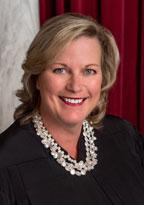
Promotingalegal lawyersand judgesthriveprofessionally avibrant the of ForceonLawyer been
andpersonally since topic of conversationever National Task
profession inwhich has reportthe
Well-Beingin2017. WestVirginia, civilityandpublicservice.
Chief Justice Walker will discuss with an emphasis onthe
thiswork in intersection of well-being,
2 pm -
and Working Together Panel Discussion: Thriving 2pmChris President Moderator:L. of for Well-BeingIn ALPS Institute andWorkingTogether Law, Newbold - President ofthe Executive Vice of Panelists: Chief Justice Supreme CourtAppeals of
Stephanne WV Judicial & Lawyer McKnight Mediations,and

Thornton
-Directorthe
MikeMcKnight - Greenfield Law
Elizabeth “Beth”Walker of WV, Clinical AssistanceProgram, Gregg -Greenfield
June21,2023
RamkotaHotel,SiouxFalls
toBroughtyouby LawyersAssistance , Lawyers Committee&SD Lawyers Concernedfor
30

32

POZNERON C:ROSS to Brought you CommitteeonContinuingLegalEducation theand by the State Bar of SouthDakota 33
 Justice Steven Jensen, on behalf of the South Dakota Unified Judicial System
Justice Steven Jensen, on behalf of the South Dakota Unified Judicial System
Cordially invite you to please Join them for the 2023 Bench & Bar Social Thursday, June 22, 2023 5:00 pm – 6:00 pm Ramkota Convention Center Room: to be Determined 3200 W. Maple St. Sioux Falls, SD 57107 Awards presented for: USD Women In Law Attorney of the Year LCDI Diversity and Inclusion 34
President, Lisa Marso, on behalf of the State Bar of South Dakota
for It’sokaytoaskhelp

35
Why Malpractice Policies Typically Don’t Cover Consulting Work? Understanding the Ancillary Services Coverage Concern
Market forces drive change and, at times, even bring about innovation. So, in response, when a lawyer or firm decides to adjust the business model in some fashion in order to stay relevant or drive growth, I see that as a good thing as long as all the ramifications of the change are thought through and responsibly addressed. Unfortunately, a misstep that we see is this. Lots of planning occurs and decisions are made prior to any kind of inquiry into the coverage piece. It happens more than you might guess. A lawyer will call in full of excitement as he or she fills us in on the new business model. Most of time the lawyer just wants confirmation that the change won’t negatively impact coverage. The hard part with these calls is when the situation is such that we have to temper the lawyer’s enthusiasm and say there’s a problem you seem to have overlooked.
Perhaps a few examples are in order. Ancillary services are often the issue. It might be a lawyer is planning on offering both legal and non-legal services under
the banner of his or her practice. Think regulatory compliance and consulting in the cybersecurity sector, employment law and consulting or investigation services in the employment law sector, or business formation and consulting in the business sector. It might be something like a lawyer and non-lawyer setting up several businesses and the plan is to offer legal services, investment advice, and insurance sales under the banner of a common trade name. It might be a lawyer planning to team up with a local CPA to offer legal and nonlegal services under one roof. Heck, the plan might be as simple as deciding to offer do it yourself legal forms from the law firm’s website. Suffice it to say the length of this list is only going to be limited by the creativity of lawyers and we can be a creative bunch.
What is it about ancillary services that creates a problem?
Here’s the rub. A lawyer’s professional liability policy

36
does not cover any and all liability that a lawyer may face. At the most basic level, a legal malpractice policy will only cover allegations of negligence in the performance of professional services that were provided to clients of the named insured, which is a law firm. The definition of the term “professional services” is typically a rather broad definition that not only covers the legal advice and services traditionally provided in an attorney-client relationship: but often also includes certain common ancillary services such as acting as a mediator, arbitrator, executor, conservator, guardian, trustee, and the list can go on, again, with this caveat. Coverage will be in play only for professional services performed in an attorneyclient relationship and that were performed for and on behalf of a client of the named insured. The important point here is to help you understand that ancillary services that are nonlegal in nature, such as consulting, are not going to be covered under a lawyer’s professional liability policy nor will any work done on behalf of someone who is not in an attorneyclient relationship with you.
If I want to move forward regardless, what are the options?
While perhaps a bit frustrating, the best answer I can give is this. It depends. The specifics of your plan will dictate. Take a lawyer consultant whose plan is to practice in the cybersecurity space. Because these two legal and nonlegal services so closely overlap, a few insurers may be willing to offer a general errors and omissions policy that would cover both professional roles. Understand however, most of the time if the plan is such that the nonlegal ancillary services are going to be closely tied to the legal services your firm offers, your legal malpractice insurance company may no longer be willing to insure your law practice unless
changes are made.
Since you should have coverage for both your law practice and your ancillary business, anything you do to help underscore the presence of a separate and distinct delivery model for the legal and nonlegal services you wish to offer will make it easier to properly insure both risks by way of separate policies. This might mean the creation of two or more business entities would be called for, might require clear documentation that no legal advice will be included with any ancillary service, might necessitate the creation of two discrete websites, and in certain situations might even call for separate locations and staff. There really is no one size fits all answer here. Again, the specifics of your plan will matter; but if you focus on creating consumer clarity with the service delivery models such that all will know when they are and when they are not going to receive legal advice, the end result should be easier to appropriately insure.
Authored by: Mark Bassingthwaighte, ALPS Risk Manager

Since 1998, Mark Bassingthwaighte, Esq. has been a Risk Manager with ALPS, an attorney’s professional liability insurance carrier. In his tenure with the company, Mr. Bassingthwaighte has conducted over 1200 law firm risk management assessment visits, presented over 400 continuing legal education seminars throughout the United States, and written extensively on risk management, ethics, and technology. Mr. Bassingthwaighte is a member of the State Bar of Montana as well as the American Bar Association where he currently sits on the ABA Center for Professional Responsibility’s Conference Planning Committee. He received his J.D. from Drake University Law School.

37
MassRedAnnual Mass AnnualRed
becelebrating the Cathedral
Joseph.
invokes
at BishopDeGroodwill The God’sguidance
andblessingonjustices,judges, andgovernmentofficials.
Wednesday,June,21st,2023
12o'clockpm 521NDuluth Ave, SiouxFalls joinus June21st for a socialinRoom200 at the Crooked Pint Ale House
Additionally,please Wednesday, a 2020WestRussellStreet, SiouxFlls
Both eventssponsored by the
St. Thomas
More Society of SouthDakota
RedMass Theannualmass ofSt. attorneys, 38



39
You Asked, We Answered.
State Bar of South Dakota Association Healthcare Plan Now Available
As part of our ongoing commitment to our members, the State Bar of South Dakota has partnered with Avera Health Plans to provide affordable healthcare benefits to South Dakota Bar members and their employees. In 2019, State Bar leadership advocated for an Association Group Healthcare Plan and our members noted in a 2022 survey that a healthcare option would be a worthwhile member benefit. At its May 2022 meeting, the Bar Commission passed a motion to proceed with implementation of an Association Healthcare Plan and we are pleased to announce its availability beginning February 1, 2023.
The following agents or agencies that are authorized to sell the State Bar Association Health Plan in Eastern South Dakota.
Black Hills Insurance Agency & Carver Insurance will handle Western South Dakota.
Questions on Eligibility, Rates, and Services?
Please contact the agency listed above based on your office location within the state for questions related to the Association Healthcare Plan.
Office Location Agency Contact Mitchell & Yankton Area Dice Financial Jacquelyn Johnson Aberdeen Area Mark Mehlhoff Mark Mehlhoff Sioux Falls Area Midwest Employee Benefits Dawn Knutson
McGreevy & Associates John Lawler
Josh Gilkerson
Todd Freimark
Sioux Falls & Brookings Area
Pierre, Mitchell & Sioux Falls Area Fisher Rounds & Associates,
Watertown Area: Freimark & Associates
Office
Contact West River Black Hills Insurance Agency & Carver Insurance Dan Maguire, Everett Strong & Lisa Knutson
Location Agency
40
Court Improvement Program Training
TRAUMA-INFORMED COURT SYSTEM
The Center for the Prevention of Child Maltreatment and the South Dakota Unified Judicial System are hosting monthly trainings on best practices and unique approaches to working with children and families for attorneys, judges, and other multidisciplinary professionals.
These trainings are supported by the UJS Court Improvement Program which assesses and improves handling of court proceedings related to child abuse and neglect in South Dakota.
LEARNING MORE CAN KEEP KIDS SAFE
Trainings are held the last Wednesday of the month, with some variation based on holidays and other events, from 12-1 CST via Zoom.
UPCOMING TRAININGS
Wed Feb 22: Independent Living & Young Voices
Wed March 29: Situational Awareness
Wed Apr 26: Civil vs Criminal Child Abuse & Neglect Cases training in conjunction with the State Bar
Wed May 31: Appellate Review of Child Sex Crimes
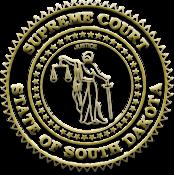
Wed June 28: 2023 Legislative Update

For more information or to suggest future training topics, email cpcm@usd.edu or visit www.sdcpcm.com/ciptraining

Unified Judicial System
500 East Capitol Avenue
Pierre, SD 57501-5070
Indigent Legal Services Task Force to Host Listening Sessions to Gather Public Input
For Immediate Release
Contact: Greg Sattizahn 773-3474
Pierre
The Indigent Legal Services Task Force created by HB 1064 during the 2023 Legislative session will be holding several listening sessions across the state to gather information to inform its work.
The goal of this Task Force as stated in the legislation is to:
1. Identify how legal services are delivered in South Dakota to indigent parties in criminal, juvenil e and child abuse and neglect proceedings statewide;
2. Recommend ways to improve the delivery of legal services to indigent parties;
3. Recommend methods to provide services for confli ct cases where local public defenders may be unable to take cases;
4. Address how to ensure competent representation is provided to indigent parties; and
5. Identify potential funding options to ensure delivery of legal services for indigent parties.
The listening sessions are scheduled as follows:
42
Indigent Legal Services Task Force
Listening Sessions
The Unified Judicial System will be hosting public listening sessions across the State to discuss the provision of legal services to indigent parties.
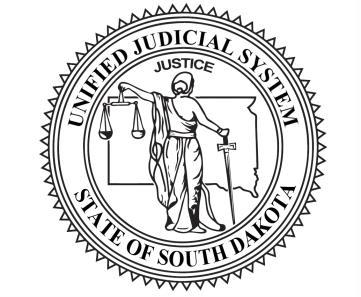
The goal of the Indigent Legal Services Task Force is to study and make recommendations on how South Dakota provides, funds and ensures competent representation for indigent criminal defendants, parties in abuse and neglect cases and juvenile proceedings.
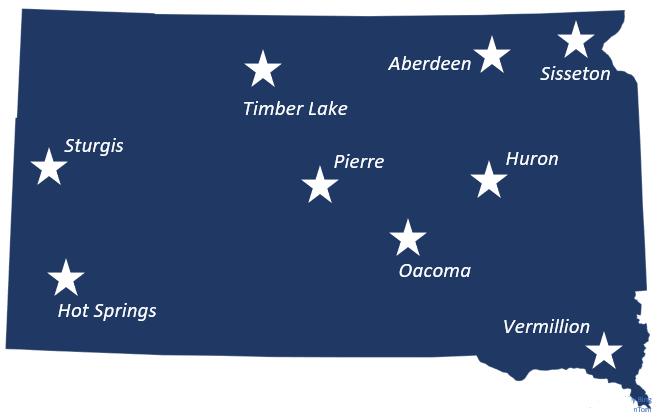
SCHEDULED SESSIONS
Huron Crossroads Hotel and Event Center
Virtual Meeting: https://us06web.zoom.us/j/8 9232563204?pwd=bG9PM1
VHbWZoTWlCWERoOEJS
Nk54QT09
12
June 13 3pm- 5pm
For further information contact Greg Sattizahn via email at greg.sattizahn@ujs.state.sd.us or 605-773-8458.
May
10am-Noon Roberts
May 17 2pm-4pm Hot
May 19 10am-Noon
Sturgis May 22 10am-Noon
May
10am-Noon
May
10am-Noon
June
10am-Noon
June
10am-noon
Location: Date: Brown County Courthouse Community Room, Aberdeen
17
County Courthouse, Sisseton
Springs Civic Center
Meade County Courthouse,
Oacoma, Cedar Shores
24
Dewey County Courthouse, Timber Lake
31
Pierre, Capitol Lake Visitor Center
1
USD Knudson School of Law, Vermillion
6
June
10am-Noon
43
State Bar of South Dakota Committee Assignments 2023-2024
ADMINISTRATIVE LAW
Mallori Barnett, Pierre
Justin Bell, Pierre
Steven Blair, Rapid City
Meghan Borchert, Sioux Falls
Niclas Dahlvang, Wessington Springs
Kristen Edwards, Pierre
Morgan Erickson, Sioux Falls
Holly Farris, Pierre
Andy Fergel, Bismarck, ND
Anita Fuoss, Pierre
Julie Johnson, Mina
Kody Kyriss, Pierre
Ryan Loker, Pierre
Frank Marnell, Pierre
Amber Mulder, Sioux Falls
Graham Oey, Brookings
Nick Ramos, Sioux Falls
John Richter, CH, Pierre
Caroline Srstka, Sioux Falls
Sarah Thorne, Pierre
Catherine Williamson, Pierre
AGRICULTURAL LAW
Stan Anker, Rapid City
Elliot Bloom, Rapid City
James Cremer, Aberdeen
Brian Donahoe, Minneapolis, MN
Kristen Edwards, Pierre
Craig Evenson, Clear Lake
Amanda Gaikowski, Sioux Falls
Thomas Geu, Vermillion
Quincy Kjerstad, Rapid City
David Larson, Chamberlain
Kiera Leddy, Aberdeen
Robert Nelson, Sioux Falls
Mitchell Peterson, Sioux Falls
Kelsea Sutton, CH, Burke
Jacob Tiede, Pipestone, MN
Michael Traxinger, Aberdeen
Paul Tschetter, Sioux Falls
Danny Smeins, Britton
Nolan Welker, Pierre
ALTERNATIVE DISPUTE RESOLUTION

Bert Bucher, Sioux Falls
Gregory Erlandson, Rapid City
Hon. David Gienapp, Madison
Chet Groseclose, Sioux Falls
Lindsay Harris, Sioux Falls
Katie Johnson, Beresford
Meghann Joyce, Co-CH, Sioux Falls
Garrett Keegan, Rapid City
Michael McKnight, Co-CH, Sioux Falls
Elizabeth Rosenbaum, Sioux City, IA
Laura Rowe, Onida
Heidi Thoennes, Sioux Falls
Marilyn Trefz, Vermillion
Linda Lea Viken, Rapid City
Joe Williams, Hill City
ASK A LAWYER
Reece Almond, CH, Sioux Falls
Chris Christianson, CH, Rapid City
Mike Srstka, Vice-CH, Sioux Falls
Kellen Willert, Vice-CH, Belle Fourche
BUSINESS LAW
Amy Arndt, CH, Sioux Falls
Frances Becker, Rapid City
Josh Brown, Sioux Falls
Joshua Clark, Sioux Falls
James Cremer, Aberdeen
Thomas Deadrick, Pierre
Justin DiBona, Rapid City
Connor Donahoe, Rapid City
Ryan Fargen, Sioux Falls
Tom Geu, Vermillion
Daniel Glinert, Sioux Falls
Patrick Goetzinger, Rapid City
Chad Hansen, Dell Rapids
Dixie Hieb, Sioux Falls
Laura Hodson, Rapid City
Pradeep Jayaraman, Sioux Falls
Curtis Jensen, Rapid City
Darrell Jesse, Yankton
Tommy Johnson, Sioux Falls
Brian Kirby, Sioux Falls
Andrew Knutson, Sioux Falls
Carey Miller, Sioux Falls
Heath Oberloh, Sioux Falls
Barry Sackett, Sioux Falls
Timothy Thomas, Rapid City
Bobbi Thury, Sioux Falls
Rod Tobin, Aberdeen
Shane Vogt, Sioux Falls
Jayna Voss, Sioux Falls
Reece Weber, Rapid City
CLIENT ASSISTANCE FUND
Pat Archer, CH, Onida
Beth Baloun, Sioux Falls
Amy Bartling-Jacobsen, Gregory
Matthew Naasz, Rapid City
Nancy Oviatt, Watertown
CONTINUING LEGAL EDUCATION
Hon. Tara Adamski, Pierre
Stanton Anker, Rapid City
Carla Cushman, Rapid City
Holly Farris, Pierre
Alecia Fuller, Rapid City
Anita Fuoss, Pierre
Neil Fulton, Vermillion
Renee Gallagher, Rapid City
Eric Hanson, Sioux Falls
Meghann Joyce, Sioux Falls
Tom Keller, Sioux Falls
Jessica LaMie, Pierre
Jessica Larson, CH, Rapid City
Tamara Nash, Vermillion
Melissa Neville, Aberdeen
Hon. Bob Pesall, Flandreau
Mitch Peterson, Sioux Falls
Hon. Craig Pfeifle, Rapid City
Victoria Reker, Sioux Falls
Matthew Roby, Watertown
Jason Sutton, Sioux Falls
Jeff Tronvold, Pierre
Nicole Tupman, Sioux Falls
Anthony Sutton, Sioux Falls
Lora Waeckerle, Rapid City
Jennifer Williams, Rapid City
CRIMINAL LAW
Jason Adams, Sioux Falls
Ross Aldentaler, Aberdeen
Kylie Beck, Sioux Falls
Kelsey Blair, Rapid City
Gregory Brazeal, Vermillion
1
44
CRIMINAL LAW continued…
Leslie Bryson, Sturgis
Melissa Fiksdal, Sioux Falls
Koln Fink, Sioux Falls
Grant Flynn, Pierre
Ellery Grey, Rapid City
John Hinrichs, Sioux Falls
Tanner Jackson, Sturgis
George Johnson, Gregory
Amanda Kippley, Sioux Falls
Dylan Kirchmeier, Sisseton
Ryan Kolbeck, Sioux Falls
Katie Mallery, Sioux Falls
Cassandra McKeown, Vermillion
Amanda Miiller, Pierre
Robert Pasqualucci, Rapid City
Whit Reed, Sioux Falls
Amber Richey, Deadwood
Lara Roetzel, Rapid City
Jason Rumpca, Pierre
Olivia Siglin, Rapid City
Traci Smith, Sioux Falls
Sarah L. Thorne, CH, Pierre
DEBTOR-CREDITOR
Stan Anker, Rapid City
Thomas Ashby, Omaha, NE
Ellie Bailey, Pierre
Jim Cremer, Aberdeen
Patrick Dougherty, Sioux Falls
Keith Gauer, Sioux Falls
Bob Hayes, Sioux Falls
Anthony Hohn, Sioux Falls
Steve Huff, Yankton
Ryan Loker, Pierre
Robert Meadors, Sioux Falls
Sander Morehead, Sioux Falls
Nicholas Moser, CH, Yankton
Robert Nelson, Sioux Falls
Lee Ann Pierce, Brookings
John Richter, Pierre
Eric Ronke, Sioux Falls
Kristina Schaefer, Sioux Falls
Torrey Sundall, Sioux Falls
Brian Utzman, Rapid City
Anne Weyer, Sioux Falls
DIVERSITY AND INCLUSION
Timothy Billion, Sioux Falls
Kristin Derenge, Sioux Falls
Angelique EagleWoman, Woodbury MN
Hon. Francy Foral, Sturgis
Neil Fulton, Vermillion
Renee Gallagher, Rapid City
Tyler Haigh, Sioux Falls
Wendy Hess, Vermillion
Cesar Juarez, Sioux Falls
Denise Langley, Pierre
James Leach, Rapid City
Jonathon Leddige, Sioux Falls
Tamara Nash, CH, Vermillion
Erika Olson, Rapid City
Mae Pochop, Sioux Falls
Stephanie Pochop, Gregory
Alison Ramsdell, Sioux Falls
Danielle Rang, Yankton
Lara Roetzel, Rapid City
Marie Ruettgers, Rapid City
Eric Schulte, Sioux Falls
Thomas Simmons, Vermillion
Michael Traxinger, Aberdeen
Amanda Work, Pierre
EDUCATION LAW
Brett Arenz, Co-CH, Sioux Falls
Michele Bennett, Huron
Tyler Coverdale, Sioux Falls
Holly Farris, Pierre
Jessica Filler, Pierre
Jennifer Frank, Rapid City
AJ Franken, Vermillion
Tracy Greene, Co-CH, Brookings
Gerald Kaufmann, Pierre
Samuel Kerr, Rapid City
Amanda LaCroix, Pierre
Nathan Lukkes, Pierre
Lisa Marso, Sioux Falls
Paul Sedlacek, Rapid City
Catherine Seely, Pierre
Kassie Shiffermiller, Rapid City
Michael Trump, Rapid City
Sheila Woodward, Yankton
ELDER LAW
Cameo Anders, Sioux Falls
Brandon Booth, Sioux Falls
Erika Campbell, Northfield, MN
Greg Eiesland, Rapid City
Cale Fierro, Rapid City
Lonald Gellhaus, Aberdeen
Lindsay Harris, Sioux Falls
John Heisler, Sioux Falls
Laura Hodson, Rapid City
Hon. Janine Kern, Rapid City
McLean Kerver, CH, Rapid City
Brian Kirby, Sioux Falls
Gregory Litton, Rapid City
Lisa Maguire, Sioux Falls
Kate Bartell Nowak, Sioux Falls
Nancy Oviatt, Watertown
Greg Peterson, Aberdeen
Ali Schaefbauer, Rapid City
Mallory Schulte, Yankton
Michael Sharp, Emery
Thomas Simmons, Vermillion
Douglas Thesenvitz, S ioux Falls
Bobbi Thury, Sioux Falls
Jennifer Tomac, Rapid City
Jerad Toman, Rapid City
Stephen Wesolick, Rapid City
Rebecca Wilson, Sioux Falls
ETHICS
Cameo Anders, Sioux Falls
James Billion, Sioux Falls
Jeffrey Bratkiewicz, Sioux Falls
Jennifer Bunkers, Sioux Falls
Tracey Dollison Decker, Rapid City
Kimberly Dorsett, Aberdeen
Dan Fritz, Sioux Falls
Alecia Fuller, Rapid City
Eric Kelderman, Rapid City
Yvette LaFrentz, Sioux Falls
Christopher Madsen, Sioux Falls
Donald McCarty, Brookings
Sander Morehead, CH, Sioux Falls
Kimberly Pehrson, Rapid City
Mike Schaffer, Sioux Falls
Thomas Simmons, Vermillion
Ryan Snell, Sioux Falls
Cassidy Stalley, Rapid City
Owen Wiese, Rapid City
EVIDENCE
Kylie Beck, Sioux Falls
Hon. Natalie Damgaard, Canton
Aidan Goetzinger, Rapid City
Bradley Gordon, Rapid City
Chris Hutton, Philadelphia, PA
Garrett Keegan, Rapid City
Barbara Lewis, Rapid City
Matthew Murphy, CH, Sioux Falls
Eric Preheim, Sioux Falls
Lindsey Quasney, Sioux Falls
Laura Rose, Vermillion
Martha Rossiter, Rapid City
2
45
EVIDENCE continued…
Hon. Janki Sharma, Rapid City
Michael Snyder, Sioux Falls
Gary Thimsen, Sioux Falls
Karly Winter, Pierre
FAMILY LAW
Beth Baloun, Sioux Falls
Mary Burd, Sioux Falls
Jennifer Goldammer, Brookings
Hannah Haksgaard, Vermillion
Thomas Keller, Sioux Falls
Kristen Kochekian, Redfield
Kyle Krause, Rapid City
Denise Langley, Pierre
Chris McClure, Sioux Falls
George Nelson, Rapid City
Melissa Neville, Aberdeen
Melissa Nicholson Breit, Sioux Falls
Kari Nordstrom, Rapid City
Whitney Reed, Sioux Falls
Kylie Riggins, Rapid City
Beth Roesler, Sioux Falls
Elizabeth Rosenbaum, Sioux City, IA
Michael Tobin, Sioux Falls
Marilyn Trefz, Vermillion
Linda Lea Viken, Rapid City
Mindy Werder, Sioux Falls
Dava Wermers, Mitchell
Christi Weideman, Aberdeen
Kellen Willert, Belle Fourche
Terri Williams, CH, Rapid City
Joshua Zellmer, Sioux Falls
IMMIGRATION LAW
Amanda Bahena, Sioux Falls
Jonathon Chapman, Sioux Falls
Ilisja Duffy, Rapid City
Casey Eekhoff, Co-CH, Sioux Falls
Henry Evans, Sioux Falls
Janice Godtland, Sioux Falls
Sandi Haeuszer, Sioux Falls
Anna Kerner Andersson, Burke
Kari Scofield, Co-CH, Sioux Falls
Pradeep Jayaraman, Sioux Falls
INDIAN LAW
Kirk Albertson, Pierre
Margaret Bad Warrior, Dupree
Tim Billion, Co-CH, Sioux Falls
Josey Blare, Co-CH, Sioux Falls
Leonika Charging-Davison, Omaha
Kyle Chase, Washington D.C.
Angelique EagleWoman, Woodbury, MN
Shaun Eastman, Eden
Hon. Robert Gusinsky, Rapid City
Dana Hanna, Rapid City
Stacy Hegge, Pierre
Alayna Holmstrom, Sioux Falls
Brendan Johnson, Sioux Falls
Garrett Keegan, Rapid City
Lorrie Miner, Lower Brule
Tom Mortland, Mission
Lacy Neuenfeldt, Flandreau
Seth Pearman, Flandreau
Frank Pommersheim, Vermillion
Alison Ramsdell, Sioux Falls
Laura Rowe, Pierre
Thomas Simmons, Vermillion
Anthony Sutton, Sioux Falls
Ann Tweedy, Vermillion
Ron Volesky, Huron
JUDICIAL BAR LIAISON
Robert Anderson, Pierre
Renee Christensen, Sioux Falls
Joel Engel, Sioux Fall s
Greg Eiesland, Rapid City
Thomas Frankman, CH, Sioux Falls
William Garry, Sioux Falls
Anthony Hohn, Sioux Falls
Gary Jensen, Rapid City
Hon. Steven Jensen, Vermillion
Stacy Johnson, Aberdeen
Hon. Janine Kern, Rapid City
Hon. Carmen Means, Watertown
Ann Mines-Bailey, Pierre
Thomas Nicholson, Sioux Falls
Stephanie Pochop, Gregory
Hon. James Power, Sioux Falls
Greg Sattizahn, Pierre
Hon. Patrick Smith, Mitchell
Hon. Robert Spears, Watertown
Marya Tellinghuisen, Rapid City
Roy Wise, Aberdeen
Joshua Zellmer, Sioux Falls
Ex-Officio:
Kelsey Blair, YLS President
LABOR & EMPLOYMENT LAW
Mallori Barnett, Pierre
Lisa Cagle, Rapid City
Catherine Cano, Omaha, NE
Carla Cushman, Rapid City
Kimberly Dorsett, Aberdeen
Jennifer Frank, CH, Rapid City
Sarah Baron Houy, Sioux Falls
Lisa Marso, Sioux Falls
Gerald McCabe, Claremont
Nichole Mohning, Sioux Falls
Amber Mulder, Sioux Falls
Tracye Sherril, Sioux Falls
LAW SCHOOL
Beth Baloun, Sioux Falls
Hon. Douglas Barnett, Sioux Falls
Thomas Frieberg, Beresford
Robert Hayes, Sioux Falls
Hon. Douglas Hoffman, Sioux Falls
Hon. Steven Jensen, Vermillion
Anna Limoges, Sioux Falls
Hon. Marshall Lovrien, Aberdeen
Bob Morris, Belle Fourche
Tamara Nash, Vermillion
Hon. Margo Northrup, Pierre
Hon. Crai g Pfeifle, Rapid City
Dan Rafferty, Yankton
Reed Rasmussen, Aberdeen
Pamela Reiter, Sioux Falls
Hon. Susan Sabers, Sioux Falls
Clint Sargent, Sioux Falls
Greg Sattizahn, Pierre
Eric Schulte, Sioux Falls
Sarah Theophilus, Sioux Falls
Paul Tschetter, CH, Sioux Falls
LAWYERS ASSISTANCE
Thomas Clayton, Sioux Falls
Ryan Darling, Pierre
Henry Evans, Sioux Falls
Dan Fritz, Sioux Falls
Gregg Greenfield, Sioux Falls
Nicole Griese, Sioux Falls
Scott Hoy, Sioux Falls
Cesar Juarez, Sioux Falls
Lon Kouri, Sioux Falls
Renae Kruse, Sioux Falls
Robert Lewis, Rapid City
Michael McKnight, Sioux Falls
Stephanie Pochop, Gregory
Rebecca Porter, Rapid City
Vincent Purtell, Sioux Falls
Michelle Randall, Sioux Falls
Matthew Roby, CH, Watertown
Barry Sackett, Sioux Falls
Mrg Simon, Sioux Falls
3
46
LEGAL SERVICES
Kimberly Dorsett, Aberdeen
William Garry, Sioux Falls
Sarah Baron Houy, CH, Rapid City
Steven Huff, Yankton
Taneeza Islam, Sioux Falls
Denise Langley, Pierre
Cassandra McKeown, Vermillion
Annemarie Michaels, Rosebud
Tom Mortland, Mission
Reed Rasmussen, Aberdeen
Robert Riter, Pierre
Jeff Shultz, Sioux Falls
Marilyn Trefz, Vermillion
Lea Wroblewski, Sioux Falls
NATURAL RESOURCES & ENVIRONMENTAL LAW
Deb Birgen, Sioux Falls
Steven Blair, Rapid City
Elliott Bloom, Rapid City
Cheryl Bogue, Sioux Falls
Brian Donahoe, Sioux Falls
Jennifer Doubledee, Sioux Falls
Kristen Edwards, Pierre
Bruce Ellison, Rapid City
Dwight Gubbrud, CH, Belle Fourche
Jason Harris, Sioux Falls
Brett Koenecke, Pierre
Jessica Larson, Rapid City
Matthew Naasz, Rapid City
Wade Nyberg, Rapid City
Jess Pekarski, Rapid City
William Taylor, Sioux Falls
Richard Williams, Rapid City
Kellen Willert, Belle Fourche
Tracy Ann Zephier, Eagle Butte
NEGLIGENCE AND TORT LAW
Douglas Abraham, Pierre
Michael Bornitz, Sioux Falls
Renee Christensen, Sioux Falls
Eric DeNure, Sioux Falls
Zach Flood, Mitchell
Elizabeth Hertz, CH, Sioux Falls
John Hinrichs, Sioux Falls
Kathy Hoskins, Sioux Falls
Kim Lanham, Sioux Falls
Keely Leven, Rapid City
Jolene Nasser, Sioux Falls
Roger Sudbeck, Sioux Falls
Heidi Thoennes, Sioux Falls
Bram Weidenaar, Sioux Falls
Mark Welter, Sioux Falls
Jennifer Wosje, Sioux Falls
PATTERN JURY INSTRUCTIONSCIVIL
Hon. John Bastian, Belle Fourche
Gregory Bernard, Rapid City
Michael Bornitz, Sioux Falls
John Burke, Rapid City
Brian Donahoe, Sioux Falls
Delia Druley, Sioux Falls
Joe Erickson, Watertown
Aidan Goetzinger, Rapid City
David Hieb, Sioux Falls
Hon. Douglas Hoffman, Sioux Falls
John Hughes, Sioux Falls
Jeffrey Hurd, Rapid City
Andrew Hurd, Sioux Falls
Anna Limoges, Co-CH, Sioux Falls
Ann Mines-Bailey, Pierre
Steven Morgans, Sioux Falls
George Nelson, Rapid City
Sara Show, Co-CH, Sioux Falls
Hon. Richard Sommers, Aberdeen
Philip Stiles, Rapid City
Nancy Turbak Berry, Watertown
Shane Vogt, Sioux Falls
Lora Waeckerle, Rapid City
Alex Weiss, Rapid City
PATTERN JURY INSTRUCTIONSCRIMINAL
Jason Adams, Sioux Falls
Hon. Tara Adamski
Kirk Albertson, Pierre
Kyle Beauchamp, Rapid City
Kylie Beck, Sioux Falls
Hon. Tami Bern, Yankton
Amanda Eden, Canton
Koln Fink, Sioux Fall
Erin Handke, Pierre
Stacy Hegge, Pierre
Mark Hodges, Sioux Falls
Seth Klentz, Beresford
Jennifer Mammenga, Co-CH, Sioux Falls
Cullen McNeece, Pierre
Alexa Moeller, Rapid City
Hon. Sarah Morrison, Rapid City
Lindsey Quasney, Sioux Falls
Lindsey Riter-Rapp, Pierre
Jason Rumpca, Pierre
Heather Sazama, Rapid City
Hon. Janki Sharma, Rapid City
Olivia Siglin, Rapid City
Hon. Richard Sommers, Aberdeen
Carrie Srtska, Sioux Falls
Chelsea Wenzel, Co-CH, Pierre
Eric Whitcher, Rapid City
PRACTICE RULES REVISION
John Burke, CH, Rapid City
Ed Carpenter, Rapid City
Jeff Collins, Rapid City
Delia Druley, Sioux Falls
Aaron Eiesland, Rapid City
Gregory Erlandson, Rapid City
Shannon Falon, Sioux Falls
Gregory Grajczyk, Milbank
Hon. Sandra Hanson, Sioux Falls
Jeffrey Hurd, Rapid City
Ann Mines-Bailey, Pierre
Sander Morehead, Sioux Falls
Jay Schultz, Rapid City
Hon. John Sogn, Sioux Falls
Jason Sutton, Siou x Falls
Gary Thimsen, Sioux Falls
Colleen Zea, Sioux Falls
Ex-Officio:
Shirley Jameson-Fergel, Pierre
PROJECT RURAL PRACTICE
Ashley Anson, White Lake
Amy Bartling, Gregory
Ryan Cwach, Bloomfield, NE
Kristian Ellendorf, Howard
Jennifer English, Salem
Dennis Evenson, Clear Lake
Thomas Frieberg, Beresford
Hon. David Gilbertson, Pierre
Dusty Ginsbach, Buffalo
Patrick Goetzinger, Co-CH, Rapid City
Hannah Haksgaard, Vermillion
Austin Hoffman, Eureka
William Hustead, Hot Springs
Amy Jo Janssen, Kennebec
Derrick Johnson, Scotland
Mason Juracek, Winner
Dylan Kirchmeier, Sisseton
Kristen Kochekian, Redfield
Kirby Krogman, White River
Rachel Mairose, Plankinton
Cody Miller, Madison
4
47
PRP continued…
Bob Morris, Co-CH, Belle Fourche
Rachelle Norberg, Burke
Zach Pahlke, Winner
Shane Penfield, Lemmon
Hon. Bob Pesall, Flandreau
Scott Peterson, Valentine, NE
Victor Rapkoch, Britton
Jackson Schwandt, Milbank
Kelsea Sutton, Burke
Kelsey Stock, Ortonville, MN
Sarah Thorne, Pierre
Stephanie Trask, Phillip
Jeff Tronvold, Pierre
Cassie Wendt, Phillip
Amanda Work, Pierre
SOLO AND SMALL FIRM
Corey Bruning, Flandreau
Erika Campbell, Northfield, MN
Nathan Chicoine, Co-CH, Rapid City
James Craig, Sioux Falls
Jennifer Doubledee, Sioux Falls
Kristian Ellendorf, Howard
Jennifer English, Salem
Vincent Foley, Watertown
Gregory Grajczyk, Milbank
Nicole Griese, Sioux Falls
Katie Johnson, Co-CH, Beresford
Richard Johnson, Sioux Falls
Thomas Keller, Sioux Falls
Kristen Kochekian, Redfield
Scott Kuck, Aberdeen
David Larson, Chamberlain
Chris McClure, Sioux Falls
George Nelson, Rapid City
Langu Okall, Sioux Falls
Mallory Schulte, Yankton
Tony Teesdale, Brookings
Shane Vogt, Sioux Falls
STRATEGIC PLAN
Richard Casey, Co-CH, Sioux Falls
Thomas Frieberg, Beresford
Patrick Goetzinger, Rapid City
Taneeza Islam, Sioux Falls
Hon. Janine Kern, Rapid City
Samuel Kerr, Rapid City
Emily Maurice, Sioux Falls
Melissa Neville, Aberdeen
Erika Olson, Rapid City
Seth Pearman, Flandreau
Alison Ramsdell, Sioux Falls
Pamela Reiter, Sioux Falls
Rod Tobin, Aberdeen
Jennifer Williams, Co-CH, Rapid City
Colleen Zea, Sioux Falls
Ex-Officio:
Heather Lammer Board, President
Julie Dvorak, President-Elect
Erika Olson, BC rep.
Hon. Francy Foral, BC rep.
Paul Cremer, Executive Director
Elizabeth Overmoe, SPC
Neil Fulton, USD Law Dean
Chelsea Wenzel, YLS President -Elect
VETERANS COMMITTEE
Kirk Albertson, Pierre
Leslie Bryson, Sturgis
Craig Evenson, Clear Lake
Edward Hruska, Pierre
Darrell Jesse, Dakota Dunes
Amanda Kippley, Sioux Falls
Karla MacArthur-Harris, Rapid City
Donald McCarty, Brookings
Jonathon McCoy, Rapid City
Bob Morris, Belle Fourche
David Natvig, Kimball
Jonathan Olson, Sioux Falls
Kaleb Paulsen, Sioux Falls
Tracye Sherrill, Sioux Falls
Hon. Robert Spears, Watertown
Hon. Greg Stoltenburg, Brookings
James Sword, Hot Springs
John Taylor, Sioux Falls
Sarah Theophilus, Co-CH, Sioux Falls
Gary Thimsen, Co-CH, Sioux Falls
Kellen Willert, Belle Fourche
WOMEN IN LAW
Robin Aden, Sioux Falls
Ellie Bailey, Pierre
Ashlee Christensen, Sioux Falls
Karen Cremer, Pierre
Hon. Natalie Damgaard, Sioux Falls
Tracey Dollison Decker, Rapid City
Shaun Eastman, Eden
Nicole Griese, Sioux Falls
Hon. Sandra Hanson, Sioux Falls
Stacy Hegge, Pierre
Laura Hofer, Sioux Falls
Ann Hoffman, Sioux Falls
Suzanne Jones Pranger, Sioux Falls
Amanda LaCroix, Pierre
Wendy McGowan, Rapid City
Paige Petersen, CH, Sioux Falls
Mae Pochop, Sioux Falls
Erica Ramsey, Sioux Falls
Kristina Schaefer, Sioux Falls
Kiira Weber, Sioux Falls
Christi Weideman, Aberdeen
Rosa Yaeger, Pierre
WORKERS COMPENSATION
Jami Bishop, CH, Sioux Falls
Kerri Cook, Rapid City
Julie Johnson, Mina
Margo Julius, Rapid City
Charles Larson, Sioux Falls
James Leach, Rapid City
Brad Lee, Rapid City
Rebecca Mann, Rapid City
James Marsh, Tripp
John McCoy, Rapid City
Jolene Nasser, Sioux Falls
Tracye Sherrill, Sioux Falls
Jeff Shultz, Sioux Falls
Justin Smith, Sioux Falls
Bram Weidenaar, Sioux Falls
Jennifer Wosje, Sioux Falls
Last Update: 5/30/2023
5
48
Proposed Legislation to be Considered at the State Bar Annual Business Meeting
Held on June 23, 2023
FOR AN ACT ENTITLED, An Act to revise the purposes of the State Bar and provide immunity from liability for certain actions of the State Bar and its agents.
BE IT ENACTED BY THE LEGISLATURE OF THE STATE OF SOUTH DAKOTA:
Section 1. That § 16-17-2 be AMENDED:
16-17-2. The aims and objects of the State Bar shall continue to be to obtain the cooperation of all the practicing lawyers in the state in the better administration of justice, and in maintaining a high standard of professional conduct at the bar, to furnish a legal entity through which the considered judgment of its members on matters affecting the judicial system of the state may be ascertained and made available to the courts and the Legislature, to uphold the honor of the profession of the law, to encourage adequate preparation for its practice, and to promote cordial intercourse among the members of the South Dakota Bar. The purposes of the State Bar are to:
(1) aid the judiciary in maintaining and improving the functions of the courts and the administration of justice;
(2) aid the judiciary in ensuring that members of the State Bar effectively and ethically perform their professional duties and responsibilities;
(3) foster high standards of integrity, learning, competence, public service, and conduct among members of the State Bar;
(4) provide for the continuing legal education of members of the State Bar;
(5) advocate for and against policies affecting the practice of law, the operation of the judicial system, and the quality and accessibility of legal services;
(6) encourage the formation, maintenance, and activities of State Bar committees, sections, and groups related to the legal profession;
(7) provide a forum for discussing and acting upon matters pertaining to the practice of law, the science of jurisprudence and law reform, and relations of the State Bar to the public; and
(8) do all things necessary or appropriate to effectuate the purposes of the State Bar.
Section 2. That a NEW SECTION be added to chapter 16-17:
The provisions of §§ 47-23-2, 47-23-2.1, 47-23-27 and 47-23-28 through 47-23-32 apply to the State Bar and its employees, officers, commissioners, committee members, agents and volunteers.
49
Section 3. That a NEW SECTION be added to chapter 16-17:
The State Bar, its employees, officers, commissioners, committee members, agents and volunteers are immune from liability for any act or omission in good faith in discharging any duty of the State Bar prescribed by law.
50
PROPOSED AMENDMENTS TO “ARTICLE V - STATE BAR ELECTED OFFICERS” OF THE STATE BAR OF SOUTH DAKOTA BYLAWS
5.1. Officers. The State Bar elected officers are President and President Elect (individually "State Bar Officer" and collectively "State Bar Officers"). Only Active Members may be elected to either of these offices.
5.2. President Elect Nomination. To qualify as a President Elect candidate, the candidate must be an Active Member and complete a nominating petition containing signatures of at least fifteen Active Members. Candidates must file completed nominating petitions with the Executive Director at least 10 days before the Annual Meeting.
5.2.5.3. Installation, Election, and Term. The President will install the President Elect as President before the Annual Meeting adjourns each year. The Active Members at the Annual Meeting will then, by majority vote, elect the next President Elect. The President will serve a one-year term. The President Elect will serve in that capacity until installed as President the following year.
5.3.5.4. Duties. The State Bar Officers' duties are as follows:
a. President. The President may:
i. preside at all State Bar and Bar Commission meetings;
ii. execute, with the Executive Director, all State Bar contracts and instruments as authorized by the Bar Commission;
iii.appoint Members to standing and ad hoc committees;
iv. be an ex-officio, non-voting Member of all committees except as specified otherwise herein;
v. perform all duties incident to the office of President and such other duties as may be assigned by the Bar Commission; and,
vi. perform the duties of the Executive Director in the event the Executive Director is unable to perform. The President may appoint someone to serve as the Executive Director if the President is unwilling or unable to perform those duties. The President or the President's appointee will serve until the Bar Commission hires a new Executive Director or until the current Executive Director is able to return to and perform the duties of that position.
b. President Elect. The President Elect will perform and be vested with all the powers and duties of the President in the event the President is absent or otherwise unwilling or
51
unable to perform. The President Elect may perform such duties as may be assigned by the President and Bar Commission.
5.4.5.5. Vacancy. If the office of President becomes vacant for any reason, the President Elect will complete the remainder of the President's term. After completing the President's unfulfilled term, the President Elect will serve his or her full term as President. If the office of President Elect becomes vacant for any reason, the Bar Commission, by majority vote, will fill that vacancy. The person appointed to fulfill the President Elect's remaining term will hold office until the next President Elect is elected at the Annual Meeting of the State Bar.
52
APPENDIX TO CHAPTER 43-30
STATE BAR OF SOUTH DAKOTA 2022 TITLE STANDARDS
Introduction
Citation Section
A-01. Examining attorney's attitude.
A-02. Abstracter's certificate, liability on.
A-03. Recertification.
1-01. Tribal lands.
2-01. Contracts for deed--deed to vendee.
2-02. Contract for deed-merger.
2-03. Contract for deed--conveyances of interests.
2-04. Contract for deed--transfers by vendor.
2-05. Contract for deed--vendee's interest.
2-06. Contract for deed--effect on joint tenancy.
2-07. Contract for deed--cancellation.
2-08. Contract for deed deeds held in escrow.
3-01. Leases -– limitations on lease term.
3-02. Leases-notice of renewal.
4-01. Effect of judgment on joint tenancy property.
4-02. Conveyances to two or more individuals inclusion of business name.
4-03. Homestead rights--effect of partnership on.
4-04. Conveyances by partnership.
4-05. Conveyances to and by partners.
4-06. Conveyances by partnership--when proof of authority not required.
4-07. Conveyances of partnership interest after death of partner.
4-08. Partnership effect of dissolution or cessation of business.
4-09. Partnership--effect of judgments.
4-10. Deed divests present title of all grantors.
4-11. Partnership--duration presumed.
5-01. Affidavit of marital status.
5-02. Indication of marital status.
5-03. Recitation of marital status.
5-04. Failure to include marital status.
5-05. Recitals of record.
5-06. Execution by spouse under power of attorney.
5-07. Deed of homestead.
5-08. Rule of idem sonans.
5-09. Use or nonuse of middle names or initials.
5-10. Abbreviations.
5-11. Name variations.
5-12. Effect of prefix, suffix and descriptio personae.
5-13. Statement indicating identity.
5-14. Variance in name of grantors.
53
5-15. Variance between signature or body of deed and acknowledgment.
5-16. Deceased persons.
5-17. Conveyance--fictitious persons.
5-18. Powers of attorney.
5-19. Durable power of attorney
5-20. Grant of power of attorney.
5-21. Recording power of attorney.
5-22. Conveyances under authority of power of attorney.
5-23. Designation of "trustee".
5-24. Trust conveyances--curative statute.
5-25. Property in trust.
5-26. Discrepancy in corporate name.
5-27. Corporate deed.
5-28. Corporate existence.
5-29. Ultra vires not assumed.
5-30. Corporate acknowledgments.
5-31. Conveyances to or from unincorporated associations.
5-32. Authority of unincorporated associations.
5-33. Conveyance--limited liability company, authority presumed.
5-34. Execution--corporate or limited liability company.
5-35. Political subdivisions--no specific standard.
6-01. Delivery, delay in recordation.
6-02. Date of acknowledgment.
6-03. Notary act presumed valid.
6-04. Expired notary.
6-05. Notary seal.
6-06. Lis pendens--effect of judgment.
6-07. Statute of limitations--lis pendens.
7-01. Signatures by mark.
7-02. Alternative grantees.
7-03. Strangers to title.
7-04. Quit claim--after acquired title.
7-05. Deeds--after acquired title.
7-06. Marketable title acts.
7-07. Affidavit of possession to be recorded--affiant.
7-08. Affidavit of possession as basis for creating marketable title under tax deed.
7-09. Use of affidavits.
7-10. Contents of affidavit - interest of maker
7-11. Corrective instruments.
7-12. Instruments which are altered and re-recorded.
7-13. Conveyances--farm credit--right of first refusal.
8-01. Ownership of water.
8-02. Accretion, reliction, erosion and avulsion.
8-03. High-water mark boundaries.
8-04. Road and street as boundaries.
8-05. Vacated highway, street, alley or public right of way.
54
8-06. Conveyances to state for highway purposes.
8-07. Dedication of streets, etc.
8-08. Mineral ownership--notation.
8-09. Severance of minerals--notation.
8-10. Conveyances of royalties and minerals.
8-11. Oil and gas leases--contingent future interests.
8-12. Leases--oil--gas.
9-01. Easements as encumbrances.
9-02. Rights-of-way as encumbrances.
9-03. Conveyances--effect of reservations or exceptions.
9-04. Railroads.
9-05. Wind or solar energy easements.
9-06. Wind or solar energy rights--limitation on severance.
9-07 Wind or solar energy easement – mortgage by holder
10-01. Covenants, conditions and restrictions defined.
10-02. Covenants, conditions & restrictions are generally deemed to run with the land.
10-03. General plan restrictions--subdivision of tracts.
10-04. Revocation of declaration or contract--execution by successor in interest.
10-05. Expiration of covenants, conditions and restrictions.
10-06. Validity of restrictions.
10-07. Restrictions in derogation of existing law.
11-01. Medical assistance lien.
11-02. Child support liens.
11-03. Tax lien--county.
11-04. Poor relief lien.
11-05. Claims under federal laws.
11-06. Tax Lien--State or Federal.
12-01. Judgments--lapse.
12-02. Divorce--judgment affecting defendant's title.
12-03. Divorce--sufficiency of judgment.
12-04. Notice of levy.
12-05. Real property abandoned by bankruptcy trustee.
12-06. Real property claimed as exempt by debtor.
12-07. Real property sold free and clear of any interest in course of bankruptcy proceedings.
12-08. Bankruptcy lien avoidance.
12-09. Bankruptcy discharge.
13-01. Mechanic's lien.
13-02. Mechanic and materialmen's lien.
14-01. Mortgages.
14-02. Reference to nonrecorded mortgage.
14-03. Mortgages--release or assignment.
14-04. Mortgages--statute of limitations
14-05. Satisfaction by one of plural mortgagees.
14-06. Release of mortgage by other than mortgagee.
14-07. Release--assignment of rents.
14-08. Defect in satisfaction of mortgage.
55
14-09. Deeds--unsatisfied mortgage.
14-10. Mortgage--merger of title.
14-11. Foreclosure of mortgage by action.
14-12. Foreclosure by advertisement.
15-01. Probate--chain of title.
15-02. Executor's deed.
15-03. Conveyances made under probate.
15-04. Chain of title--probate.
15-05. Authority of personal representative.
15-06. Deed of distribution.
15-07. Delayed probate.
15-08. South Dakota inheritance tax liens.
15-09. Termination of life tenant.
15-10. Probate--existence of federal lien.
15-11. Authority of successor fiduciary.
15-12. Term of authority for fiduciary.
15-13. Acts authorized by personal representative or conservator.
15-14. Guardian's deeds.
15-15. Conservator's deeds.
15-16. Authority of conservator.
15-17. Foreign personal representative.
15-18. Guardian and conservator.
15-19. Omitted real estate or faulty description of closed estate.
16-01. Omission and inconsistency of dates.
16-02. Effect of curative acts.
16-03. Condominiums.
17-01. Requirements For Transfer On Death Deed.
17-02. Revocation Of Transfer On Death Deed.
17-03. Limitations On Liability Of Beneficiary Of Transfer On Death Deed.
17-04. Impact Of Transfer On Death Deed At Transferor’s Death.
17-05. Joint Owners Making A Transfer On Death Deed.
17-06. Transfer On Death Deed Beneficiary’s Liability For Debts And Obligations.
17-07. The Making Or Modification Of Beneficiary Of Transfer On Death Deed By Agent.
17-08. Affidavit Of Confirmation After Transfer On Death Deed.
19-01. Metes and bounds.
19-02. Legal description from survey or plat.
19-03. Platting.
19-04. Plats - designation or variations in addition or subdivision name
19-05. Plats, effect of joinders in.
19-06. Plats, vacation before lots sold.
19-07. Plats, vacation after lots sold.
19-08. Discrepancy in survey.
19-09. Plats, effect of replat on rights in the public and easements.
23-01. Marketable record title--statute of limitations.
23-02. Title by patent.
23-03. Validity of patent.
56
23-04. Financial institution name change or succesorsuccessor.
26-01. Tax title.
26-02. Effect of tax deed.
INTRODUCTION
The State Bar of South Dakota Title Standards are the work of the Real Property, Probate and Trust Section's Title Standards Committee. The Standards themselves are not the authority. Rather, they are in some sense a restatement of the law designed to aid the practitioner in determining the current status of practice in a particular area.
The Standards are based on existing South Dakota statutes and case law from South Dakota's courts and other relevant jurisdictions. The committee members' experience with the relevant authorities is crucial to drafting Standards.
The2002StandardswereinpartbasedontheModelTitleStandards,existingSouthDakota Title Standards and various Title Standards from other jurisdictions, predominantly North Dakota and Nebraska. The Title Standards Committee has discovered that to be most useful the Title Standards must keep pace with the ever-evolving landscape of the law. The ideal way to achieve this goal is through a standing Title Standards Committee charged with an on-going review of statutory and case law whose members are familiar with the dynamics of practice, enabling them to draft and revise Standards as necessary. In 2021, the Title Standards Committee was tasked with reviewing and updating the 2002 Standards. It is anticipated that additional review and updates will be needed going forward.
CITATION
These Title Standards may be cited as 2022 South Dakota Title Standards referencing the appropriate Standard number. The citation may be abbreviated 2022 SDTS.
A-01.
Examining attorney's attitude
The purpose of the examination of title and of objections, if any, shall be to secure for the examiner's client a title which is in fact marketable and which is shown by the record to be marketable, subject to no other encumbrances than those expressly provided for by the client's contract. Objections and requirements should be made only when the irregularities or defects reasonably can be expected to expose the purchaser or lender to the hazard of adverse claims or litigation.
When an examiner finds a situation which he believes creates a question as to marketable title and has knowledge that another attorney handled the questionable proceeding or has passed the title as marketable, the examining attorney before writing an opinion, should communicate, if feasible, with the other attorney and afford an opportunity for discussion.
Authority: Former SDTS 1.1; Model Standards 2.1.
A-02. Abstracter's certificate, liability on
Under SDCL 36-13-15, the conditions of an abstracter's bond are for the payment by such abstracter of all damages which may be sustained by or accrue to any person (whether the original purchaser, owner or holder of the abstract) by reason of error deficiency, mistake in any abstract or certificate of title. In view of this statutory provision, such certificate may be construed as extending the protection and liability to the public generally.
Note: Payment for or ordering abstract immaterial. The statute provides that the abstracters are
57
liable for all damages occurring to any party by reason of any error or deficiency or mistake in any abstract or certificate of title made and issued by such abstracter, and the liability is to the person injured without regard to who pays for the abstract or by whom it had been ordered. Goldberg v. Sisseton Loan & Title Co. (1909) 24 SD 49, 123 NW 266, 140 Am St Rep 775.
A-03. Recertification
The examiner should accept, without recertification, prior entries in an abstract of title, provided the same were previously certified to by a qualified abstracter.
Authority: Former SDTS 1.3.
1-01. Tribal lands
Any transaction affecting Indian trust land is subject to the approval of the Secretary of the Interior, or as otherwise prescribed by federal statute, and any transaction affecting Indian tribal land is subject to the consent of the tribe, or as otherwise provided by the tribe's constitution and federal statute.
Source: Carlsen and Kirkeby, South Dakota Land Title Guide, ch. 1, p. 9 (1995).
2-01. Contracts for deed--deed to vendee
Where there is a contract for deed in favor of A and later a deed is given to A and another party or parties, a title examiner should treat the deed as creating the estate as indicated in the deed.
Authority: Whitney v. Smith, 22 NW 181 (Minn. 1885).
McCarthy'sSt.LouisParkCafe, Inc.v.MinneapolisBaseballandAthleticAssociation,104NW2d 895 (Minn. 1960)
Pappas v. Pappas, 177 NW2d 401 (Minn. 1970).
Cornell v. Heirs of Walik, 235 NW2d 828 (Minn. 1975)
Sullivan v. Eginton, 406 NW2d 599 (Minn. 1987).
2-02. Contract for deed--merger
A deed executed in pursuance of a contract for deed supersedes and merges all prior negotiations or contracts relating to it, provided there is no fraud or mistake or collateral contractual provisions or agreements which are not intended to be merged in the deed.
Authority: Nelson v. Gregory County, 323 NW2d 139 (SD 1982).
Taylor v. White River Valley Ry. Co., 27 SD 528, 132 NW 152 (1911) aff'd 29 SD 12, 135 NW 758 (1912)
Hammerquist v. Warburton, 458 NW2d 773 (SD 1990).
2-03. Contract for deed--conveyances of interests
The vendor and vendee under an executory contract for deed each have an interest in the real property which is capable of conveyance, and transfers of any interest must meet the statutory requisites, including words of conveyance.
2-04. Contract for deed--transfers by vendor
58
A transfer by a vendor of an interest in the real property subject to a contract for deed creates an interest in the real estate in the vendee. If the transfer is in the form of a deed to the real estate, no further conveyance from the vendor is required to complete the chain of title.
Caveat:Titleexaminersneedtodistinguishbetweenaconveyanceofrealestateandanassignment of the right to receive money or other consideration.
2-05. Contract for deed--vendee's interest
A vendee's interest in the real property subject to a contract for deed is an interest to which a judgment lien will attach by operation of law before fee title is conveyed to the vendee. The interest may be mortgaged or levied upon.
Authority: SDCL 15-6-7; 1 ALR 2d 727; Fridley v. Munson, 194 NW 840 (1923.)
Caveat: Judgment creditors should be joined in an action to cancel the contract, as they may have rights whichshould be terminated. Inorderto extinguishtheirclaims,other inferior claimants such as mortgage holders and holders of tax liens must be joined as defendants or their claims must otherwise be released from the property.
2-06. Contract for deed effect on joint tenancy
A contract for deed for the sale of real property held in joint tenancy does not have the effect of dissolving the joint tenancy relationship of the vendors if the contract for deed is executed by all the joint tenants, unless otherwise specifically provided in the instrument.
Authority: SDCL 43-26-4.
2-07. Contract for deed cancellation
When the record shows that a contract for deed has been cancelled by action, a title examiner need only require the recording of a certified copy of the judgment, which includes reference to the date the redemption period, if any, expires, and the recording of an affidavit or other document establishing non-redemption.
Authority: SDCL ch. 21-50.
2-08. Contract for deed--deeds held in escrow
A deed in performance of a contract for deed which has been executed and held in escrow pending performance of the contract, has been conditionally delivered to the grantee and, upon recording, is deemed effective as of the date of its execution.
3-01. Leases – limitations on lease term
No lease of agricultural land for longer period than twenty years is valid, and no lease of any town or city lot for a longer period than ninety-nine years is valid. An owner of a life estate cannot create a lease which will extend beyond the life estate holder’s life.
Note: Such owner cannot create an estate or any other interest which will extend beyond the duration of his or her life estate.
59
3-02. Leases--notice of renewal
In the absence of notice of renewal from possession, record, or otherwise, a title examiner may disregard a recorded lease when the term as expressed in said lease has expired. However, reference shall be made to the lease when its continuation or renewal is dependent upon a contingency that may have occurred, such as production on lands covered by an oil, gas or mineral lease.
4-01.
Effect of judgment on joint tenancy property
Themeredocketingofajudgmentresultinginajudgmentlienonthejointtenancyproperty of a debtor does not alone sever the joint tenancy.
Authority: SDCL 43-2-12, 43-2-13, 43-2-14 and 64 A.L.R. 2d 918 § 30.
Note: Armstrong v. Hellwig, (SD 1945) cited in the original draft does not appear to bear on this issue.
4-02.
Conveyances to two or more individuals inclusion of business name
Property is acquired in the name of the partnership by a transfer to one or more partners in their capacity as partners in the partnership, if the name of the partnership is indicated in the instrument transferring title.
Authority: UPA Sec. 204(b)(2).
Source: Carlsen and Kirkeby, South Dakota Land Title Guide, ch. 4, pp. 31-32 (1995).
4-03. Homestead rights--effect of partnership on Homestead rights do not attach to the interests of a married partner in specific partnership property. A title examiner need not require any evidence of release, waiver or nonexistence of the marital rights of a partner's spouse.
Authority: UPA Sec. 501; 302; 401(g.).
Former Law SDCL 48-4-14.
Source: Carlsen and Kirkeby, South Dakota Land Title Guide, ch. 4, p. 31 (1995).
4-04. Conveyances by partnership
A conveyance of property held in the partnership name made and signed by the individual partners and not in the partnership name conveys equitable title only and a new conveyance in the partnership name must be obtained.
Authority: UPA Sec. 302.
Former Law SDCL 48-4-3 and 48-4-6.
Note: UPA Sec. 302 provides specific rules for conveyances according to the manner in which title is held.
Source: Carlsen and Kirkeby, South Dakota Land Title Guide, ch. 4, p. 31 (1995).
4-05. Conveyances to and by partners
Any estate in real property may be acquired in the partnership name. Subject to a recorded statement of partnership authority, title so acquired can be conveyed only by an instrument
60
executed in the partnership name by one or more partners of the partnership.
Authority: UPA Sec. 101(11); 302(a)(1.).
Former Law SDCL 48-4-3 and 48-4-5.
Caveat: An act of a partner which is not apparently for carrying on in the ordinary course the partnership business or business of the kind carried on by the partnership binds the partnership only if the act was authorized by the other partners.
UPA 301(2).
Former Law SDCL 48-2-1.
Cross Reference: Standard 7-05.
See UPA 302(a) for general guidelines for the conveyance of partnership property.
Source: Carlsen and Kirkeby, South Dakota Land Title Guide, ch. 4, pp. 31-34 (1995).
4-06. Conveyances by partnership when proof of authority not required
In the absence of knowledge or notification to the contrary, no affirmative proof of authority need be required of a general partner apparently carrying on in the ordinary course the partnership business or business of the kind carried on by the partnership.
Authority: UPA Sec. 301.
Former Law SDCL 48-2-1 and 48-2-2.
Caveat: UPA Sec. 303 provides for the recording of a statement of partnership authority. Recording of this statement in the office of the register of deeds of the appropriate county provides constructive notice of authority, or lack thereof, under the act. UPA 303(e.).
Source: Carlsen and Kirkeby, South Dakota Land Title Guide, ch. 4, pp. 31-32 (1995).
4-07. Conveyances of partnership interest after death of partner
After the death of a partner, the surviving partner or partners may convey real property owned by the partnership. After the death of the last surviving partner, the personal representative of the last surviving partner may convey the partnership property provided such conveyance is for partnership purpose.
Authority: UPA Sec. 803.
Former Law SDCL 48-4-15
Source: Carlsen and Kirkeby, South Dakota Land Title Guide, ch. 4, p. 33 (1995).
4-08. Partnership--effect of dissolution or cessation of business
Absent awinding upofthepartnership,dissolutionorcessation ofbusiness as apartnership does not change the status of partnership property as an asset of the partnership.
Authority: UPA Sec. 802.
SDCL 48-5-1; 48-5-2.
Jade, Inc. v. Bendewald, 468 NW2d 138 (SD 1991)
Zimmerman v. Harding, 227 US 489, 33 S.Ct. 387, 57 L.Ed. 608 (1913).
Source: Carlsen and Kirkeby, South Dakota Land Title Guide, ch. 4, p. 32 (1995).
4-09. Partnership--effect of judgments
61
A judgment against a partner does not constitute a lien on specific real property owned by the partnership.
Authority: UPA Sec. 501; Former Law SDCL 48-4-14
Cross Reference: UPA 502, 503 & 504 provide for a “transferable interest” which may be levied upon, but which does not directly reach partnership property.
Source: Carlsen and Kirkeby, South Dakota Land Title Guide, ch. 4, p. 32 (1995).
4-10. Deed divests present title of all grantors
A deed in which all parties to the title join conveys and releases all title presently held by the grantors regardless of the nature or character of the interest or interests held by or vested in such grantors. Accordingly, for example, it is unnecessary to refer to the grantors as "joint tenants" if they happen to be such.
Authority: Former SDTS 2.1.
Source: Carlsen and Kirkeby, South Dakota Land Title Guide, ch. 4, p. 30 (1995).
4-11. Partnership duration presumed
A title examiner may presume that a partnership continues in existence in the absence of actual knowledge of the dissolution of the partnership.
5-01. Affidavit of marital status
Recitals as to the marital status of parties to the instrument, or as to the homestead status of the property, or as to the identity of parties named in instruments in the chain of title, in any conveyance or other instrument affecting title to real estate in this state, which has been, or hereafter shall be, recorded in the office of the register of deeds for the county in which the land is situated, or the record of the instrument, or a certified copy of the record, shall be prima facie evidence of the truth of such recitals.
When a conveyance has been recorded and no spouse has joined therein, evidence should be required that the grantor was unmarried at the time of the execution of the conveyance or if married, that the premises conveyed did not constitute the grantor's homestead and that neither the grantor nor any member of the grantor's family reside thereon should be considered sufficient evidence.
The evidence may consist of an affidavit by any person, including the grantor or grantee or an affidavit pursuant to the Marketable Record Title Act, SDCL Ch. 43-30.
Authority: SDCL 43-28-19.
Source: Carlsen and Kirkeby, South Dakota Land Title Guide, ch. 5, p. 36; ch. 7, p. 63 (1995).
5-02. Indication of marital status
A recital in the body of a deed or in a certificate of acknowledgement, or both, that the grantor is single, a widow, a widower, unmarried or divorced, or that the grantors are husband and wife, may be relied upon as a sufficient indication of marital status without inquiry or further notice.
62
Authority: Former SDTS 5.2, 5.3, 5.4, and 5.5; Model Standards 9.1, 9.2 and 9.3. Note: Marital Status Unrecited. A conveyance totally silent on the marital status of the grantor impairs the marketability of the title.Grand Lodge A.O.U.W. v. Fischer (1945) 70 SD 562, 21 NW2d 213, 161 ALR 1466
Source: Carlsen and Kirkeby, South Dakota Land Title Guide, ch. 5, p. 36 (1995).
5-03. Recitation of marital status
If a deed fails to recite the marital status of the grantor or if a married grantor's spouse fails to join in the conveyance, then the deed is defective unless it is possible to determine from the record that the property is not the homestead of the grantor.
Source: Carlsen and Kirkeby, South Dakota Land Title Guide, ch. 5, p. 36 (1995).
5-04. Failure to include marital status
If the description of the marital status of the grantor has been omitted from either the body of the instrument or the certificate of acknowledgment and if the instrument has existed of record for more than twenty years with noaction commenced, then it is not necessary to correct the record in order to make the title marketable.
Authority: SDCL 43-29-8(4)
Source: Carlsen and Kirkeby, South Dakota Land Title Guide, ch. 5, p. 37 (1995).
5-05. Recitals of record
Employment of factual recitals in conveyance is sound, liberal practice. In the absence of special circumstances creating suspicion, adequate recitals should be accepted and relied upon, for example, in overcoming an error in the given name, names or initials or a minor error in the surname of the person, as the same appears in a prior instrument.
Authority: Former SDTS 5.1.
5-06. Execution by spouse under power of attorney
A conveyance of homestead property executed by one spouse, individually, and as attorney-in-fact for the other spouse is sufficient if the power of attorney specifically authorizes conveyance of homestead property.
A conveyance of homestead property executed by a non-spousal attorney in fact for one or both spouses is sufficient.
Source: Carlsen and Kirkeby, South Dakota Land Title Guide, ch. 5, pp. 36-37 (1995).
5-07. Deed of homestead
A conveyance or encumbrance of a homestead by its owner, if married and both husband and wife are residents of this state, is valid if both husband and wife concur in and sign or execute such conveyance or encumbrance either by joint instrument or by separate instruments.
Authority: SDCL 43-31-17.
63
Source: Carlsen and Kirkeby, South Dakota Land Title Guide, ch. 5, p. 36 (1995).
5-08. Rule of idem sonans
Differently spelled names are presumed to be the same when they sound alike or when their words cannot be distinguished easily or when common usage by corruption or abbreviation has made their pronunciation identical. This rule should be liberally applied.
Authority: Former SDTS 10.1.
Note: Liberal Application. Doctrine of idem sonans should be liberally applied. Webb v. Ferkins (1940) 277 Iowa 1157, 290 NW 112.
Spelling Difference. Where mortgagors named “Peterson” are identified as “Petersen” in the mortgage foreclosure proceedings, the discrepancy is so slight that is should be presumed the parties are identical. Grand Lodge A.O.U.W. v. Fischer (1945) 70 SD 562, 21 NW2d 213, 161 ALR 1466
Cross Reference: Statutory basis for standard, SDCL 43-29-4 and 43-29-7(5).
Source: Carlsen and Kirkeby, South Dakota Land Title Guide, ch. 5, p. 37 (1995).
5-09.
Use or nonuse of middle names or initials
The use in one instrument and nonuse in another of a middle name or initial ordinarily does not create a question of identity affecting title, unless the examiner is otherwise put on inquiry.
Authority: Former SDTS 10.2; Model Standard 5.2.
Note: Abbreviation of Middle Names. Where there was sufficient evidence to show that “G. W. Allen,” “Geo. W. Allen,” “Sir George William Allen,” and “Sir George Allen,” were one and the same person, there is no such reasonable doubt as would render the title unmarketable or not a good and sufficient title. Spencer v. Lyman (1911) 27 SD 471, 131 NW 802
Cross Reference: Statutory basis for standard, SDCL 43-29-4 and 43-29-7(4).
Source: Carlsen and Kirkeby, South Dakota Land Title Guide, ch. 5, p. 37 (1995).
5-10. Abbreviations
All customary and generally accepted abbreviations of first and middle names should be recognized as their equivalents.
Authority: Former SDTS 10.3; Model Standard 5.3.
Note: Customary abbreviations and derivations of given names may be relied upon. Brown v. Piper (1875) 91 US 37, 23 LEd 200.
Cross Reference: Statutory basis for standard, SDCL 43-29-4 and 43-29-7(4).
Source: Carlsen and Kirkeby, South Dakota Land Title Guide, ch. 5, p. 37 (1995).
5-11. Name variations
Name variations from that of the record owner appearing in mechanics' liens, easements, licenses, rights of way or court documents dealing with divorce, probate and similar documents other than mortgages or deeds may be ignored.
Source: Carlsen and Kirkeby, South Dakota Land Title Guide, ch. 5, page 37 (1995).
64
5-12. Effect of prefix, suffix and descriptio personae
Prefixes such as Rev. and suffixes such as M.D. are descriptio personae forming no part of the name and may be disregarded; however, “Senior” and “Junior” and their abbreviations do have significance when both appear in connection with the same name in the chain of title.
Authority: Former SDTS 10.4; Model Standard 5.5.
Source: Carlsen and Kirkeby, South Dakota Land Title Guide, ch. 5, page 37 (1995).
5-13. Statement indicating identity
Arecital such as "formerlyknownas" maybeused in overcomingvariations resulting from a change of name.
A recital such as "also known as" may be used in overcoming an error in the given name, names or initials, or a minor error in the surname of a person as the same appears in a prior instrument.
5-14. Variance in name of grantors
If the grantees in one instrument of conveyance are "John Smith and Mrs. John Smith," and the grantors in a succeeding instrument in the chain of title are "John Smith and Mary Smith," further evidence e.g. affidavit, recital, etc., should show that Mrs. John Smith is the same person as Mary Smith. The same conclusion should be reached if the grantees were "John Smith and Mary Smith," and the grantors in a succeeding instrument in the chain of title were "John Smith and Mrs. John Smith."
Authority: Former SDTS 10.6.
5-15. Variance between signature or body of deed and acknowledgment
Where the given name or names or the initials used in a grantor's signature on a deed vary from the name as it appears in the body of the deed, but the name as given in the certificate of acknowledgment agrees witheitherthesignatureorthenameinthebodyofthedeed,thecertificate of acknowledgment should be accepted as providing adequate identification.
Authority: Former SDTS 10.7.
5-16. Deceased persons
A conveyance to a person who is deceased at the time of the conveyance is invalid.
Note: If a deed was prepared and escrowed or Grantee was alive at the time the transaction was entered, this standard is not applicable.
Source: Carlsen and Kirkeby, South Dakota Land Title Guide, ch. 5, p. 35 and ch. 7, p. 64 (1995).
5-17. Conveyance--fictitious persons
A conveyance is invalid if the named grantee is a mere fictitious person. If an existing person acquires title to real estate under an assumed or fictitious name, there are specific methods for establishing record identity of the person.
Note: Carlsen and Kirkeby, South Dakota Land Title Guide, ch. 5, pp. 39-40 (1995).
65
Caveat: Title Examiners do not necessarily agree with the suggestion indicated on page 38 with regard to sole proprietors who are doing business as a different identity. Conveyances by an individualactingunder a powerofattorneyapplies only whenthewritteninstrument givesspecific authorization for conveyances regarding real estate. The examiner should establish that the power is in effect on the date the power is exercised. If no expiration is given on the power of attorney, then the same is terminated by a revocation recorded in the office of the Register of Deeds, or by the death or incapacity of the principal unless the principal has executed a durable or continuing power. A conveyance executed by the attorney-in-fact on behalf of the principal must identify the principal in the body of the instrument and must sign the name of the principal and his or her own name as attorney-in-fact on the conveyance.
Source: Carlsen and Kirkeby, South Dakota Land Title Guide, ch. 5, p. 38 (1995).
5-18. Powers of attorney
A conveyance or encumbrance executed by an attorney in fact on behalf of the principal must identify the principal in the body of the instrument. The attorney in fact must then sign the name of the principal and his or her own name as attorney in fact, although it is permissible to type the name of the principal.
Authority: SDCL 59-3-1
Caveat: Watch for proper acknowledgment for Power of Attorney. SDCL 18-5-10.
Source: Carlsen and Kirkeby, South Dakota Land Title Guide, ch. 5, p. 39 (1995).
5-19. Durable power of attorney
A durable power of attorney, which contains the words "this power of attorney is not affectedbysubsequent disabilityorincapacityoftheprincipal"orsimilarwordsshowingtheintent of the principal that the authority conferred is exercisable notwithstanding the subsequent disability of the principal and all acts done by an attorney in fact pursuant to a durable power of attorney during any period of disability or incapacity of the principal shall bind the principal and the principal's successors in interest as if the principal were competent and not disabled.
Authority: SDCL 59-7-2.1 and 59-7-2.2.
Source: Carlsen and Kirkeby, South Dakota Land Title Guide, ch. 5, p. 40 (1995).
5-20.
Grant of power of attorney
A power of attorney or certified copy thereof must be recorded to establish the authority of an attorney in fact to act on behalf of the principal. The power of attorney must include in its grant of authority the power to sell or convey if a deed is being executed; or the power to mortgage, pledge or grant as security for loans if a mortgage is being executed. The power to sell or mortgage shall be presumed to include the authority to execute the documents related to consummating the transaction.
Authority: SDCL 59-3-12 and 59-3-5
Source: Carlsen and Kirkeby, South Dakota Land Title Guide, ch. 5, p. 39 (1995).
5-21. Recording power of attorney
For any deed or conveyance signed by a person under a Power of Attorney, evidence must
66
be shown of record to be in effect on date of instrument.
Authority: SDCL 44-8-2.
Source: Carlsen and Kirkeby, South Dakota Land Title Guide, ch. 5, p. 39 (1995).
5-22. Conveyances under authority of power of attorney
Except as otherwise provided herein, Aa general authority to convey shall grant to the attorney- in- fact named in the power of attorney authority to convey any interest the principal has in any property.
Further inquiry may be required if the examiner has reason to believe that the attorney-infact engaged in self-dealing without clear and unmistakable language authorizing self-dealing acts in the power of attorney document indicating that the attorney-in-fact is authorized to engage in self-dealing.
Authority: Bienash v. Moller, 2006 S.D. 78, 13, 721 N.W.2d 431, 435
Smith Angus Ranch, Inc. v. Hurst, 2021 S.D. 40
Bienash, 2006 S.D. 78, ¶ 13, 721 N.W.2d at 435
Wyman, 2018 S.D. 17, ¶ 23, 908 N.W.2d at 177
Estate of Stoebner v. Huether, 2019 S.D. 58
Source: Carlsen and Kirkeby, South Dakota Land Title Guide, ch. 5, p. 39 (1995).
5-23. Designation of "trustee"
When the name of a party to an instrument is followed by "trustee" or "as trustee" or "in trust", and neither this instrument nor any other recorded instrument in the chain of title sets forth the powers of such party, or names as the beneficiary, a conveyance by such party can be approved without investigation of the power of such party to convey.
Authority: Former SDTS 2.2; Model Standard 11.1.
Note: SDCL 55-4-43 provides that a certificate may be recorded to provide conclusive proof of the trustee's authority to act. SDCL 43-28-22 provides that conveyances by a fiduciary shall be treated as if they had been made to or by the fiduciary.
Mere Use of Word “Trustee”. The mere employment of the word “trustee” after the name of the grantee is insufficient to create a trust or operate as notice of any kind to a subsequent purchaser. Rua v. Watson (1900) 13, SD 453, 83 NW 572, followed in Strain v. Chamberlain Auto & Supply Co. (1937) 65 SD 427 274 NW 661.
Designation of grantee as trustee does not necessarily create trust. Hart v. Seymour, 147 Ill 598, 35 NE 246; Hodgson v. Dorsey (1941) 230 Iowa 730, 298 NW 895, 137 ALR 456.
Source: Carlsen and Kirkeby, South Dakota Land Title Guide, ch. 5, p. 46 (1995).
5-24. Trust conveyances curative statute
A curative statute validates transfers made to or by a trust prior to July 1, 20031991, and construes such transfers to have been made to or by the trustee.
Authority: SDCL 43-28-22.
Source: Carlsen and Kirkeby, South Dakota Land Title Guide, ch. 5, p. 44 (1995).
67
5-25. Property in trust
Real property acquired in the name of a trust should be conveyed in the same manner as title was taken.
Source: Carlsen and Kirkeby, South Dakota Land Title Guide, ch. 5, p. 44 (1995).
5-26. Discrepancy in corporate name
The alternate use of "Co." for Company, "Inc." for Incorporated, "Corp." for Corporation, "LLC" for Limited Liability Company, "LLP" for Limited Liability Partnership, "PLC" for Professional Limited Liability Company, "Coop." for Cooperative, "Ltd." for Limited, "P.C." for Professional Corporation, and similar common abbreviations, the omission or inclusion of the word "The," whether or not a part of the corporate name, and the alternate use of "and" and " & " may be disregarded as immaterial unless there is evidence of record that the variation has significance.
Where a place or location preceded by "of" or "in" is a part of the title of a corporation and a variance relative thereto appears in the record, it is proper to require the execution of another instrument or an appropriate showing of identity.
Authority: Patton on Titles, Secs. 403 (2d ed. 1957).
Bayse, Clearing Land Titles, Sec. 19 (2d ed. 1070).
Former SDTS 10.8.
Source: Carlsen and Kirkeby, South Dakota Land Title Guide, ch. 5, p. 48 (1995).
5-27. Corporate deed
The corporate seal or corporate acknowledgment of any corporation attached to a deed, mortgage,assignmentofmortgage,releaseofmortgageorotherinstruments isprimafaceevidence that an officer was duly authorized to execute the instrument in on behalf of the corporation and that the person has authority.
Authority: SDCL 43-25-21.
Source: Carlsen and Kirkeby, South Dakota Land Title Guide, ch. 5, p. 48 (1995).
5-28. Corporate existence
When an instrument of a private corporation appears in the title and the instrument is executed, acknowledged and sealed in proper form, the title examiner may assume that the corporation was legally in existence at the time the instrument took effect.
Authority: Former SDTS 3.1; Model Standard 12.4.
Source: Carlsen and Kirkeby, South Dakota Land Title Guide, ch. 5, p. 48 (1995).
5-29. Ultra vires not assumed
Where an instrument of a domestic or qualified foreign private corporation appears in the title, an examiner may assume that the corporation was authorized or not forbidden to acquire and sell the real property affected by instrument.
Authority: Former SDTS 3.2; Model Standard 12.5.
68
Note: Presumption of Authority. Courts presume that corporations act within the scope of their powers. McCannon v.Lusk-Mitchell Newspapers (1940) 67 SD 291, 292 NW 82
Source: Carlsen and Kirkeby, South Dakota Land Title Guide: ch. 5, p. 48 (1995).
5-30.
Corporate acknowledgments
A corporate acknowledgment should not be considered void because the notary public is also an officer, director, employee or stockholder of the corporation.
Authority: SDCL 43-25-20 and 18-1-7.
Source: Carlsen and Kirkeby, South Dakota Land Title Guide, ch. 5, p. 48 (1995).
5-31. Conveyances to or from unincorporated associations
Prior to January 1, 1992, a conveyance to an unincorporated association vests title in such association. Any unincorporated association may mortgage or convey real estate so long as the resolutions and notices as required by SDCL 43-25-24 are complied with.
Authority: SDCL 43-25-25 and 43-25-24.
Note: All conveyances bysuch unincorporatedassociations priorto January1, 1992,arepresumed valid. (SDCL 43-25-24.)
5-32.
Authority of unincorporated associations
An unincorporated religious, benevolent, fraternal, charitable or educational association may mortgage or convey any real estate which is owned by such association by adopting a proper resolution authorizing such mortgage or conveyance and publication as required by statute.
Authority: SDCL 43-25-22 and 43-25-23
Note: Practitioners should pay specific attention to the association's bylaws in conjunction with the requirement of the statutes.
Source: Carlsen and Kirkeby, South Dakota Land Title Guide: ch. 5, p. 46 (1995).
5-33. Conveyance--limited liability company, authority presumed
Any instrument duly executed and acknowledged by an authorized person of a limited liability company may be presumed to be within the authority and duly authorized by the limited liability company.
Note: “Manager” includes any one of the following: President, Vice President, Secretary, Treasurer or Manager of a limited liability company.
Source: Carlsen and Kirkeby, South Dakota Land Title Guide, ch. 5 (1995).
5-34. Execution corporate or limited liability company
A title examiner may presume the power and authority of any officer of a corporation, except a bank, if a corporate acknowledgement or corporate seal is made a part of the document. UponreviewoftheArticlesofOrganization,atitleexaminermaypresumethepowerandauthority of any manager of a manager-managed limited liability company or member of a member-managed limited liability company to execute and acknowledge a document affecting property, unless the Articles of Organization limit the authority.
69
Authority: SDCL 43-25-21 and 47-34A-301.
Source: Carlsen and Kirkeby, South Dakota Land Title Guide, ch. 5 (1995).
5-35. Political subdivisions no specific standard
Note: The acts of any political subdivision must be tested by specific statutes governing the type of political subdivision and type of transaction. This would include organized and unorganized counties, school districts, water and sewer districts and others. This would include organized and unorganized counties, school districts, water and sewer districts and others.
6-01. Delivery, delay in recordation
Delivery of an instrument, acknowledged and recorded, is presumed. Delay in recordation, with or without record evidence of the intervening death of the grantor, does not dispel the presumption.
However, the fact that such a deed is presumed to be valid and effective does not dispose of the question whether the transfer of the property conveyed may have been subject to inheritance tax. (See Standard [7.1] relative to lien for inheritance tax.)
Authority: Patton on Titles, Sec. 20
Patton on Titles, Sec. 20 (2d ed. 1957).
Bayse, Clearing Land Titles, Sec. 13 (2d ed. 1970).
Flick, Abstract and Title Practice, Sec. 164, 167.
Flick, Abstract and Title Practice, §§ 384, 387 (2d ed. 1958).
141 ALR 305.
Former SDTS 2.3. Delivery, delay in recordation; Model Standard 6.3.
Note: SDCL 43-28-14.
Burden of Proof. Deed duly executed and acknowledged and shown to be in possession of grantee is self-proving and burden of proving nondelivery is upon party claiming nondelivery; presumption is not overcome by fact that deed was not recorded prior to death of grantor. McGillivray v. Wipf (1936) 64 SD 367, 266 NW 724, followed in Senechal v. Senechal (1962) 79 SD 416, 112 NW2d 618.
Grantor's Reservation of Right to Revoke. Reservation by the grantor of the right to revoke the deed does not make the deed invalid.Huber v. Backus (1961) 79 SD 342, 112 NW2d 238. Mortgage. Under statute providing that grant takes effect only upon delivery by grantor, mortgage was ineffective where it simply remained in mortgagor's personal files until after his death and its existence was unknown to mortgagee during mortgagor's life. Cox v. Bowman (1945) 71 SD 72, 21 NW2d 277.
Mutual Deeds between Husband and Wife. Unrecorded mutual deeds between husband and wife executed with intent that survivor take all were ineffective to pass title after death of one spouse. Kniebbe v. Wade (1954) 161 Ohio State 294, 118 NE 2d 833.
Return of Deed to Grantor. A delivery is not invalidated by the fact that a grantee returns the deed to the grantor to obtain release of dower or homestead interest of the grantor's wife or for some other special purpose. Birchard v. Simons (1932) 59 SD 422, 240 NW 490
Source: Carlsen and Kirkeby, South Dakota Land Title Guide: ch. 6, p. 53; ch. 7, p. 65 (1995).
6-02 Forms of acknowledgment
Recommendedformsofcertificatesofacknowledgementforvarioussituationsareset forth
70
in SDCL Chapter 18-4, and SDCL Chapter 18-5. Certificates of acknowledgment substantially following the forms recommend by either chapter are acceptable.
Chapter 18-4’s recommendations appear in the following:
SDCL 18-4-12 – General individuals
SDCL 18-4-13 – Corporate officers
SDCL 18-4-14 – Attorneys in fact
SDCL 18-4-15 – Deputy Sheriffs.
SDCL 18-4-29 – Remote Acknowledgement (Video)
Chapter 18-5’s recommendations appear in the following:
SDCL 18-5-8 – Individuals
SDCL 18-5-9 – Corporate officers
SDCL 18-5-10 – Attorneys in fact
SDCL 18-5-11 – Public officers and fiduciaries
SDCL 18-5-12 – Partners
The recommended forms may be adapted as appropriate for legal entities, legal representatives, or officers other than those listed.
Authority: SDCL 18-4 and SDCL 18-5
6-032. Date of acknowledgment
A title examiner may disregard the absence of the date of acknowledgment or an acknowledgment dated before or after the date of the instrument.
Authority: Patton on Titles, Secs. 197 and 204.Patton on Titles, Secs. 350 and 357 (2d ed. 1957).
lA CJS, Acknowledgments, Sec. 62.
5 ALR 2d 1141.
Buck v. Gage, 43 NW 110 (Neb. 1889).
Tenney Co. v. Thomas, 237 NW 710 (ND 1931).
Hernett v. Meier, 173 NW2d 907 (ND 1970).
SDCL 18-5-1
Source: NDTS 1950 amended in 1955, 1961 and 1988.
6-043. Notary act presumed valid
A title examiner may presume that a notarial act outside of South Dakota is in accordance with the laws of that jurisdiction.
Authority: SDCL 18-5-15 and 18-5-14
Source: Carlsen and Kirkeby, South Dakota Land Title Guide: ch. 6, p. 55; ch. 7, p. 65 (1995).
6-054. Expired notary
Where the record of an instrument shows a notarial commission to have expired prior to the date of acknowledgment, the acknowledgment is invalid, but the record of the instrument is constructive notice, subject to the provisions of SDCL 18-5-13.
71
Authority: lA CJS, Acknowledgments, Sec. 34. Patton on Titles, Set 63 (2d ed. 1957).
Sousley v. Citizens' Bank of Nepton, 181 S.W. 960, (Ky. 1916).
Note: Expiration is optional; SDCL 18-5-13.
Source: Wambole v. Foot, 2 NW 239 Dakota Terr.; Cannon v. Deming, 53 NW 863 (SD 1892)
6-065. Notary seal
All certificates of acknowledgment by notaries public on documents filed for record are binding, legal, and enforceable regardless of whether the notary seal is stamped or embossed.
Authority: SDCL 18-5-13.
Source: Carlsen and Kirkeby, South Dakota Land Title Guide: ch. 6, p. 55; ch. 7, p. 65 (1995).
6-076. Lis pendens effect of judgment
The entry of judgment in an action for which a lis pendens has been filed discharges the lis pendens.
Source: Carlsen and Kirkeby, South Dakota Land Title Guide, ch. 6, p. 54 and ch. 25, p. 308 (1995).
6-087. Statute of limitations lis pendens
A title examiner may disregard a lis pendens of record more than ten years.
Authority: Former SDTS 7.2; Model Standard 22.2; SDCL 43-29-1.
Cross Reference: Statutory basis for standard, SDCL 43-29-1, 43-29-7(1).
Source: Carlsen and Kirkeby, South Dakota Land Title Guide, ch. 6, p. 54 and ch. 25, p. 308 (1995).
7-01. Signatures by mark
A title examiner should not object to a signature or subscription by "mark" even though there is no witness if the instrument contains a proper certificate of acknowledgment.
Source: Carlsen and Kirkeby, South Dakota Land Title Guide, ch. 7, p. 63 (1995).
7-02. Alternative grantees
A conveyance to grantees in the alternative renders the conveyance void.
Authority: Patton on Titles, Sec. 183. Patton on Titles, Sec. 336 (2d ed. 1957).
Note: Armstrong v. Hellwig, 18 NW2d 284 (SD 1945)
7-03. Strangers to title
An instrument executed by a person who is a stranger to the record chain of title at the time such instrument is recorded does not make the title unmarketable, unless recently recorded, in which event some inquiry may be justified.
A title examiner should take notice of the interest of a person joining with the record owner
72
in a contract, mortgage, lease, plat or easement, other than a spouse joining for possible homestead interest. Conveyances by strangers to the chain of title may be disregarded, unless a title examiner hasactualnoticeofknowledge(throughsourcesotherthantherecord)oftheinterestofthegrantor, or unless subsequent to such conveyance there is recorded a deed or other conveyance vesting title in such stranger.
Authority: Former SDTS 2.4; Model Standard 3.3; Bayse, Clearing Land Titles, Sec. 42 (2nd ed. 1970).
Note: Conveyance by Stranger. A conveyance or encumbrance attempted by one who has no interest in the property and is a stranger to the chain of title does not constitute a cloud upon such title. Tripp v. Sieler (1917) 38 SD 221, 164 NW 67.
Equitable Interest. In view of statute providing for keeping of numerical index in office of register ofdeeds, purchaseris chargedwith noticeofpreviously recordedmortgageeventhough mortgagor had only equitable title and did not appear as transferee in regular chain of title. Fullerton Lumber Co. v. Tinker (1908) 22 SD 427, 118 NW 800, 18 Ann Cas 11.
7-04.
Quit claim--after acquired title
Aquit claim deed does not pass after-acquiredinterest in property,unlesswordsexpressing such intent are added.
Authority: SDCL 43-25-8
23 Am.Jur.2d, Deeds, Section 14.
Patton on Title, Sec. 126, p. 427.
Patton on Title, Sec. 216 (2d ed. 1957).
Source: State v. Kammeraz, 84 NW 771 and 90 NW 150 (1900); Carlsen and Kirkeby, South Dakota Land Title Guide: ch. 7, p. 61 (1995).
7-05. Deeds after acquired title
Awarranty deed,limited warranty deed orspecial warranty deed passes afteracquired title.
Authority: SDCL 43-25-17.
Source: Carlsen and Kirkeby, South Dakota Land Title Guide: ch. 7, p. 61 (1995).
7-06. Marketable title acts
Chapter 233 Laws for 1947
Chapter 256 Laws for 1951 (SDC Supp. 51.16B)
Chapter 266 Laws for 1957 (SDC 1960 Supp. 51.16B)
[Chapter 43-30]
The above are valid statutes of limitation and may respectively be relied upon as a cure or remedy forimperfections in the chain oftitleand a bar against all claims arising priorto theseveral dates referred to in each, except those specifically reserved therein. As a prerequisite to reliance upon these statutes for the purpose of title examination, it will be necessary only to require that the abstract or record examination show the recording of an affidavit of possession, as required by the act relied on; that such possession is in the holder of the record title and that there is no claim of record under the provisions of the act relied upon.
73
Authority: Former SDTS 8.1.
7-07. Affidavit of possession to be recorded--affiant
In the event the condition of the title or the abstract is such that it is deemed necessary or advisable to gain the benefit of the provisions of the marketable title statute, now SDCL 43-30, in order to attain the benefit thereof it shall be necessary that the Affidavit as prescribed therein be executed and placed of record. The Affidavit may be made by anyone who knows the facts.
Authority: Former SDTS 8.3.
7-08. Affidavit of possession as basis for creating marketable title under tax deed
Where a tax deed is regular on its face and has been of record for twenty-three years or longer, thetitleconveyed thereundercanbeconsideredas marketable,ifthe affidavit ofpossession as prescribed by SDC Supp. 51.16B07, as amended by Ch. 266 of the Laws of 1957, SDC 1960 Supp. 51.16B07 [§ 43-30-7] is made and filed for record.
Authority: Former SDTS 8.2.
Note: Nature of Tax Title. A tax title is not derivative, nor the title of the person who had been assessed and had failed to pay the taxes, but it is a new title in the nature of an independent grant from the sovereignty, extinguishing all former titles and liens not expressly excepted. Warren v. Blackman (1933) 62 SD 26, 250 NW 681
Where abstract shows filing of affidavit and no claims thereunder, tax title is marketable. Title originating through treasurer's tax deed would not be considered unmerchantable where compliance with Marketable Title Act could cure defect. Renner v. Crisman (1964) 80 SD 532, 127 NW2d 717.
7-09. Use of affidavits
A title examiner may rely upon affidavits as to facts in relation to the title in the following cases:
1. From any person based on personal knowledge stating:
a. The identity of any person appearing in such chain of title under names varying in the spelling thereof or in the use of initials; or
b. That certain property was or was not homestead property.
2. As to marital status.
3. To explain ambiguous recitals in instruments of record.
4. Marketable record title affidavits under SDCL Ch. 43-30.
5. When authorized by any other statute.
Authority: SDCL 43-28-3.1 and 43-28-19.
7-10. Contents of affidavit--interest of maker
An affidavit may be used as a means of correcting discrepancies and variances in names and in other cases where it may be accepted as curative evidence under South Dakota statute. It should include some showing that the material statements in it are based on affiant's personal knowledge. The value of an affidavit is not diminished by the fact that the maker is interested in the title or the subject matter of the affidavit, when nothing appears in the record to affect his
74
credibility.
Authority: Former SDTS 16-03 and prior to that SDTS 5.6.
Cross Reference: Affidavit entitled to recording, SDCL 43-28-2, 43-28-4.
7-11.
Corrective instruments
Agrantorwhohas conveyedbyaneffective,unambiguous instrument cannot, byexecuting another instrument, make a substantial change in the name of the grantee, decrease the size of the premises or the extent of the estate granted, impose a condition or limitation upon the interest granted, or otherwise derogate from the first grant, even though the latter instrument purports to correct or modify the former. However, marketability dependent upon the effect of the first instrument is not impaired by the second instrument.
Authority: FormerSDTS7-10.R.&C.Patton,Titles'82(2ded.1957);DecennialDigests,Deeds, Key No. 43; Kirkpatrick v. Ault, 177 Kan. 552, 280 P.2d 637 (1955); Watlers v. Mithcell, 6 Cap.App. 410, 92 P. 315 (1907); Lytle v. Hulen, 128 Or. 483, 275 P. 45 (1929).
Note: History--Adopted as 4.4, December 2, 1961, 32 O.B.A.J. 2280 (19631), printed, id. at 1865, 1920, 1969 & 2029, see also id. at 1425.
7-12.
Instruments which are altered
and re-recorded
The act of re-recording an instrument, after it has been materially altered, does not of itself destroy the rights of the parties to the original unaltered instrument.
To give effect to a material alteration of a previously recorded document affecting title to real property, the instrument must be re-executed, re-acknowledged, re-delivered and re-recorded. However, a grantor cannot unilaterally derogate from a previous grant; see Standard 3.4.
A material alteration to an instrument is defined as an alteration which changes the legal effect of the instrument or the rights and liabilities of the parties to the original instrument.
Authority: Former SDTS 7-11. 15 O.S. § 239; Briggs v. Sarkey, 418 P.2d 620 (Okla. 1966); Smith v. Fox, 289 P.2d 126 (Okla. 1954); Boys v. Long, 268 P.2d 890 (Okla. 1954); DeWeese v. Baker-Kemp Land Trust Corporation, et al., 187 Okla. 1341, 102 P.2d 884 (1940); Sandlin v. Henry, 180 Okla. 334, 69 P.2d332 (1937); Criner v. Davenport-Bethel Co., 144 Okla. 74, 289 P.742 (1930); Eneff v. Scott, 120 Okla. 33, 250 P. 86 (1926); Sipes v. Perdomo, 118 Okla. 181, 127 P. 689 (1925); Orr v. Murray, 95 Okla. 206, 219 P. 333 (1923); Francen et ux. v. Okla. Star Oil Co., 80 Okla 103, 194 P. 193 (1921); Patton on Titles, § 65 n. 36. Note: What constitutes a material alteration varies depending on the court's analysis of the facts of each case. As to changing a name of a party to an instrument, see Sipes v. Perdomo, Sandlin v. Henry and Criner v. Davenport-Bethel Co., supra, and American National Bank of Wetumka v. Hightower, 87 P.2d 311, 315 (Okla. 1939).
7-13. Conveyances--farm credit--right of first refusal
Agricultural real estate that is conveyed or leased by a Farm Credit System entity after January 6, 1988 is subject to a right of first refusal in the previous owner-mortgagor. If the Farm Credit System entity conveys or leases land to a person other than the previous owner-mortgagor had been offered the right to repurchase or lease the acquired land, and has failed to exercise that right. Documentation can include an affidavit from a Farm Credit System agent.
75
Authority: 12 USC 2219a (PL 100-233 dated January 6, 1988; 101 Stat. 1582).
Note: Farm Credit System entities include Federal Land Bank Associations, Federal Land Banks, Farm Credit Banks, Farm Credit Services, Production Credit Associations, Federal Intermediate Credit Banks and Bank for Cooperatives.
Notice should be taken of the rights of borrower-previous owners, operators and other entities to purchase of lease agricultural real estate acquired by the Farmers Home Administration as provided under 7 USC 1981 et seq.
Cross Reference: Former SDTS 7-12 and prior to that former SDTS 3-04.
8-01. Ownership of water
All waters within the limits of the State of South Dakota subject to limitations as provided belong to the public. An examiner may ignore in his opinion any reference thereto.
8-02. Accretion, reliction, erosion and avulsion
The effects of accretion, reliction, erosion and avulsion should be taken into consideration when examining title to real property bound by a body of water.
Authority: SDCL 43-17-5 to 43-17-9, 43-17-10, 43-17-14 to 43-17-19, 31-18-4
Note: The boundary line of a parcel of land bordering upon a body of water may shift with the bed of such body. A title examiner should consider whether a survey is necessary to determine if the boundary may have shifted.
Source: Carlsen and Kirkeby, South Dakota Land Title Guide, ch. 8, p. 83 (1995).
8-03. High-water mark boundaries
The public has a right to use the strip of land 50 foot landward from all navigable waters provided the strip is between the ordinary high water mark and ordinary low water mark of public bodies of water.
Authority: SDCL 43-17-1; 43-17-2.
8-04. Road and street as boundaries
An adjacent owner is presumed to own to the middle of a platted road, though the public has a right to use the platted road.
Authority: SDCL 11-3-6, 11-3-12, 43-16-3 and 43-25-29.
Cross Reference: A transfer of land bounded by a highway passes the title of the person whose estate is transferred to the soil of the highway in front, to the center thereof, unless a different intent appears from the grant. Pluimer v. City of Belle Fourche 549 NW2d 202, 1996 SD 65.
8-05. Vacated highway, street, alley or public right of way
Aconveyanceof real estate,whichabuts uponavacatedhighway,street, alley,otherpublic right-of-way,includes thevacatedhighway, street, alleyorpublicright-of-way,eitherbyoperation or presumption of law, unless a contrary intent appears.
Authority: SDCL 43-25-29, 43-25-30, 31-3-10 and 31-19-60.
76
8-05.1. Effect of abandonment of public use easement by South Dakota Department of Transportation or county commission.
A public use easement held by the South Dakota Department of Transportation or a county may be abandoned by resolution of the South Dakota Transportation Commission or board of county commissioners, respectively, and such lands then revert to the former owner or such former owner’s assigns.
Authority: SDCL 31-19-60.
8-06. Conveyances to state for highway purposes
In transfers to the State of South Dakota or any of its political subdivisions of property for highway purposes, the grantee only acquires an easement. (No opinion is expressed as to ownership of non-fluid minerals/substances on or underlying the grantee's acquired right of way.)
Prior to July 1, 1986, the South Dakota Department of Transportation could not acquire fee title in right-of-way. On and after July 1, 1986, the South Dakota Department of Transportation may acquire fee title in right of way by gift, devise or purchase, but may not acquire fee title in right of way acquired by condemnation.
Authority: SDCL 43-16-3; S.D. Const. Art. VI, § 13; and Pluimer v. City of Belle Fourche, 549 NW2d 202, 1996 SD 65, and Northwest Realty Co. v. Jacobs, 273 N.W.2d 141 (S.D. 1978) (Whether a conveyance of right of way transfers fee title or only an easement depends on the following factors: (1) amount of consideration; (2) particularity of description; (3) extent of limitation on use; (4) type of interest that best serves parties’ intent; (5) peculiarities of wording; (6) to whom was property assessed and who paid taxes; and (7) how have parties, heirs and assigns treatedtheproperty.Ofthesefactors,considerableweightisgiventothelanguageoftheconveying instrument. Interpreting the instrument begins with the presumption of fee simple title, unless it appears from the granting language that a lesser estate was intended. The final construction of the conveying instrument must give fair consideration to the entire instrument and give effect to all words.)
Note: If a deed does not reference that it is “for highway purposes,” then the deed may convey title in fee simple.
8.06.1. Rights of way in state trunk highway system acquired prior to 1939. Effective July 1, 1939, all rights-of-way of the state trunk highway system, together with all appurtenances, the right or interest in or to which was in any county, transferred to and vested in the State of South Dakota for highway purposes by operation of law.
Authority: S.D. Code of 1919 § 18.1301; 1939 S.D. Sess. L. ch. 113.
8-07. Dedication of streets, etc.
Titleisnotmadeunmarketableifstreets, alleysandpublicgroundsin aplattedarea,outside of or inside a municipality, are not expressly dedicated in the owner's certificate on the plat. They may be dedicated in any appropriate manner.
Authority: Former SDTS 13.1; SD Standards, p. 39.
77
8-08. Mineral ownership notation
A title examiner need not refer to the mineral ownership where no severance appears in the record, unless a specific request for it is made.
Authority: Former SDTS 8-09.
8-9. Severance of minerals--notation
A title examiner need not note the severance of the mineral estate from the surface nor indicate the present ownership of the minerals if the examiner includes a caveat that no opinion is expressed as to the status of the mineral estate.
Note: A title examiner should note the possibility of rights of ingress and egress in the surface estate because of severed minerals.
Authority: Former SDTS 8-10
8-10. Conveyances of royalties and minerals
In conveyances affecting mineral estates distinction between perpetual non-participating royalty and a conveyance of perpetual mineral interests should be noted, and the respective burden of a perpetual royalty interest on the mineral estate should be contained in the opinion.
Authority: Former SDTS 8-11.
8-11. Oil and gas leases--contingent future interests
Where an oil and gas or other mineral lease covers land subject to a contingent future interest, the oil and gas or other mineral lease must be executed by the statutory trustee.
Authority: 64 ALR 2d 932.
Former SDTS 8-12.
8-12. Leases--oil--gas
Prior to July 1, 1995, where the mineral owner is deceased an oil-gas lease must be executed by the personal representative as provided by statute. After July 1, 1995, a personal representative of an estate holding unrestricted letters may execute oil and gas leases and other instruments affecting the mineral estate without court approval.
Authority: Bancroft, Probate Practices, (2d Ed.) Sec. 8.
Former SDTS 8-13.
9-01. Easements as encumbrances
Easements, including those reflected on plats, servitudes or non-appurtenant restrictions on the use of real property should be noted as encumbrances.
9-02. Rights-of-way as encumbrances
A covenant of warranty should not be considered broken by the existence of a highway or
78
railway, or right-of-way for either, upon the land conveyed by an instrument of conveyance, unless otherwise particularly specified in the deed. However, the existence of such highway, railway, or right-of-way should be noted.
Authority: Patton on Titles, §§ 599, 600 (2d ed. 1957).
Source: Carlsen and Kirkeby, South Dakota Land Title Guide: ch. 9, p. 92 (1995).
9-03. Conveyances--effect of reservations or exceptions
A deed referring to a nonexistent reservation or exception and made expressly subject thereto does not operate to reserve and except to the grantor any interest in the matter or matters made subject to exception or reservation and the same shall be considered to have passed to the grantee notwithstanding such recitation in the deed.
Authority: Murray v. United States, 292 F.2d 161 (8th Cir. 1961).
Winter v. United States, 783 F.2d 152 (8th Cir. 1986).
Source: Carlsen and Kirkeby, South Dakota Land Title Guide: ch. 9, p. 93 (1995).
9-04. Railroads
When determining the status of title for lands that contain ownership by a railroad in the chain of title, you must consider the source of the title and the language of the document vesting title in the railroad. Railroads may obtain title through grants, condemnation or purchase. Language in the vesting document may state or imply a fee simple interest or easement interest but several cases have interpreted the interests differently depending upon the timing of the conveyance and the language of the document.
Authority: This standard provides references to begin research for railroad ownership issues. It does not provide a rule that railroads own a fee, an easement, or some other interest in the real property where the railroad is or was located.
Cross Reference: 43U.S.C.§§ 934-939 (General Railroad Right-of-Way Act of1875); 43U.S.C. § 912 (Disposition of Abandoned railroads); 43 U.S.C. §§ 904-907 (Abandonment of Railroad Rights-of-Way); 25 U.S.C. §§ 312-318 (Railroad rights-of-way across Indian Reservations); Rio Grande Western Railway Company v. Stringham, 239 U.S. 44 (1915).
Great Northern Railway Co. v. U.S., 315 U.S. 262, 62 S.Ct. 529 (1942) (citing 43 U.S.C. §§ 934939).
City of Aberdeen v. Chicago and North Western Transp. Co., 602 F.Supp. 589 (D.C.S.D. 1984) (citing 43 U.S.C. §§ 934-939 and Great Northern Railway (above)).
Barney v. Burlington Northern Railroad Co., Inc., 490 NW2d 726. (SD 1992) (citing 43 U.S.C. § 912).
Meyerink v. Northwestern Public Service Co., 391 NW2d 180 (SD 1986).
Nystrom v. State, 104 NW2d 711 (SD 1960)
Sherman v. Sherman, 122 NW 439 (SD 1909).
Source: Carlsen and Kirkeby, South Dakota Land Title Guide: ch. 9, p. 93. (1995).
9-05. Wind or solar energy easements
A property owner may grant a wind or solar easement properly created and recorded, however, the maximum term of such easement is fifty years. Any such easement is void if no
79
development of the potential to produce energy from wind or solar power associated with the easement has occurred within five years after the effective date of the easement.
Authority: SDCL 43-13-17.
9-06. Wind or solar energy rights--limitation on severance
No interest associated with the production or potential production of energy from wind or solar power may be severed from the surface estate as defined in § 45-5A-3 except that such rights may be leased for a period not to exceed fifty years. Any such lease is void if no development of the potential to produce energy from wind or solar power has occurred on the land within five years after the lease began.
Authority: SDCL 43-13-19 and 43-13-17.
9-07 – Wind or solar energy easement – mortgage by holder
If the wind or solar easement holder mortgages or otherwise encumbers to any party any part of the easement holder's rights and interests under the easement, any such mortgage or encumbrance on the easement is the responsibility of the wind or solar easement holder and attaches only to the easement holder's rights and does not otherwise attach to the land or obligate the property owner.
Authority: SDCL 43-13-17.
10-01. Covenants, conditions and restrictions defined
The term "covenants, conditions and restrictions" is used in title examining to describe various limitations on the use of land imposed in deeds or other instruments in the chain of title.
Note: Restrictions on the use of land may assume several forms. Hammerquist v. Warburten.
Cross Reference: SDCL 43-25-6, ch. 11-5.
Source: Carlsen and Kirkeby, South Dakota Land Title Guide, ch. 10, p. 101 (1995).
10-02. Covenants, conditions & restrictions are generally deemed to run with the land Covenants contained in conveyances of real property are appurtenant and pass with them to the successor in interest and run with the land.
Authority: SDCL 43-12-1
Caveat: Any restriction against alienation is void. SDCL 43-5-1.
Cross Reference: SDCL 43-12-2, 3; see also ch. 11-5.
Source: Carlsen and Kirkeby, South Dakota Land Title Guide: ch. 10, p. 102 (1995).
10-03. General plan restrictions subdivision of tracts
Uniformrestrictionsas totheuseandoccupancyofalllotsinasubdivisionmaybeimposed by properly executing and recording a declaration or contract.
Authority: SDCL ch. 11-5.
Source: Carlsen and Kirkeby, South Dakota Land Title Guide: ch. 10, p. 102 (1995).
80
10-04. Revocation of declaration or contract--execution by successor in interest
In first and second-class municipalities an owner and all successor owners in interest may revoke and cancel the covenants by a properly recorded deed of revocation. Such revocation is not effective until approved by the governing body of the municipality.
Authority: SDCL 11-5-6.
Source: Carlsen and Kirkeby, South Dakota Land Title Guide: ch. 10, p. 103 (1995).
10-05. Expiration of covenants, conditions and restrictions
Declarations authorized by SDCL 11-5-1 and 11-5-2 shall only be prescribed but not exceed forty years from the date of the declaration.
Authority: SDCL 11-5-4.
Caveat: SDCL 11-5-1 and 11-5-2 speak to restrictions of landowners in a first or second-class municipality.
Cross Reference: 68 ALR 2d 1022; 95 ALR 458.
Source: Carlsen and Kirkeby, South Dakota Land Title Guide: ch. 10, p. 103 (1995).
10-06. Validity of restrictions
A title examiner need not determine the validity or enforceability of covenants, conditions or restrictions but should show those in the chain of title.
Source: Carlsen and Kirkeby, South Dakota Land Title Guide, ch. 10 (1995).
10-07. Restrictions in derogation of existing law
Covenants, conditions or restrictions which contain language that discriminates on the basis of race, color, religion, sex or national origin are unenforceable and void.
Caveat: The exception would be unless and only to the extent said covenant is (a) exempt under Ch. 42, Section 3607 of the United States Code or (b) relates to handicap but does not discriminate against handicapped persons.
Source: Carlsen and Kirkeby, South Dakota Land Title Guide: ch. 10, p. 106 (1995).
11-01. Medical assistance lien
A medical assistance lien created under SDCL 28-6 becomes a lien against real property only from the time the lien is filed with the Register of Deeds.
Authority: SDCL 28-6-24 and 28-6-25
Source: Carlsen and Kirkeby, South Dakota Land Title Guide, ch. 24, pp. 291, 295 and 296 (1995).
11-02. Child support liens
TheDepartment ofSocial Services mayimposealienforsupportobligationsandthenotice of lien, properly filed with the Register of Deeds, establishes the priority as of the date of filing.
Authority: SDCL 28-20-2.
81
Note: This provision was created by the legislature in 1986. However, the legislature failed to include any provisions regarding the satisfaction of such lien.
11-03. Tax lien county
A county poor lien becomes a lien against real property at the time the record is filed in the office of the Register of Deeds of the county in which the poor person resides or in the county of his legal residence or last residence if he is an inmate of a state institution or deceased. All liens created prior to July 1, 1970, are terminated as a matter of law.
Authority: SDCL 28-14-6 and 28-14-20
Note: The Board of County Commissioners has the authority to correct, compromise, settle or otherwise release, discharge, or satisfy a county lien.
11-04. Poor relief lien
Any lien established under SDCL 24-14 with regard to county poor relief shall continue, a foreclosure shall not be commenced until one year after the last payment to or for the benefit of the poor person during the lifetime of the poor person or until after the death of the poor person. Any lien or encumbrance created prior to July 1, 1970, is terminated as a matter of law.
Source: SDCL 28-14-20 and 28-14-11.
11-05. Claims under federal laws
A title examiner need not mention in the opinion the possibility of claims under federal laws which do not show upon local records.
Authority: SDCL 15-16-29 and 15-16-28
Cross Reference: Former SDTS 3-11.
11-06. Tax Lien--State or Federal
A federal or state tax lien becomes a lien against real property from the time the lien of the tax is entered in the index of tax liens kept by the register of deeds.
Authority: SDCL 44-7-2.1(2); SDCL ch. 10-59
Cross Reference: Carlsen and Kirkeby, South Dakota Land Title Guide, ch. 12, p. 124 (1995).
12-01. Judgments--lapse
A title examiner may ignore a judgment after ten years have passed from the date on which it was docketed unless the judgment has been renewed as provided in SDCL 15-16-33
Authority: SDCL 15-16-7
Cross Reference: Carlsen and Kirkeby, South Dakota Land Title Guide, ch. 12, p. 123 (1995).
12-02. Divorce--judgment affecting defendant's title
A divorce judgment which states that the defendant is entitled to the plaintiff's interest in real property owned either jointly between plaintiff and defendant or by plaintiff alone shall be sufficient to vest title in the defendant if the divorce judgment contains the following information
82
and statement:
(1) A legal description of the property being vested in said defendant; and
(2) A statement by the court that should the plaintiff fail to execute an appropriate instrument of conveyance, the judgment shall act in lieu of such conveyance.
12-03. Divorce--sufficiency of judgment
Adivorcejudgment vestingin theplaintiffthedefendant's interest in real property,whether owned solely by said defendant or jointly with said plaintiff, shall be sufficient to vest the defendant's interest in such property, provided that the judgment or the court's file affirmatively shows the following:
(1) The legal description of property;
(2) A statement by the court that should the defendant fail to execute appropriate instrument of conveyance, the decree thus being entered shall act in lieu of such conveyance; and
(3) The defendant appeared in said action after having been served either by publication or personally and by such appearance, either stipulated to the entry of judgment and property settlement, which stipulation agreed to the vesting of the property in question or the action was litigated after due appearance at the hearing at which said judgment was ordered; and
(4) If there was no appearance by the defendant after being served either personally or by publication, the judgment must affirmatively show further as follows:
(a) If defendant was served personally, that the complaint indicated the action was for the purpose of divesting defendant's interest in the particular property and the complaint set forth in full the legal description of said property; or
(b) If the service was by publication, that the summons and complaint indicated the action was for the purpose of divesting defendant's interest in the particular property by full legal description and that the affidavit for publication indicated that the action was for divorce and also for purposes of divesting defendant's interest in real property.
12-04. Notice of levy
A notice of levy, when properly recorded under SDCL 15-18-22, may only be released upon:
1. Proof of the satisfaction of judgment;
2. A deed from the debtor specifying the intent to satisfy the judgment;
3. Proper release from the levy;
4. Sheriff's deed; or
5. Release or abandonment of the execution.
Authority: SDCL 15-18-32 and 15-19-24
Note: In most cases, Agisters' liens and crop liens are not liens recorded against real property.
Source: SDCL 40-7-1 SDCL 40-27-1 and 38-17-7
12-05. Real property abandoned by bankruptcy trustee
The marketability of title to real property abandoned by a bankruptcy trustee for debtor-in-possession exercising the powers of a bankruptcy trustee is not adversely affected if the following should appear of record:
(1) The petition in bankruptcy of the title holder;
83
(2) The certificate of commencement of a case under Title 11, United States Code;
(3) If the case was commenced under Ch. 7, Ch. 12 or Ch. 13 of Title 11, United States Code, or if a trustee was appointed pursuant to 11 U.S.C. § 1104, the order appointing trustee and the order approving trustee's bond;
(4) In any case under Title 11, United States Code, a motion for abandonment, an order for or notice of hearing with proof of service, and an order authorizing abandonment; if no separate proceedings were had for abandonment but such abandonment was made a part of the final report of the trustee, there should appear of record the final report, the notice of hearing on the final report, with proof of service, and the order closing the estate;
(5) If the property was abandoned pursuant to the terms of a plan under Ch. 11, Ch. 12 or Ch. 13 of Title 11, United States Code, an order for or notice of hearing on confirmation with proof of service and an order of confirmation.
Authority: Former SDTS 14.1.
Derivation: Adopted at Annual Meeting of State Bar, June 20, 1987.
12-06.
Real property claimed as exempt by debtor
The marketability of title to real property claimed as exempt by a debtor in a bankruptcy proceeding is not adversely affected if the following should appear of record:
(1) The petition in bankruptcy of the title holder;
(2) The certificate of commencement of a case under Title 11, United States Code;
(3) That portion of the schedules of the debtor reflecting that the property involved was listed and claimed as exempt;
(4) The certificate of the clerk of the bankruptcy court or the clerk of the United States District Courtshowing that no objections to thedebtor'sclaim ofexemptions werefiled,oran order of the Bankruptcy Court or United States District Court determining that the property was properly exempt.
Authority: Former SDTS 14.2.
Derivation: Adopted at Annual Meeting of State Bar, June 20, 1987.
12-07. Real property sold free and clear of any interest in course of bankruptcy proceedings
Themarketability oftitleto real propertysold free andclearof anyinterest insuchproperty in the course of any bankruptcy proceeding is not adversely affected if the following should appear of record:
A. If the real property is sold by a debtor-in-possession then the following shall be required:
(1) The petition in bankruptcy of the title holders;
(2) The certificate of commencement of case under Title 11, United States Code;
(3) The notice of proposed action or motion to sell property free and clear of any interest, an order for or notice of hearing with proof of service, and an order confirming such sale with proof of service;
(4) If the debtor did not hold the only ownership interest in the property, a summons and complaint requesting authority to sell free and clear of the other ownership interest, with proof of service, an order or judgment authorizing such sale with proof of service, a notice of proposed action or motion to sell property free and clear of any interest; an order for or notice of hearing with proof of service, and an
84
order confirming sale with proof of service;
(5) A deed from the debtor-in-possession.
B. If the real property is sold by a trustee then the following shall be required:
(1) The petition in bankruptcy of the title holders;
(2) The certificate of commencement of case under Title 121, United States Code;
(3) If the case was commenced under Ch. 7, Ch. 12 or Ch. 13 of Title 11, United States Code, a copy of the document appointing the Ch. 7, Ch. 12 or Ch. 13 trustee;
(4) If the case was commenced under Ch. 11 of Title 11, United States Code, and a trustee was appointed pursuant to 11 U.S.C. § 1104, a certified copy of the order appointing the Ch. 11 trustee;
(5) The notice of proposed action or motion to sell property free and clear of any interest, an order for or notice of hearing with proof of service, and an order confirming such sale with proof of service;
(6) If the debtor did not hold the only ownership interest in the property, a summons and complaint requesting authority to sell free and clear of the other ownership interest, with proof of service, an order or judgment authorizing such sale with proof of service, a notice of proposed action or motion to sell property free and clear of any interest; an order for or notice of hearing with proof of service, and an order confirming sale with proof of service;
(7) A deed from the trustee.
Authority: Former SDTS 14.3.
Derivation: Adopted at Annual Meeting ofState Bar,June20, 1987; Amendedat Annual Meeting of State Bar, June 16, 1990.
12-08. Bankruptcy lien avoidance
A lien may be deemed to have been extinguished if the bankruptcy court issues an order avoiding the lien.
Authority: Former NDTS 1988.
12-09. Bankruptcy discharge
A discharge operates to extinguish the personal liability of the debtor only. It does not extinguish the debt as to any other person or any lien perfected after filing and which is not avoided.
Authority: Former NDTS 1988.
13-01. Mechanic's lien
A mechanic's lien may be disregarded after lapse of the time within which suit for foreclosure may be filed (six years), unless proceedings for its foreclosure have previously been commenced.
Authority: Former SDCL 7.3; Model Standard 17.1; (SDTS 7.3)
Cross Reference: Limitation on mechanic's lien, SDCL 44-9-24
85
13-02.
Mechanic and materialmen's lien
The filing of a Notice of Project Commencement does not constitute a cloud, lien or encumbrance upon, or defect to the title of the real property described in the notice.
Source: SDCL 44-9-52
14-01. Mortgages
Whenever a conveyance shows affirmatively that it was given as security it should be treated as a mortgage.
Whenever a conveyance is from the record owner to the holder of a mortgage on the property that fact alone does not place a subsequent purchaser on inquiry as to whether the conveyance was given as security and is not grounds for an objection unless by reason of the date or recital it places a purchaser on inquiry.
Authority: Former SDTS 9.1; Model Standard 16.3 (1).
Note: (Modify in light of SDCL 43-29-7(2) and Rau).
Security Transaction Intended. Title cannot be quieted in an ostensible grantee, filing suit in 1953 where the trial court found that the original parties in 1931 intended a security transaction and there was nothing of record to indicate that the conveyance was a deed. Fuller v. Middaugh (1956) 76 SD 288, 77 NW2d 841.
Source: Carlsen and Kirkeby, South Dakota Land Title Guide, ch. 14, p. 147 (1995).
14-02.
Reference to nonrecorded mortgage
When a deed filed for record more than twenty years refers to a mortgage which is not shown of record and the record does not show that any action has been commenced with reference thereto, such reference to mortgage may be disregarded.
Authority: Former SDTS 9.2.
Cross Reference: Statutory basis for standard, SDCL 43-29-8(3).
Source: SD Standards, p. 16 (Former No. 15).
14-03. Mortgages--release or assignment
Where a mortgage has been re-recorded and a release or assignment is given which describes only one of the recordings, the release or assignment is sufficient; but where a new mortgage is recorded which purports to be given to correct a defect in a former mortgage, there should be a release or assignment of both mortgages.
Authority: Patton on Titles, Sec. 567 (2d ed. 1957). Bayse, Clearing Land Titles, Sec. 353 (2d ed. 1070).
98 ALR 843
Don Kral v. Lindstrom, 173 NW 2d 921 (Minn. 1970).
Source: Carlsen and Kirkeby, South Dakota Land Title Guide, ch. 14 (1995).
14-04. Mortgages--statute of limitations
A mortgage past due more than fifteen years from its due date or recorded extension
86
thereof, or if no due date is stated therein or ascertainable therefrom, thirty years from the date of the mortgage, is ineffective and void and the record thereof may be disregarded.
Authority: Former SDTS 7.4; SDCL 15-2-5, 15-2-7 and 15-2-28.
Caveat: A different statute of limitation applies to a collateral real estate mortgage pursuant to SDCL 44-8-26.
Cross Reference: Carlsen and Kirkeby, South Dakota Land Title Guide, ch. 11, p. 119 and ch. 14, p. 147 (1995).
14-05. Satisfaction by one of plural mortgagees
Where a mortgage is given to two or more mortgagees a satisfaction by one of such mortgagees is sufficient to release the mortgage except where the mortgage shows that it secures debts which are owned separately by the different mortgagees.
Authority: Former SDTS 9.5.
Source: 59 CJS, Mortgages, Section 45S (2).
Delaney, et al. vs. Fritz (Minn) 21 NW 2d 479.
Patton Titles, 2nd Addition, Section 567 at Page 460.
Restatement, Contracts, Section 130.
Williston on Contracts, Section 343 (3rd ed. 1957).
142 ALR 371
Corbin on Contracts, Section 941 (1951).
14-06. Release of mortgage by other than mortgagee
A title examiner may treat a mortgage as satisfied if a mortgage release complying with the requirements in SDCL 44-8-31 is recorded.
Authority: SDCL 44-8-30 and 44-8-31
14-07. Release assignment of rents
A title examiner shall require a release of a separately recorded assignment of rents even though the mortgage given on the same date or for the same debt is satisfied or released, unless the assignment of rents by its own terms is satisfied when the mortgage is satisfied or released or the satisfaction or release indicates the underlying debt is paid.
Authority: Kratovil, Modern Mortgage Law and Practice, 2d. Ed., Section 20.07. 59 CJS, Mortgages, Section 317. Bayse, Clearing Land Titles, Sec. 353.
14-08. Defect in satisfaction of mortgage
A satisfaction of a mortgage is sufficient notwithstanding error in some details in date, amount, book and page of record, property description, names and position of parties, or other details, if, considering all circumstances of record, sufficient data are given to identify the security interest sought to be satisfied.
Authority: Former SDTS 9.3; Model Standard 16.4; Gadsden v. Latey, 60 NW 322 (Neb. 1894).
87
The court stated that a formal release, which in some particulars misdescribes the mortgage to which it relates, is nevertheless sufficient if it identifies the mortgage.
Cross Reference: Carlsen and Kirkeby, South Dakota Land Title Guide, ch. 14, p. 146 (1995).
14-09. Deeds--unsatisfied mortgage
A deed from the record holder of an unsatisfied mortgage or other encumbrance, who is also the record title holder, which does not except the encumbrance or state that the deed is given subject to the encumbrance, is sufficient as a discharge of the encumbrance.
Authority: Patton on Titles, Sec. 303; Patton on Titles, Sec. 564 (2d ed. 1957).
Commercial Merchants Natl. Bank & Trust Co. of Peoria v. Le Tourneau, 137 F.2d 87 (7th Cir. 1943)
14-10.
Mortgage merger of title
If the holder of a mortgage acquires the estate of the mortgagor, the mortgage interest may be merged in the fee and the mortgage extinguished, although it is only when the fee and the lien center in the same person without any intervening claims, liens or equities that a merger of the title and the lien will take place.
However, merger depends upon the intent of the parties. In determining intent, equity is not limited by the rules of law, and under unusual circumstances, a mortgage may be extinguished where it would continue to exist at law, or a mortgage may be preserved where it would be merged at law. Because of the difficulty in determining what a court might decide in any particular case, if merger cannot be determined from the instruments, then a merger is not ordinarily assumed so long as the mortgage remains unsatisfied of record.
If there is an outstanding or intervening lien or title, the foundation for the merger does not exist and no merger will be declared.
Authority: Patton on Titles, Secs. 562 & 564 (2d ed. 1957).
Cross Reference: Perry v. Perry, 221 NW 674 (1928).
Source: Carlsen and Kirkeby, South Dakota Land Title Guide, ch. 14, p. 147 (1995).
14-11. Foreclosure of mortgage by action
The instruments required to be recorded to show title based on a mortgage foreclosure by action are the sheriff's certificate of sale, and the sheriff's deed.
If mortgagor redeems, recording the original certificate of redemption will eliminate the foreclosed mortgage and does not affect status of junior liens. Satisfaction of the original mortgage is neither necessary nor desirable. Foreclosure cuts out subsequent liens and satisfaction or release of them is not necessary.
Satisfaction of lien holders, properly joined in the action, is not necessary.
Authority: Former SDTS 9.4; Model Standard 16.5; SDCL 21-48-19, 21-48-21 and 21-49-38.
Note: Clerical Error. An apparent ambiguity which is patently a mere clerical error and which, when considered in connection with the other facts relative to the foreclosure, could not have misled the mortgagor or an intending purchaser, does not render the foreclosure ineffective. Loomis v. Stoddard (1919) 42 SD 272, 173 NW 859
Cross Reference: Statutory basis for standard, SDCL 43-29-2 and 43-29-7(2).
88
Source: Carlsen and Kirkeby, South Dakota Land Title Guide, ch. 14, pp. 163 & 167 (1995).
14-12. Foreclosure by advertisement
The instruments required to be recorded to show title based on a mortgage foreclosure by advertisement are the sheriff's certificate of sale, any certificates or affidavits of non-redemption, the affidavit of publication of notice of sale, an affidavit stating notice was provided to all required parties and that no request for foreclosure by action was made, an affidavit relating to the military status of the owner and the sheriff's deed.
Authority: SDCL 21-48-19 and 21-48-22.
(Revised July 1, 2002).
Caveat: The Constitutionality of this method is questionable.
Cross Reference: Carlsen and Kirkeby, South Dakota Land Title Guide, ch. 14, p. 155 (1995).
15-01. Probate and Estate Administration --chain of title
Prior to July 1, 1995 (the effective date of adoption of the Uniform Probate Code in South Dakota), for ultimate distributions from an estate, as distinguished from conveyances from an estate, a certified copy of a decree of distribution made by a South Dakota circuit court is sufficient to complete the chain of title.
Authority: SDCL Titles 29 and 30 [Repealed by SL 1995 ch 167, § 82]. Replaced by procedures as provided in Title S DCL 29A (Uniform Probate Code).
Note: SDCL ch 29A-8 provides for a July 1, 1995, effective date for the Uniform Probate Code. In accordance with SDCL 29A-8-101 this standard can apply to estates commenced prior to July 1, 1995, even though the distribution from the estate is made after July 1, 1995.
15-02.
Executor's deed
For conveyances out of an estate, as distinguished from ultimate distributions from an estate pursuant to decedent’s will or intestate succession, prior to July 1, 1995 (the effective date of adoption of the Uniform Probate Code in South Dakota), a certified copy of an order confirming sale made by a South Dakota circuit court and an executor's or administrator's deed is necessary to complete the chain of title, except in certain circumstances of an independent administration.
Authority: SDCL 30-18A-4 & 5; SDCL 30-22-63 & 64 [Repealed by S.L. 1995, Ch. 167, Section 82]. Replaced by procedures as provided in Title SDCL 29A (Uniform Probate Code).
Note: SDCL ch. 29A-8 provides for a July 1, 1995 effective date for the Uniform Probate Code. In accordance with SDCL 29A-8-101 this standard can apply to estates commenced prior to July 1, 1995 even though the conveyance from the estate is made after July 1, 1995.
15-03. Conveyances made under probatethe Uniform Probate Code
For conveyances occurring after July 1, 1995 under the Uniform Probate Code, SDCL ch. 29A, whether or not in ultimate distribution of the estate under the decedent’s will or intestate succession, a duly recorded personal representative's deed with attached certified copy of the Letters of Personal Representative or a duly recorded order of complete settlement distributing specifically described real property to the heirs or devisees in specified shares or proportions is
89
required to complete the chain of title.
Authority: Former SDTS 2.5; SDCL 29A-3-907, 29A-3-715(b) and 29A-3-1002(e).
SDCL 29A-3-907, SDCL 29A-3-908, and SDCL 29A-3-1001
15-04. Chain of title--probate
A title examiner examining a title for an intended purchaser or mortgagee for value from a distributee of an estate need only require proof of unrestricted letters of the personal representative in effect on the date of the original conveyance from the estate to the distributee of the estate in order to complete the chain of title.
Authority: SDCL 29A-3-910
15-05. Authority of personal representative
Upon the death of a person, the real and personal property devolves to the heirs or devisees, subject to claims and the administration of the estate, and the personal representative, acting on behalf of the estate, and on behalf of the heirs or devisees of the decedent, has the authority to convey said real and personal property.which includes the authority of the personal representative to convey
Authority: SDCL 29A-3-101
Source: SDCL 1995.
15-06. Deed of distribution
A deed of distribution is evidence of the distributee's title. The distributee's receipt of the deed is conclusive evidence that the distributee is the one entitled to the property.
Authority: SDCL 29A-3-907 and 29A-3-908
Source: SDCL 1995.
15-07. Delayed probate or administration
If no proceedings concerning succession or estate administration have been commenced within three years of the date of the decedent’s death, a probate has not been commenced within three years from the decedent's death, a personal representative may be appointed for the sole purposes of transferring property pursuant to the terms of the decedent’s will or by intestate succession. by will or intestacy.
Authority: SDCL 29A-3-108(4) and (5)
15-08. South Dakota inheritance tax liens
The South Dakota inheritance tax was repealed effective July 1, 2001, and any remaining inheritance tax liens of record are of no further force or effect. is limited to twelve years from the date of death for any decedent dying prior to July 1, 2001. When the record does not establish that a decedent died more than twelve years prior to the examination of the title, a title examiner should require evidence of record that no tax is owed, that any tax owing has been paid, or that any potential lien has been removed from the subject property.
90
Authority: Former SDTS 7.1; SDCL 10-41-81 and Art. II, § 15, South Dakota Constitution.
Note: The repeal of the inheritance tax does not affect the estate tax liens imposed under SDCL ch. 10-40A.
Cross Reference: Exemption of State of South Dakota, SDCL 43-30-13
15-09. Termination of life tenanta life estate or the interest of a life tenant
To establish termination of the interest of a life tenant in real property, the certified record of death must be recorded together with an affidavit setting out the legal descriptions of the property involved. Alternatively, if the interest of a life tenant is the subject of proceedings concerning succession or estate administration, the court, in its order of complete settlement, may terminate the decedent’s life estate in the property by the recording of the order of complete settlement in the land record.
Authority: SDCL 21-44-1 and 21-44-2
Estate of Jackson, 508 N.W.2d 374 (S.D. 1993). and SDCL 30-23-41
Note: For a decedent dying prior to July 1, 2001, a certified copy of an order determining there is no inheritance tax due or a court order determining the tax due and proof of the payment of tax, shall also be recorded.
If the decedent has been deceased more than 12 years, a record of the death and an affidavit identifying the affected property is sufficient to terminate any interest of the decedent pursuant to SDCL 43-28-20
Requirements for affidavit by spouse SDCL 21-44-27. A record of death can be obtained for persons who have been absent for more than 7 years under the procedures set forth in SDCL 21-44-17(19).
15-10. Probate existence of federal lien
No objection shall be made to the possible existence of federal tax liens if the personal representative provides to the title examiner a lien release, a closing letter or an affidavit stating that no federal estate tax liability exists.
Authority: Section 6321 and 6324 of the Internal Revenue Code.
Note: A federal estate tax lien arises automatically upon death and is enforceable for 10 years. Source: Carlsen and Kirkeby, South Dakota Land Title Guide, ch. 15, p. 186 (1995).
15-11. Authority of successor fiduciary
A successor personal representative or successor conservator has all of the powers of the succeeded personal representative and succeeded conservator, subject to any restrictions indicated in the letters.
Authority: SDCL 29A-3-716 and 29A-5-502
15-12. Term of authority for fiduciary
The authority of a personal representative or conservator continues until the appointment is terminated or modified. Unless otherwise indicated, a title examiner may presume that letters originally issued continued in effect and unmodified from the date of their issuance to the date of any subsequent certification of a copy thereof.
91
Authority: SDCL 29A-3-711, 29A-5-501 and 29A-5-502
15-13. Acts authorized by personal representative or conservator
No order confirming or authorizing any act by a personal representative or conservator, not contrary to any restriction shown in the letters, shall be required.
Authority: SDCL 29A-3-704 and 29A-5-411.
Note: There are restrictions against self-dealing. See SDCL 29A-5-413 and 29A-3-713.
Sales of real estate where the fair market value is not readily ascertainable requires notice of the proposed sale. SDCL 29A-5-412. Such notice is also required of a personal representative who has received a demand for notice under § 29A-3-204, SDCL 29A-3-715(b)
15-14. Guardian's deeds
For conveyances from a guardian prior to July 1, 1993, a certified copy of an order of a court confirming the sale, together with a guardian's deed is necessary to complete the chain of title.
Authority: SDCL 30-29-27. (Former law.)
15-15. Conservator's deeds
For conveyances from a conservator on or after July 1, 1993, a conservator's deed and a certified copy of the letters of conservatorship from a court of competent jurisdiction are necessary to complete the chain of title.
Authority: SDCL 29A-5-103 and 29A-5-418
Note: A certified copy of unrestricted letters of the conservator which establishes that the letters were in effect on the date of the title transaction, is conclusive evidence of the conservator's authority.
Guardianship proceedings in existence prior to July 1, 1993, continue in effect after that date and the guardian of the estate appointed prior to July 1, 1993, shall have the same powers as previously granted.SDCL 29A-5-103.
A conservator must file and record the letters within 90 days following the appointment. SDCL 29A-5-418.
Normal power includes power of sale; but note, if asset does not have readily ascertainable fair market value, then comply with statute. SDCL 29A-5-412.
Source: Carlsen and Kirkeby, South Dakota Land Title Guide, p. 24 (1995).
15-16. Authority of conservator
Acertifiedcopy ofproofofauthorityofappointment from acourtofcompetent jurisdiction and bond, and a certified copy of unrestricted letters of the conservator which establishes that the letters were in effect on the date of the title transaction, are necessary to evidence the conservator's authority.
Note: Unless modified or terminated, all guardians appointed prior to July 1, 1993, shall have the same powers as previously granted. SDCL 29A-5-103.
92
A conservator must file and record the letters within 90 days following the appointment. SDCL § 29A-5-418
Normal power includes power of sale; but note, if asset does not have readily ascertainable fair market value, then comply with statute. SDCL 29A-5-412.
Source: Carlsen and Kirkeby, South Dakota Land Title Guide, p. 24 (1995).
15-17.
Foreign personal representative
A foreign personal representative appointed in testacy must be appointed by an order or statement from a South Dakota court or clerk, qualify and be issued letters in order to administrate transfer title to the real estate. If no local administration or application or petition therefor is pending in this state, a foreign personal representative appointed in intestacy may file certified copies of the foreign documents of appointment and of any official bond with the clerk of courts in a county in which property belonging to the decedent is located and thereafter be authorized to transfer title to real property in South Dakota with the same authority as a locally appointed personal representative. However, a bank or trust company shall not have the authority to act unless qualified to do trust business or exercise trust powers in this state.
Authority: SDCL 29A-3-103 and 29A-4-204, -205. Note: A will must be probated in order to prove title.
15-18. Guardian and conservator
The fact that an individual or entity deals with a guardian, if appointed prior to July 1, 1995, or conservator with knowledge of the representative capacity does not alone require an inquiry into the guardian's or conservator's authority, except that any such individual or entity is charged with knowledge of restrictions that may appear on the letters of guardianship or conservatorship.
Note: Certified copy to be filed within ninety days. SDCL 29A-5-418
Source: Carlsen and Kirkeby, South Dakota Land Title Guide: ch. 5, p. 41 (1995).
15-19. Omitted real estate or faulty description of closed estate
When an estate has been as administered in probate court and a final decree of distribution recorded in the land records, no reopening of the estate shall be required to convey an interest of the decedent merely because: (1) all of the real estate of the decedent or interest therein was not included in the inventory or in the decree of distribution, or (2) the description of such estate or interest was mis-described in the probate record. A deed by heirs or devisees, whether in warranty or quitclaim, shall be effective to pass title to real estate if the existing probate record enables a clear and unambiguous determination that the grantors would be the persons entitled to decree of such estate or interest if the estate were reopened to correct the error or include the omitted property.
16-01. Omission and inconsistency of dates
The fact that an instrument affecting title may not be dated, or that inconsistency exists between its date, the date of attestation, the date of acknowledgment or the date of recordation, does not impair marketability, unless the inconsistency is of such peculiar significance, when considered with other circumstances of record, as to impel a reasonable suspicion on the part of
93
the examiner that the title may be defective.
Authority: Former SDTS 11.1; Model Standard 6.2.
16-02. Effect of curative acts
An act, curative of matters of execution, acknowledgment and recording, or procedural omission, irregularities or defects, is presumed to be valid legislation, effectively eliminating objections based upon the imperfections of title which fall within its scope as to subject matter and date, thus avoiding necessity of action to quiet title.
A curative statute purporting to legalize alleged defects in probate proceedings is inoperative as against a claim based upon legal action or proceeding which the record shows was pending at the time the curative statute went into effect, whether or not the curative statute so states.
Authority: Former SDTS 11.1; Model Standard 6.2.
16-03. Condominiums
A condominium project is established whenever the developers or the owners of a building or buildings expressly declare, through the recordation of a master deed or lease, their desire to submit their property to the formation of a condominium under the laws given in SDCL ch. 43-15A.
Cross Reference: Carlsen and Kirkeby, South Dakota Land Title Guide, ch. 16, p. 198 (1995).
Authority: Former SDTS 16-04.
17-01. Requirements For Transfer On Death Deed.
To create a transfer on death deed, the transferor must have the same capacity required to make a will. The transfer on death deed must be recorded in the county where the property is located before the transferor’s death and must include:
a. the essential elements and formalities of a recordable inter vivos deed; and
b. a statement that the transfer is to occur at the transferor’s death.
A transfer on death deed does not require consideration, notice, delivery, or acceptance during the transferor’s life. A transfer on death deed has no effect while the transferor is alive, nor does it affect the rights and interests of a designated beneficiary, creditor, or future creditor until the death of the transferor.
Authority: SDCL 29A-6-407; 408; 409; 413; 414; 29A-2-501
17-02. Revocation Of Transfer On Death Deed.
A transfer on death deed may not be revoked by a revocatory act, such as burning, tearing, canceling, or otherwise destroying the deed, after it is recorded. A recorded transfer on death deed can only be revoked, in whole or in part, by an instrument subsequently acknowledged by the transferor and recorded. The instrument must be either:
c. a transfer on death deed, inter vivos deed, or other instrument of revocation expressly revoking the prior transfer on death deed; or
d. a transfer on death deed revoking the prior transfer on death deed by inconsistency.
94
An optional revocation form can be found in SDCL 29A-6-431.
Authority: SDCL29A-6-405; 410; 411; 412; 431.
17-03. Limitations On Liability Of Beneficiary Of Transfer On Death Deed.
A purchaser for value or a lender acquiring a security interest in the property from the beneficiary takes their interest free and clear of any claims or liability to the transferor’s estate or creditors as long as they had no knowledge that the transfer was improper.
Authority: SDCL29A-6-425
17-04. Impact Of Transfer On Death Deed At Transferor’s Death.
Upon the death of the transferor, property that is the subject of a transfer on death deed transfers to the designated beneficiaries who survived the transferor, subject to any restrictions contained in the transfer on death deed and disclaimers recorded by beneficiaries with the Register of Deeds in the county where the property is located. Beneficiaries take the property subject to all conveyances, encumbrances, assignments, contracts, mortgages, liens, and other interests the property is subject to at the time of the transferor’s death. The transfer on death deed transfers the property without covenant or warranty of title, even if the transfer on death deed contains a contrary provision.
Authority: SDCL 29A-6-415, 416, 418, 419; 29A-2-801
17-05. Joint Owners Making A Transfer On Death Deed.
If the transferor is a joint owner of the land, upon the transferor’s death, the property which is the subject of the transfer on death deed will belong to any surviving joint owners. However, if the transferor is the last surviving joint owner, then the transfer on death deed is effective and the property transfers to the designated beneficiaries.
Authority: SDCL29A-6-417
17-06.
Transfer On Death Deed Beneficiary’s Liability For Debts And Obligations.
A beneficiary of a transfer on death deed may be liable to the creditors or personal representative of a deceased transferor for an amount up to the value of the property conveyed to the beneficiary, as determined at the time of transferor’s death.
Authority: SDCL 29A-6-420, 421, 422, 423, 424
17-07.
The Making Or Modification Of Beneficiary Of Transfer On Death Deed By Agent
In the absence of a document establishing an agent’s right to act or a court order expressly authorizing such action, an attorney in fact, custodian, conservator, or other agent of the
95
transferor may not make, change, or revoke a beneficiary designation on a transfer on death deed. However, this does not prohibit or limit the agent’s ability to sell, pledge, or otherwise enact a present transfer of the property during the transferor’s life with such express authorization, in effect, extinguishing the designated beneficiary’s right to receive the property upon the transferor’s death.
Authority: SDCL 29A-6-426
17-08.
Affidavit Of Confirmation After Transfer On Death Deed
To evidence the transfer of property upon the death of the transferor of the transfer on death deed, a beneficiary must file and record an affidavit of confirmation in the county where the property is located. The affidavit must comply with the requirements of SDCL 29A-6-427. An optional form of the affidavit of confirmation can be found in SDCL 29A-6-432. The register of deeds will make an index reference in the record of deeds to any affidavit of confirmation properly filed.
Authority: SDCL 29A-6-427, 428, 429, 432
19-01. Metes and bounds
When any owner of a government subdivision or a platted tract or lot divides that land into parcels forthepurposeof transferthat cannot bedescribedexcept bymetes andbounds, theparcels of land so divided must be platted before any instrument of transfer can be recorded. Real property descriptions using metes and bounds may be recorded only if a previous conveyance by the same metes and bounds has been made and recorded.
Authority: SDCL 43-21-4 and 43-21-4.1.
Source: Carlsen and Kirkeby, South Dakota Land Title Guide, ch. 16, p. 196 (1995).
19-02. Legal description from survey or plat
Alegal descriptionis eligiblefor recordationif the documentcontains a reference to a legal survey or is capable of being indexed in one of the two statutory numerical indexes maintained by the office of the Register of Deeds for that particular county.
If a legal description includes a reference to a platted division or subdivision, the legal description should also identify the lot or tract number, the block or tract number and the name of the platted addition or subdivision taken directly from the recorded plat. The legal description should also include a concluding reference identifying the county and state where the plat is recorded along with the book and page.
Note: Good practice would suggest putting the book and page in the legal description where reference is made to a plat. Further note that roads within platted areas must comply with the specific requirements for dedication under SDCL 11-6-33.
Source: Carlsen and Kirkeby, South Dakota Land Title Guide, ch. 16, p. 192 (1995).
19-03. Platting
Any subdivision of land containing two or more lots shall be platted or replatted and must
96
be submitted for proper platting according to law.
Authority: SDCL 11-6-31.
19-04. Plats - designation or variations in addition or subdivision name
Although a plat should be referred to in a conveyance as entitled in the owner's dedication clause in the filed plat as reflected by the abstract or record examination (without reference to the present state of incorporation of the municipality unless part of the plat name), minor inaccuracies in description such as the interchange of the words "subdivision" and "addition," the addition or omission of the word "first" when there is only one such addition, and other similar discrepancies which do not create a problem of identification can be disregarded, provided a title examiner is satisfied that the discrepancies do not create the possibility of reference to any other platted area in the village, city, municipality, township or other government subdivision of which the plat is part. It is sufficient in such instances to request the abstracter to note that there is only one such platted area.
Cross Reference: Carlsen and Kirkeby, South Dakota Land Title Guide, ch. 19, p. 232 (1995). Source: SDCL 43-21-4 and 43-18-6.
19-05. Plats, effect of joinders in
A conveyance from the record owner shall be sufficient notwithstanding that a stranger to the title joins in the dedication of the plat or covenants of which the tract is a part if the record shows an interest of said stranger in another tract within the plat or subject to the covenants. Such showing may be by recitation in the plat or covenants as to which parts thereof each joining party claims an interest. If the plat or covenants do not so designate, a title examiner should require the abstracter to place in the abstract or record examination, for reference purposes, the conveyance to the joining party of part or parts of the platted area.
Cross Reference: Carlsen and Kirkeby, South Dakota Land Title Guide, ch. 19, p. 235 (1995).
19-06. Plats, vacation before lots sold
The recording of an instrument executed by all of the owners of a subdivision vacating a plat before any lots have been sold extinguishes all easements created by the plat and revokes the dedication to the public of all rights in the streets, alleys, easements and public grounds.
Authority: SDCL 11-3-16.
Caveat: SeeSDCL 9-45-7 re: vacation by petition of streets, alleys or public ground.
Cross Reference: Carlsen and Kirkeby, South Dakota Land Title Guide, ch. 19, p. 235 (1995).
19-07. Plats, vacation after lots sold
The vacation of all or any part of a plat after the sale of any lots must be executed by all of the owners of the subdivision and by all of the owners of the lots sold.
Authority: SDCL 11-3-16.
Cross Reference: Carlsen and Kirkeby, South Dakota Land Title Guide, ch. 19, p. 235 (1995).
97
19-08. Discrepancy in survey
Title shall not be considered unmarketable because a survey discloses differences in deed or plat distances or courses and subsequently measured distances or courses if the surveyor states that both descriptions describe the same parcel.
Note: This standard covers only the situation arising where modern surveying methods and equipment disclose differences in deed or historic descriptions and new survey measurements. Caveat: Any mistakes in a properly recorded plat can only be corrected by filing a new plat. (See AG Opinion 97-02.)
Cross Reference: Carlsen and Kirkeby, South Dakota Land Title Guide, ch. 19, p. 230 (1995).
19-09. Plats, effect of replat on rights in the public and easements. The replat of a platted subdivision extinguishes the rights in the public and the public easements and rights-of-way created in the original plat as set forth in the replat or to the extent they are inconsistent with the replat. Any private easements shown on a plat cannot be extinguished without joinder of the parties benefitted by the private easement.
Authority: SDCL 11-3-20.4 and 11-3-20.2. See also SDCL 11-3-8, 11-3-12, 11-3-16, 11-3-17, and 11-3-19 regarding effect of vacation of plat. Nelson v. Garber, 960 N.W.2d 340, 2021 S.D. 32.
Cross Reference: Carlsen and Kirkeby, South Dakota Land Title Guide, ch. 19, p. 235 (1995).
23-01. Marketable record title statute of limitations
No title shall be considered unmarketable by reason of any claim or defect twenty-two years or older, if the record title holder has an unbroken chain of title through the holder's immediate or remote grantors by a deed of conveyance which has been recorded twenty-two years or more, and if the record title holder is in possession of the property. This standard does not extinguish or bar those claims provided for under SDCL 43-30.
Authority: SDCL 43-30-3; 71 ALR2d 846; 31 ALR4th 11.
Tesdell v. Hanes, 82 NW2d 119 (Iowa 1957).
Wichelman v. Messner, 83 NW2d 800 (Minn. 1957).
Smith v. Berberich, 95 NW2d 325 (Neb. 1959)
23-02.
Title by patent
The chain of title must be based upon a recorded patent or certified copy of the patent except when the title is founded upon a congressional grant which by its terms does not require a patent, a judgment or a treaty.
Authority: Patton on Titles, Sec. 290 (2d ed. 1957).
12 U.S. Stat. 239, Sec. 14.
25 U.S. Stat. 676 (school land grants of sections 16 and 36, etc.).
Note: Federal patents can be obtained from the Bureau of Land Management, Post Office Box 36800, Billings, Montana 59107-6800, (406) 255-2888. State patents can be obtained from the School & Public Lands, Pierre, South Dakota.
Source: Carlsen and Kirkeby, South Dakota Land Title Guide, ch. 23, p. 278 (1995).
98
23-03. Validity of patent under General Allotment Act
A title examiner may not assume the validity of a fee patent issued pursuant to the General Allotment Act of February 8, 1887.
A title examiner may rely upon a deed from the heirs of a deceased allottee as passing title free of trust provided that the deed has been approved by the Secretary of the Interior.
Authority: Felix S. Cohen, Handbook of Federal Indian Law, 1982 Edition, ch. 11, section B4. Note: The General Allotment Act at Section 5 (28 USC 348) provided for a twenty-five year trust. This trust was extended by presidential orders until June 18, 1934 when trusts were continued indefinitely. The Burke Act (1906) 25 USC 349 allowed competent Indians to apply for and receive patents free of this trust. The Clapp Amendment June 21, 1906, 34 Stat 353 was misinterpreted as removing all trusts. As a result, the Department of Interior issued fee patents to Indian allottees and recorded them in county land records. Unless these patents were properly applied for they are void. State v. Zay Zah, 259 NW2d 580, (Minn. 1977); Morrow v. US, 243 F 854 (8th Cir. 1917). In many cases the trust patents are unrecorded. Only a search of the Department of Interior, Bureau of Indian Affairs records can determine the validity of the patents. These patents will generally have a series of numbers in the upper left hand corner which is the BIA file number. There are several thousand forced fee patents issued in North Dakota. Patents issued under homestead acts will not be in this category (Acts of April 24, 1820 and May 20, 1862).
See also: 32 Stat. 245.
23-04. Financial institution name change or successor
Atitleexaminermayrely onarecitationinaninstrumentofrecordexecutedbyaregulatory authority, or an officer or counsel for a financial institution that the financial institution changed its name or is the successor of one or more previous financial institutions.
Authority: Practice and Usage in the Banking Industry based on statutes in other states,
e.g. Minnesota Statutes Annotated, Sec. 507.411.
Note: The recitation may merely by incidental to the instrument and need not be the principal purpose of the instrument.
Source: Carlsen and Kirkeby, South Dakota Land Title Guide, ch. 23, p. 283 (1995).
26-01. Tax title
Neither a tax deed issued pursuant to any of the provisions of SDCL 10-25-12, nor any combination of such deeds, terminates the rights of the owner who owned it prior to its sale for taxes, unless there is:
(1) A judgment in a quiet title action;
(2) A marketable Record Title Affidavit pursuant to SDCL 43-30-7 (using as a "root of title" the tax deed from the county); or
(3) A deed conveying the prior owner's interest.
Authority: SDCL ch. 21-42, 10-25-12 and 43-30-7.
Note: Under SDCL 10-25-13, the issuance of a tax deed to the county constitutes prima facie evidence of the regularity of the proceedings leading up to the issuance of the deed, including the
99
expiration of the period for redemption. Under SDCL 10-25-18, the expiration of the redemption period cuts off all of the prior owner's rights in the property and results in a waiver of all errors in the tax sales proceedings except jurisdictional defects. There is no way of knowing what the courts will consider to be a jurisdictional defect, but historically they have been exceedingly stringent in requiring exact and precise compliance with all of the statutory steps in the tax sales proceedings. Moreover, SDCL 21-42-1 specifically contemplates and authorizes a quiet title action by a prior owner against the tax deed grantee of the county, which seemingly indicates a legislative lack of confidence in the regularity of tax sales proceedings. Forthoseandotherreasons, taxtitles areconsideredinherently suspect in theabsence of some curative action or occurrence such as appropriate use of the provision of the Marketable Record Title Act to extinguish the title of the party or persons who owned the real property prior to its being lost for unpaid taxes.
Beyond all of this, however, (except in the rather rare case when a third party and not the county is the purchaser at the original tax sale), the prior owner and other persons have various statutory rights of re-purchase or preemptive purchase under SDCL 21-42-10 as long as the property remains in the hands of the county. In theory the sale of the property by the county to a third party should terminate these statutory rights, but again historically the courts have been lenient in allowing the holders of such rights to attack the title of purchasers from the county.
Source: Carlsen and Kirkeby, South Dakota Land Title Guide, ch. 26 (1995).
26-02. Effect of tax deed
A valid tax deed clothes the grantee with a new and complete title under an independent grant from the sovereign authority of the state, extinguishing all prior titles.
Authority: SDCL ch. 10-25.
Note: The tax deed does not convey marketable title.
Source: Carlsen and Kirkeby, South Dakota Land Title Guide, ch. 26, page 318 (1995).
100
Summary of Updates to LLC Act
Background
The first LLC was created in 1977 in Wyoming. Delaware started offering LLCs in 1993. LLCs were in all states by 1995. Now, over 2/3rds of all entities being formed are LLCs. As example, in Delaware 73.4% of businesses formed were LLCs in 2021. In South Dakota, the Secretary of State reported over 66.2% of the new business entities formed were LLCs in 2019 With LLCs popularity for entity choice, it is important that South Dakota’s LLC Act not only stay current but ideally top-notch.
The South Dakota Uniform Limited Liability Act became effective in March of 1998 and has been revised over time As people are becoming more educated on jurisdiction selection, we are seeing even South Dakotans decide to organize LLCs in other jurisdictions. Our LLC Act should be updated to be more competitive with the “top” jurisdictions to attract and retain current LLCs, but also make sure our laws are the best in the country for our own South Dakota citizens.
Process
In 2021, a subcommittee of the Business Law Committee was formed to review, analyze and make improvements to the LLC Act. The “excluded manager” was a precipitous of the proposed changes and largely derived from mirroring the directed trustee language in South Dakota’s trust laws. This language would allow the excluded manager a limited role in management and thereby limiting liability only to the role that it performed, which is similar to the directed trustee. In today’s world, this is important because duties are typically divided between managers to either take advantage of each person’s expertise or to recognize the preference of the LLC members wanting only certain individuals to hold certain responsibilities in management. By adding the excluded manager(fiduciary) concept, which is similar to the directed trust laws, managers are more willing to agree to a divided duties concept knowing that if they do not have a certain responsibility or duty, they do not have the liability for that excluded duty. Thus this concept is not about no one having the responsibility, but rather recognizing that the person that has the duty has the responsibility and liability for its exercise or non-exercise.
Numerous states, including the four states that are considered the “top” jurisdictions to organize an LLC (Delaware, Alaska, Wyoming and Nevada) were examined and compared by the subcommittee. In 2022, the proposed changes to the LLC Act passed out of the subcommittee and then passed out of the larger Business Law Committee. The Governor’s Trust Task Force then asked for time to allow their task force to review said proposals. Accordingly, the subcommittee asked the Business Law Committee to drawback the proposals. In the fall of 2022, the subcommittee of the Business Law Committee, with the addition of several members from the Governor’s Trust Task Force who were asked to be part of the subcommittee, again reviewed and compared LLC Acts but only focused on the “top” four, namely, Delaware, Alaska, Wyoming and Nevada, to see if any further updates or changes should be made.
When comparing South Dakota to the top four states, noticeable differences existed that are considered an advantage for people setting up LLCs. In January of 2023, this committee along with three members from the Governor’s Trust Task Force, and along with the Director of the Division of Banking, held a virtual meeting and discussed these proposed changes, made minor amendments and the result is the revised proposals.
101
Comparisons/Findings
1. Privacy Concerns. Although South Dakota doesn’t require the members of membermanaged LLCs to be reported, the managers of a manager-managed LLC must be reported with those names and information being public on the SOS website. In comparison, Delaware, Alaska and Wyoming do not require the members or the managers to be reported. In Nevada, both the members and the managers must be reported. In today’s world, privacy concerns are real. That said, the committee does not support secrecy. It is believed that the incoming Corporate Transparency Act that goes into effect in 2024 will address and alleviate the secrecy aspect with its required disclosures to the government. This committee also anticipates that the SD Division of Banking may require additional disclosures by LLCs that are involved in the trust business, either via Special Purpose Entities or otherwise. In terms of disclosure, it makes little sense to treat member-managed and manager-managed LLCs differently with reporting requirements. SD attorneys indicated that they have lost LLC work to Delaware and Wyoming specifically because of the required manager disclosure so these changes will support keeping SD businesses organized in SD.
2. Clarity in law. SDCL has a freedom to contract clause. However, if it isn’t clear in the statute what is or isn’t allowed, people will be drawn to the clarity of other state laws where the statues specify the operating agreement will control. For example, in Delaware an LLC itself has the power to grant or execute a power of attorney. South Dakota’s freedom to contract clause is quiet on this topic and therefore if it is important to a potential business owner, he or she may choose Delaware. Similarly, we discovered states allowing for the creation of a similar Excluded Manager role wherein the Excluded Manager has specific authority compared to a typical Manager and the question was raised whether South Dakota already allows for this under our freedom to contract provision. When deciding on if they want to use South Dakota for their LLC business, owners want to “know” what their options are to compare and telling them what “might” be ok because we have a broad power is not typically something an attorney is willing to opine. Thus, business owners may choose another state that has clear policy.
3. Modernizing roles. The world is increasingly specialized. Managers taking on a limited role should be liable for only those things they are performing. Allowing for Excluded Managers lets companies assign specific and specialized tasks to the right person who is not expected to understand or make decisions in an area covered by another Manager. By allowing for a division and specialization, a company can clarify roles and responsibilities to be responsive and clear both internally and externally regarding who is the authority on specific matters. These Excluded Managers are also protected from feeling responsible or distracted by other responsibilities. This addition also allows for an overarching tier of non-excluded Managers to keep abreast of the entirety of the company while establishing a more efficient reporting structure.
Proposed Legislation
The proposed changes involve updating three areas of the South Dakota Uniform Limited Liability Company Act; namely the powers of the LLC under 47-34A-112, the administrative reporting requirements, and adding a new section regarding excluded managers
Regarding the powers of the LLC itself, 47-34-A-112 lists the powers the LLC holds to carry out its business, but please understand these powers may be limited or modified by the company itself.
102
Therefore, these changes are not requirements, but clarifications of the authority that may be held by the LLC should the company desire them. The revisions add two powers: the first indemnifying and holding harmless members or managers against any claims, and the second allowing the LLC to grant, hold or exercise a power of attorney. The power of attorney language being proposed is near identical to that of Delaware. The indemnification language is also similar to Delaware, but the other states also have indemnification provisions similar to this but even more elaborate.
These powers are express in other states and will provide clarity in responsibility and authority to the South Dakota code as currently drafted. The intent is to provide LLCs themselves with the authority to protect the members and managers and also to assign authority to others to improve efficiency and clarity of authority.
Regarding the administrative reporting requirements, the proposed revisions remove the need to report the initial managers in the Articles of Organization and in ongoing Annual Reports. This is in alignment with Delaware, Alaska and Wyoming laws. Further, this change would now treat membermanaged and manager-managed LLCs uniformly Additionally, the revision allows for documents filed with the Secretary of State to be executed by a “person authorized by the company.”
Currently, a Power of Attorney may be allowed to sign off on documents with the Secretary of State, but as described herein, the authority to execute a Power of Attorney is not expressly granted as the code currently stands.
By adopting this change, South Dakota will allow LLCs clarity and flexibility in assigning the ability to sign documents with the Secretary of State. These powers are some of the more common reasons others choose states outside of South Dakota, and by making these revisions, our business owners can be confident that South Dakota is aiming to keep competitive with neighboring states and those across the nation.
Regarding the new section with excluded managers, the revisions allow for the Operating Agreement to separate and limit powers amongst certain managers or certain members to the exclusion of other managers or members. The proposed language establishes the reporting and liability responsibilities of managers and excluded managers. Additionally, the revisions update section 47-34A-404.1 regarding management of LLCs by clarifying that the excluded managers may be excluded from voting, adding that they may have duties that are expanded or restricted as long as they do not remove duties required by law, and providing protection to members and managers for liability for decisions and actions based on a good faith reliance on the provisions of the operating agreement.
These revisions allow companies a defined ability to control and assign responsibilities within their manager pool. As businesses grow, diversify, adopt remote workers, or become more specialized in their market, a manager faces challenges in being all things to all parts of the business. By separating responsibilities, and creating rules on where these separations are to be found, everyone in the company gains an understanding of who is responsible for which areas of the business and the important tasks regarding reporting, oversight, compliance, and management can be assigned to separate both the work and responsibility to manage beyond a managers scope. The freedom to contract may already provide for some of these appointments, but revising the code will provide clarity and make the appointments consistent in language and scope for existing and prospective LLC owners.
103
Conclusion
Updating the LLC Act to keep current with what the top jurisdictions in the country are doing is important. These will improve our national competitiveness as an LLC option for businesses wanting to expand, and arguably more importantly, it will provide our citizens with the tools offered elsewhere along with tools necessary to compete nationally.
104
ADMINISTRATIVE REPORTING UPDATES
Section 47-34A-203. That a CURRENT SECTION be amended: 47-34A-203. Articles of Organization.
(a) Articles of organization of a limited liability company must set forth:
(1) The name of the company;
(2) The address of the initial designated office;
(3) The information required by § 59-11-6;
(4) The name and address of each organizer;
(5) The duration of the company if other than perpetual;
(6) Whether the company is to be manager-managed, and, if so, the name and address for each initial manager;
(7) Whether one or more of the members of the company are to be liable for its debts and obligations under § 47-34A-303(c);and
(8) Whether the limited liability company is authorized to establish one or more series and the matters required under § 47-34A-702.
(b) Articles of organization of a limited liability company may set forth:
(1) Provisions permitted to be set forth in an operating agreement; or
(2) Other matters not inconsistent with law.
(c) Articles of organization of a limited liability company may not vary the nonwaivable provisions of § 47-34A-103(b). As to all other matters, if any provision of an operating agreement is inconsistent with the articles of organization:
(1) The operating agreement controls as to managers, members, and members' transferees; and
1
105
(2) The articles of organization control as to persons, other than managers, members and their transferees, who reasonably rely on the articles to their detriment.
Section 47-34A-205. That a CURRENT SECTION be amended:
47-34A-205. Signing of records.
(a)Except as otherwise provided in this chapter a record to be filed by or on behalf of a limited liability company in the Office of the Secretary of State must be signed in the name of the company by a:
(1) Manager of a manager-managed company;
(2) Member of a member-managed company;
(3) Person organizing the company, if the company has not been formed; or
(4) Fiduciary, if the company is in the hands of a receiver, trustee, or other court-appointed fiduciary.; or
(5)Person authorized by the company.
(b)A record signed under subsection (a) must state adjacent to the signature the name and capacity of the signer.
(c)Anypersonmaysignarecordtobefiledundersubsection(a)byanattorney-in-fact.Powers of attorney relating to the signing of records to be filed under subsection (a) by an attorney-in-fact need not be filed in the Office of the Secretary of State as evidence of authority by the person filing but must be retained by the company.
Section 59-11-24. That a CURRENT SECTION be amended:
2
106
59-11-24. Annual report.
Each filing entity or qualified foreign entity, except a bank organized under § 51A-3-1.1, a limited partnership organized pursuant to chapter 48-7, or a series of a limited liability company established under §§ 47-34A-701 through 47-34A-707 shall deliver to the Office of the Secretary of State for filing an annual report that sets forth:
(1) The name of the filing entity or qualified foreign entity;
(2) The jurisdiction under whose law it is formed;
(3) The address of its principal office, wherever located;
(4) The information required by § 59-11-6; and
(5) The names and business addresses of its governors except in the following two cases:
(a) If a business corporation has eliminated its board of directors pursuant to § 47-1A732, the annual report shall set forth the names of the shareholders instead; and
(b) If A limited liability company is member-managed, need not set forth the names and business addresses of its governors need not be set forth
Information in the annual report must be current as of the date the annual report is executed on behalf of the filing entity or qualified foreign entity. Any other provisions of law notwithstanding the annual report may beexecutedbyany authorizedperson. Any amendmentfiledis asupplement to, and not in place of, the annual filing required by this section.
3
107
EXCLUDED MANAGER AND MISCELLANEOUS CHANGES
Section 47-34A-304. That a NEW SECTION be added:
47-34A-304. Appointment of excluded manager.
The Operating Agreement may provide that the duties the manager(s) of a managermanaged LLC or the member(s) of a member-managed LLC are divided to provide that certain powers may only be exercised by certain manager(s) or certain member(s) to the exclusion of other managers or other members
“Excluded Manager” shall mean the manager(s) or managing-member(s) not holding a power and “Manager” shall mean the manager(s) or managing member(s) holding such power. The combined limited powers or responsibilities set forth in the operating agreement of the Excluded Manager may not exceed the powers of the Manager(s).
An Excluded Manager is not liable, at law or in equity, either individually or as a fiduciary, for any duties or responsibilities that belong to a Manager which do not belong to the Excluded Manager
Absent contrary provisions in the operating agreement, the Excluded Manager has no duty to communicate with or warn or apprise any manager, member, or third-party concerning actions or inactions of the Manager.
The actions of the Excluded Manager, pertaining to matters directed by the Manager holding a power to direct, constitute administrative actions. Such administrative actions do not constitute an undertaking by the Excluded Manager to monitor, participate, or otherwise take any fiduciary responsibility for actions within the scope of authority of the Manager
1
108
In an action against an Excluded Manager pursuant to the provisions of this section, the burden to prove the matter by clear and convincing evidence is on the person seeking to hold the Excluded Manager liable.
Section 47-34A-404.1. That a CURRENT SECTION be amended:
47-34A-404.1. Management of limited liability company.
(a)Unlessotherwisespecifiedintheoperatingagreement,inamember-managedcompany:
(1) Eachmember hasequal rightsin the management andconduct of the company'sbusiness; and
(2) Except as otherwise provided in subsection (c), any matter relating to the business of the company may be decided by a majority of the members.
(b) Unless otherwise specified in the operating agreement, in a manager-managed company:
(1) Eachmanagerhasequalrightsinthemanagementandconductofthecompany'sbusiness;
(2) Except as otherwise provided in subsection (c), any matter relating to the business of the company may be exclusively decided by the manager or, if there is more than one manager, by a majority of the managers; and
(3) A manager:
(i) Must be designated, appointed, elected, removed, or replaced by a vote, approval, or consent of a majority of the members; and
(ii) Holds office until a successor has been elected and qualified, unless the manager sooner resigns or is removed.
2
109
(c) Unless otherwise specified in the operating agreement, the following matters of a memberor manager-managed company's business require the consent of all of the members are:
(1) The amendment of the operating agreement under § 47-34A-103;
(2) The authorization or ratification of acts or transactions under § 47-34A-103(b)(2)(ii) which would otherwise violate the duty of loyalty;
(3) An amendment to the articles of organization under § 47-34A-204;
(4) The compromise of an obligation to make a contribution under § 47-34A-402(b);
(5) The compromise, as among members, of an obligation of a member to make a contribution or return money or other property paid or distributed in violation of this chapter;
(6) The making of interim distributions under § 47-34A-405(a), including the redemption of an interest;
(7) The admission of a new member;
(8) The use of the company's property to redeem an interest subject to a charging order;
(9) The consent to dissolve the company under § 47-34A-801(a)(2);
(10) A waiver of the right to have the company's business wound up and the company terminated under § 47-34A-802(b);
(11) The consent of members to merge with another entity under § 47-34A-904(c)(1); and
(12) The sale, lease, exchange, or other disposal of all, or substantially all, of the company's property with or without goodwill.
(d) Action requiring the consent of members or managers under this chapter may be taken without a meeting.
3
110
(e)A member or manager may appoint a proxy to vote or otherwise act for the member or manager by signing an appointment instrument, either personally or by the member's or manager's attorney-in-fact.
(f)An Excluded Manager under § 47-34A-304 may be excluded from voting should the operating agreement so provide.
(g)To the extent that, at law or in equity, a member or manager has duties to a limited liability company or another member or manager that is a party to or is otherwise bound by the operating agreement, the member’s or manager’s duties may be expanded or restricted or eliminated by provisions in the operating agreement, provided that the operating agreement may not eliminate the duties as required under § 47-34A-103.
(h)Unless otherwise provided in the operating agreement, a member or manager shall not be liable to a limited liability company or to another member or manager that is a party to or is otherwise bound by the operating agreement for breach of fiduciary duty for the member’s or manager’s good faith reliance on the provisions of the operating agreement.
4
111
UPDATES IN AUTHORIZED POWERS OF LLC
Section 47-34A-112. That a CURRENT SECTION be amended:
47-34A-112. Nature of business and powers.
(a)Alimitedliabilitycompanymaybeorganizedunderthischapterforanylawfulpurpose, subject to any law of this state governing or regulating business including regulation of professional service firms. Limited liability companies may not engage in activities proscribed by chapter 47-9A unless the ownership restrictions are met by the membership of the limited liability company by substitution of members for shareholders in that chapter.
(b)Unless its articles of organization provide otherwise, a limited liability company has the same powers as an individual to do all things necessary or convenient to carry on its business or affairs, including power to:
(1) Sue and be sued, and defend in its name;
(2) Purchase, receive, lease, or otherwise acquire, and own, hold, improve, use, and otherwise deal with real or personal property, or any legal or equitable interest in property, wherever located;
(3) Sell, convey, mortgage, grant a security interest in, lease, exchange, and otherwise encumber or dispose of all or any part of its property;
(4) Purchase, receive, subscribe for, or otherwise acquire, own, hold, vote, use, sell, mortgage, lend, grant a security interest in, or otherwise dispose of and deal in and with, shares or other interests in or obligations of any other entity;
(5) Make contracts and guarantees, incur liabilities, borrow money, issue its notes, bonds, and other obligations, which may be convertible into or include the option to purchase
1
112
other securities of the limited liability company, and secure any of its obligations by a mortgage on or a security interest in any of its property, franchises, or income;
(6) Lend money, invest and reinvest its funds, and receive and hold real and personal property as security for repayment;
(7) Be a promoter, partner, member, associate, or manager of any partnership, joint venture, trust,orotherentityincludingbutnotlimitedtolimitedpartnershipsandlimitedliability companies;
(8) Conduct its business, locate offices, and exercise the powers granted by this chapter within or without this state;
(9) Elect managers and appoint officers, employees, and agents of the limited liability company, define their duties, fix their compensation, and lend them money and credit, or otherwise assist its members;
(10) Pay pensions and establish pension plans, pension trusts, profit sharing plans, bonus plans, option plans, and benefit or incentive plans for any or all of its current or former members, managers, officers, employees, and agents;
(11) Make donations for the public welfare or for charitable, scientific, or educational purposes; and
(12) Make payments or donations, or do any other act, not inconsistent with law, that furthers the business of the limited liability company.;
(13) Indemnify and hold harmless any member or manager or other person from and against any and all claims and demands whatsoever as may be desired; and
(14) Unless otherwise provided in the operating agreement, a limited liability company has the power and authority to grant, hold or exercise a power of attorney
2
113
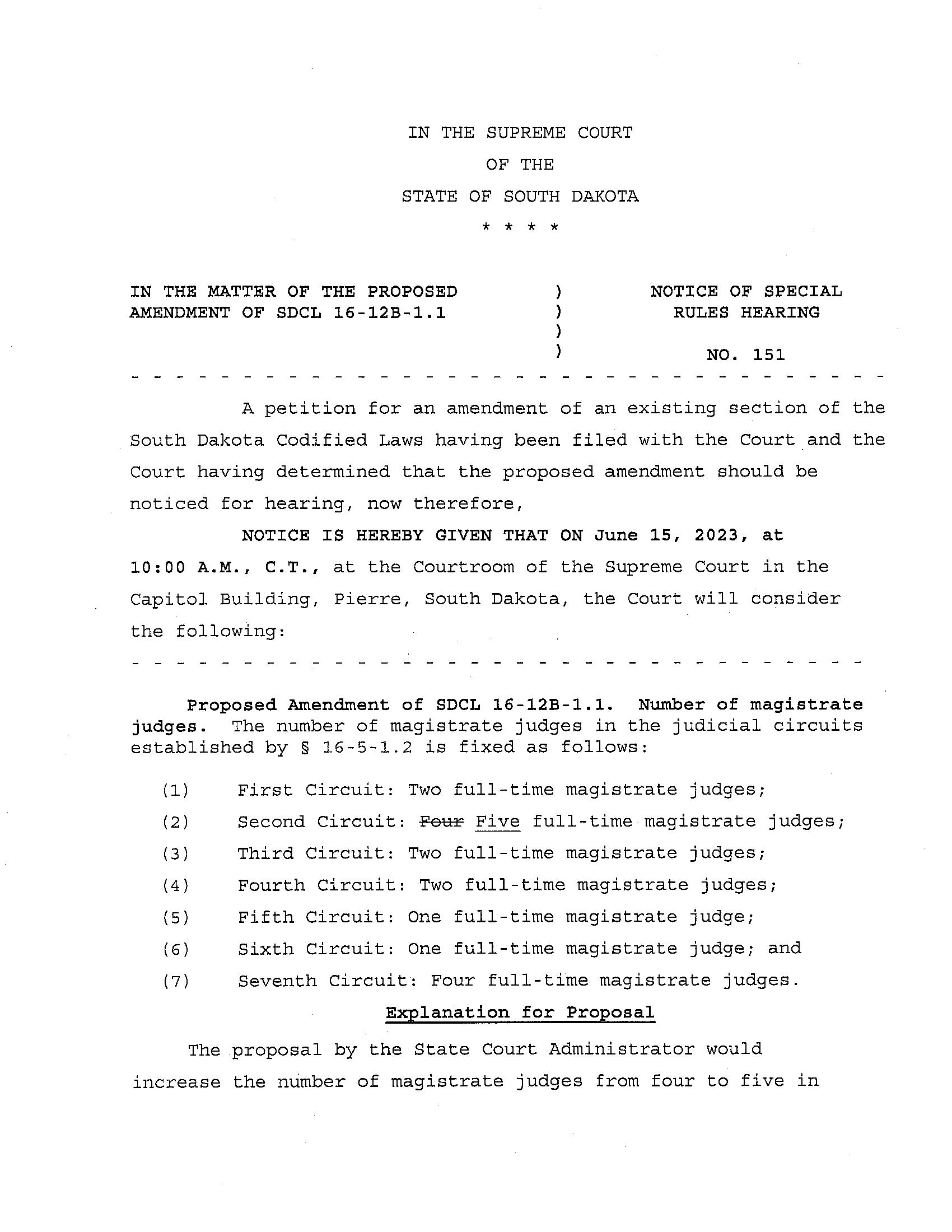
114
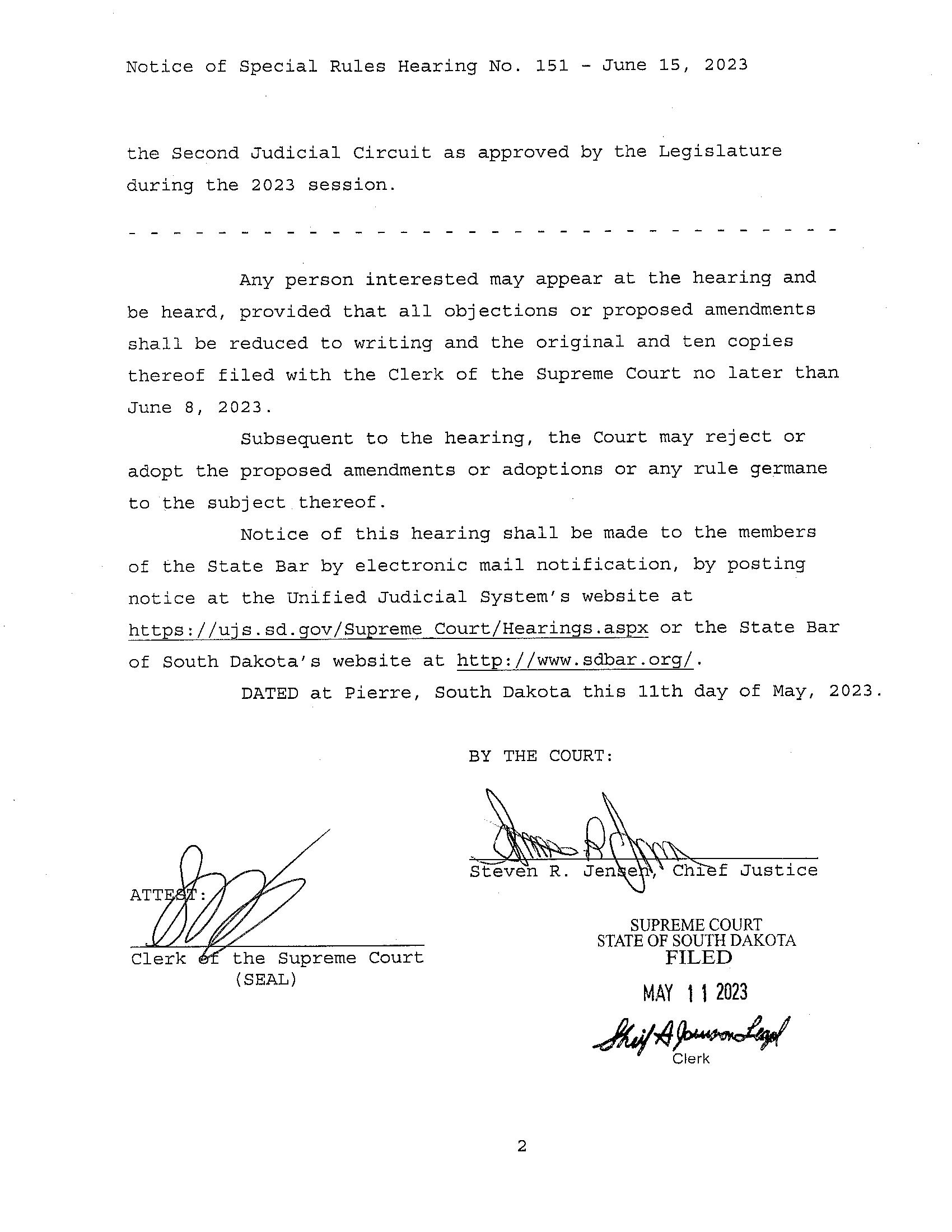
115
In Memoriam
Jerome Bryce Lammers
Jerome Bryce Lammers passed peacefully in the company of his wife of 60 years, Nancy, in the early hours of May 9, 2023, at the age of 85. Funeral services will be 2:00 PM, Saturday, May 13, 2023, at St. John Lutheran Church in Madison. Burial will follow at Graceland Cemetery. Visitation with the family present will be 4-6 PM, Friday, at the church, with a prayer service at 6.
Jerry was born in Madison, to Jerry (J.H.) and Regina (Kramer) Lammers in 1937. After graduating from Madison High School in 1955, Jerry attended undergraduate and law school at the University of South Dakota, finishing in 1961, before joining his father in the law practice he had established in Madison in 1923. Jerry continued practicing “country law” until 2021. In 1960, Jerry talked his high school sweetheart, Nancy Jones, into returning to South Dakota from Washington state to be his wife. They were married in Madison on October 6, 1961. Jerry and Nancy were blessed with a son, Ryker, in 1968 and a daughter, Heather, in 1971. Ryker and Heather both went on to get law degrees at the University of South Dakota, following the family tradition started by Jerry’s father in 1914.
Jerry’s professional and political accomplishments were varied and many. The highlights included: State Bar Commissioner (1973-1975), 16-year representative in the South Dakota State Legislature (1977-1992) with stints as Speaker of The House (1983-1984) and House Majority Leader (1986-1992), Chairman of the Executive Board of the Legislature Research Council (1979), and Member of Board of Directors for the South Dakota Cement Plant Commission (1995-2010).
In 2012, Jerry was inducted into the Dakota State University Innovators and Influencers Hall of Fame, an accomplishment that was especially sweet for him, as he had been a champion of (and largely responsible for) changing the University’s mission to technology focus in 1984.
While Jerry was certainly proud of his professional achievements, where he found the most joy was in spending time with family and friends, as well as indulging in his hobbies and charitable ventures. Jerry bought his beloved Piper Dakota low wing four-seater plane in 1977 shortly after he and his wife learned to fly. In addition to commuting to Pierre for the legislative sessions, he enjoyed flying to various places throughout the country, often with the family in tow. In 2002, Jerry and Nancy flew to New York as part of the Flight Across America tribute to the victims of 9/11. In the 1980s, Jerry and Nancy began volunteering for AirLifeLine, an organization that helps medical patients get to treatment centers that are too far away for them. When it was time to return to the lake home that he and Nancy owned since they were wed, there was always a Corvette in the garage, one of his few, true self-indulgences.
Jerry was also active on many local organizations and boards in Madison. His life-long commitment to the Kiwanis organization is just one of the ways Jerry showed a steadfast commitment to the community he called home.

Jerry is survived by his wife, Nancy, his son, Ryker (Molly) Lammers of Honolulu, Hawaii, daughter, Heather (Jay) Lammers Bogard of Spearfish, and grandchildren Regina Lammers, Nicolai Lammers, Kjellen Bogard, and Breon Bogard.
He was preceded in death by his parents, Jerry H. Lammers and Regina Lammers, as well as his brother, Gerard Lammers.

Joinusina confidential,open andsafespace. Anyattendeecan choosetoremain anonymous!
116
Your Assistance Program offers a wide range of benefits to help improve mental health, reduce stress, and make life easier all easily accessible through your member portal and app.
Video, Chat, and Telephonic Access
24/7/365 access to request mental health sessions and life management referrals
Thousands of Self-Care Articles and Resources
Explore videos, provider resource locators, personal assessments, calculators, and tools

Events Calendar and Free Webinars
Sign up for the latest webinars and online training sessions
Exclusive Discounts
Save money on entertainment, gifts, travel, and consumer goods
Getting Started Is Easy
1. Visit your landing page, SandCreekEap.com, and click on “Select Portal & App” in the top menu
2. Register to create a new account using your company code: SBSD1 A confirmation email will be sent to complete the process
Contact Sand Creek EAP
Call: 1-888-243-5744
Visit: SandCreekEap.com
Code: SBSD1
117
Judicial Qualifications Com mission
St ate of South D akot a 500 East Capitol Avenue
Pierre, SD 57101
Telephone 605-773-2099
Fax 605-773-8437
Mark Haigh, Chair
Rebecca Porter, Vice Chair
Hon. Robert Gusinsky, Secretary
Timothy Engel
Robert Morris
Rory King
Hon. Cheryle Gering
May 1, 2023
Lori Grode, Executive Assistant
Email: Lori.Grode@ujs.state.sd.us
Notice of Judicial Vacancy
TO: All Active Members of the State Bar of South Dakota
FROM: Robert Gusinsky, Secretary, Judicial Qualifications Commission
The retirement of the Hon. Tony L. Portra will create a vacancy for a Circuit Court Judge position (Position B) in the Fifth Judicial Circuit. The duty station for this position shall be located in Aberdeen, SD. The Judicial Qualifications Commission is now taking applications for this position.
All lawyers and judges interested in applying should obtain the application form at http://ujs.sd.gov/, or contact Lori Grode at the State Court Administrator’s Office. The application must be returned to the Administrator’s Office and must be postmarked no later than 5:00 PM on July 5, 2023. Applicants should make sure the application submitted is the 2018 revision.
You may also obtain the application form by writing or telephoning:
Lori Grode
State Court Administrator’s Office
500 East Capitol Avenue
Pierre, SD 57501
Telephone: 605-773-2099
Email: lori.grode@ujs.state.sd.us
Or, visit http://ujs.sd.gov/ for current job openings.
The Fifth Circuit is comprised of the following counties: Brown, Campbell, Day, Edmunds, Faulk, Marshall, McPherson, Roberts, Spink, and Walworth.
118
Request for Proposals
Call for Proposals for Organizational Ombuds for State Bar of South Dakota.

The State Bar of South Dakota is planning to provide organizational ombuds services for members and legal professionals who work with , and for, members. This proposal is to be performed on an independent contractor basis. We are looking for an experienced ombuds who will be available from August 1, 2023, through July 30, 2024 . The State Bar will assess the ombuds program during the contract term with the goal of determining the effectiveness and future needs of the program.
The Ombuds selected must be able to address sexual harassment complaints involving State Bar members and others involved in the legal system. The ombuds would not be an advocate for any individual or organization and would not be an investigator on behalf of the State Bar, Disciplinary Board, or Judicial Qualifications Commission. As such, the ombuds would not make binding decisions, mandate actions, or adjudicate claims. Instead, the ombuds could provide an informal, limited, and neutral process that may be in addition to, or in lieu of, more formal processes that a person subject to sexual harassment may pursue.
Sexual harassment constitutes discrimination and is illegal under federal, state, and local laws. For the purposes of this proposal, “sexual harassment” is defined (using the Equal Employment Opportunity Commission Guidelines ) as unwelcome sexual advances, requests for sexual favors and other verbal or physical conduct of a sexual nature when, for example: a) submission to such conduct is made either explicitly or implicitly a term or condition of an individual’s employment ; b) submission to or rejection of such conduct by an individual is used as the basis for employment decisions affecting such individual; or c) such conduct has the purpose or effect of unreasonably interfering with an individual’s work performance or creating an intimidating, hostile or offensive working environment.
Title VII of the Civil Rights Act of 1964 recognizes two types of sexual harassment: a)quid pro quo, and b) hostile work environment. Sexual harassment may include a range of subtle, and not-so-subtle, behaviors and may involve individuals of the same or different gender. Depending on the circumstances, these behaviors may include unwanted sexual advances or requests for sexual favors; sexual jokes and innuendo; verbal abuse of a sexual nature; commentary about an individual’s body, sexual prowess or sexual deficiencies; leering, whistling or touching; insultin g or obscene comments or gestures; display in the workplace of sexually suggestive objects or pictures; and other physical, verbal, or visual conduct of a sexual nature.
119
Qualifications:
Minimum requirements include five years of experience as an ombuds or equivalent experience in mediation or conflict resolution; and ombuds training (completion of IOA Foundations or equivalent). Preference given to members of the International Ombudsman Association . The services can be performed in South Dakota, i n person or remotely, or from locations nationwide on a remote basis.
Application Process:
Applicants should email a cover letter and a proposal for the services to the State Bar of South Dakota Executive Director, Paul Cremer (paul.cremer@sdbar.net) on or before July 5, 2023. Applicants may submit their intent to apply to Paul Cremer by June 15, 2023.
Proposal Requirements:
- Three letters of reference from experienced ombuds practitioners or mediators
- Resume (if individual applicant) or organizational description (if organizational applicant).
- A description of the prospective ombuds services to be provided and assistance in the development of the ombuds pro gram policies and procedures.
- A proposed cost for services, that will include the preparation of a quarterly report of aggregate data on services performed and insights to be provided to the State Bar Executive Director
Timeline for proposals
• RFP released by: June 1, 2023
• (Optional) Intent to apply by: June 15, 2023
• RFP bids due: July 5, 2023
• Interviews: July 15, 2023, until selection
Please visit our website at www.statebarofsouthdakota.com to learn more about the State Bar.
120
26th of each month next
Emailyouremploymentannouncement to tracie.bradford@sdbar.net by to haveitincludedinthe newsletter.Pleasebesure to include a closingdate. To seemorejobslistings,visit www.statebarofsouthdakota.com
General Counsel– Pierre

The SD Board of Regents, located in Pierre, SD, invites qualified applicants to apply for the role of General Counsel or Associate General Counsel. The role in which the successful candidate will serve will depend on relevant experience and qualifications. Regardless of the title, the attorney will be expected to deliver high quality and timely advice in all areas of law relevant to higher education, including personnel and employment issues, tenure and promotion, labor law, Title IX, student affairs, contracts, bonds, risk management, academic freedom, state authorization and distance education, gifts and development, intellectual property, and conflicts of interest.
If hired at the General Counsel level, the position will also serve as the chief legal counsel for the Board and Executive Director/CEO, with responsibility for, and oversight of, all university system legal affairs and staff.
Minimum Qualifications
Education and Experience
1.Juris Doctorate degree.
2.At least 3 years’ experience practicing law in a related field.
3.Experience with public entities and/or Boards.
4.Currently licensed to practice law in South Dakota, or ability to obtain licensure to practice in South Dakota within one year of hire.
Preferred Qualifications
If General Counsel:
1.At least 7 years’ experience practicing law.
2.Experience advising a large and complex organization on a broad range of legal issues.
3.Experience in higher education and/or advising B oards.
4.Demonstrated ability to mentor, work with, and/or supervise other attorneys and to serve as a leader.
If Associate General Counsel:
1.At least 5 years’ experience practicing law.
2.Demonstrated ability to provide excellent legal advice and to exercise sound judgement in high pressure situations.
General Counsel: $145,000 - $165,000; Associate General Counsel: $110,000 - $130,000
Kayla Bastian Chief HR Officer
kayla.bastian@sdbor.edu 605-773-3455
Documents Needed to Apply
Required Documents
1.Resume
2.Cover Letter
3.Reference List
To apply: https://yourfuture.sdbor.edu/postings/34253
Working for SDBOR
The SD Board of Regents offers a great working environment and a competitive salary and benefits package, including 11 paid holidays, paid sick leave, vacation leave and paid family leave, SD Retirement System, health and flexible benefits, and professional development opportunities.
121
Deputy State’s Attorney– Pennington Co.
Position Objective:
The role of a Deputy State’s Attorney is to work collaboratively with law enforcement in enforcing the laws in the jurisdiction of Pennington County. They represent the State of South Dakota in all stages of court proceedings.
Essential Functions:
• Reviewing law enforcement reports.
• Making criminal charging decisions.
• Presenting evidence at probable cause hearings, whether before the Court or Grand Jury.
• Representing the State of South Dakota at Initial Appearances and Arraignments.
• Representing the State of South Dakota at Status and Motion Hearings.
• Representing the State of South Dakota at Evidentiary Hearings.
• Making bond arguments at hearings before the Court.
• Conducting legal research and writing, and motion preparation.
• Abiding by all victims’ rights and assisting victims through the criminal justice system. Meeting with victims and other witnesses throughout the prosecution of cases.
• Preparing law enforcement officers, witnesses and victims for courtroom testimony.
• Preparation for and presentation of evidence at court and jury trials.
• Deputy State’s Attorneys routinely field phone calls from citizens and interested parties about criminal prosecutions.
• They are also responsible for updating and training law enforcement on relevant areas of the law.
• Deputy State’s Attorneys also represent the State of South Dakota at involuntary mental commitments, involuntary drug and alcohol commitments and fugitive proceedings.
• Deputy State’s Attorneys handle appeals from magistrate to circuit court, and initial habeas filings at the State level.
• The Deputy State’s Attorney assigned as the juvenile prosecutor acts as a liaison to the Juvenile Detention Alternative Initiative Committee (JDAI), and meets daily with this group to discuss alternatives to detention placements. This attorney works collaboratively with the Juvenile Services Center, the Department of Corrections and Court Services and prosecutes all stages of litigation for juvenile offenders.
• The Deputy State’s Attorney assigned to abuse and neglect prosecution represents the Department of Social Services (DSS) in all stages of litigation in civil proceedings against parents and guardians accused of abusing or neglecting their children. Works cooperatively with DSS, tribal representatives, children’s counsel, Department of Corrections, law enforcement and Court Services.
• The Deputy State’s Attorney assigned to the Civil Division handles planning and zoning cases and assists the Civil Chief Deputy as the legal representative for all County Department Heads and the County Commission.
• The Deputy State’s Attorney assigned to Magistrate Court represents the State of South Dakota in misdemeanor cases (those punishable by up to one year in county jail.)
• The Deputy State’s Attorney and Senior Deputy State’s Attorney assigned to Circuit Court represent the State of South Dakota in the same manner as those assigned to Magistrate Court. In addition, these attorneys will represent the State in felony matters (ranging in punishment from two years in the State Penitentiary to life imprisonment.) These attorneys will also be assigned with one or more specialty courts. These attorneys may also be called upon to assist with law enforcement investigation, search warrants and visit crime scenes. These attorneys are also responsible for the presentation of evidence and cases to the Pennington County Grand Jury.
Experience and/or Education Required:
• Bachelor’s Degree from an accredited University.
• Juris Doctorate Degree from an accredited University.
• Membership in the State Bar of South Dakota.
Working Environment:
• Most work is performed indoors in an office where noise and interruptions often occur.
• Must walk to the Pennington County Courthouse for multiple daily court appearances in all weather, carrying multiple files.
• Overtime hours may be required to adequately prepare for jury trials and complicated hearings.
• Some travel may be required for training, meetings, mental commitment hearings and appearances as needed in other jurisdictions.
Physical Requirements:
• Must be able to frequently sit, walk, stand, bend, kneel,
122
stoop, reach and lift, push or pull and manual dexterity is needed to type, write, use a calculator, and answer telephone.
• Must be able to walk two blocks multiple times a day to court in all weather.
• Upper body strength is a requisite to lift/move a maximum of 20 lbs. unassisted to carry files to court.
• Ability to communicate effectively orally and in writing.
• The ability to talk and communicate both electronically and face to face.
Deputy State’s Attorney - Civil - Pennington County
Successful applicant will assist the Civil Chief Deputy State’s Attorney in providing legal representation to Pennington County government offices, departments and the County Commission. Attorneys assigned to the Civil Department encounter a wide range of issues in the field of civil government practice similar to what a private practice attorney may experience but with additional responsibilities unique to representing government entities. Please see online job description for further details. Apply at www.pennco.org/jobs if interested.
Staff Attorney – Pierre / Sioux Falls / Rapid City
Disability Rights South Dakota is currently seeking an attorney for the position of Staff Attorney/Team Lead. This position can be in Pierre, Sioux Falls, or Rapid City, to be determined by successful applicant.
The primary purpose of this position is to provide legal representation to clients of Disability Rights South Dakota and perform oversight of program(s) within Disability Rights South Dakota. The successful candidate will hold a Juris Doctor degree with admission to the state bar or within six months of hiring date; one to three years applicable law and litigation experience is preferred. The candidate should be highly motivated, organized, have excellent communication skills (written and oral), be detail orientated, and have an understanding of database programs.
Other skills needed are the ability to meet and greet the public, work in a team environment, and have an understanding of the service delivery system. This
position requires the incumbent to have knowledge of grant management including compliance to the sponsored programs at the local, state and/or federal levels (depending on granting agency). The incumbent should have knowledge of state laws, programs, and issues concerning persons with disabilities and understanding of a non-profit office environment. Competitive salary and full benefits are provided. Position open until filled.
To apply please include a letter of interest, resume, and writing sample to drsd@drsdlaw.org or mail to:
Disability Rights South Dakota
2520 E. Franklin St., Ste. 2
Pierre, SD 57501
Open until filled
Assistant Federal Public Defender - Pierre
The Federal Public Defender for the Districts of South Dakota and North Dakota seeks an attorney to join our branch office in Pierre, South Dakota. Our office provides high-quality representation to people charged with federal crimes who cannot afford to hire an attorney. We operate under the authority of the Criminal Justice Act.
Position Description: Assistant Federal Public Defenders zealously and professionally represent clients in a fast-paced, challenging, diverse, and rewarding work environment. Responsibilities include managing a caseload; working with clients; interviewing witnesses and family members; developing release plans; reviewing discovery; preparing pleadings, motions, and briefs; developing litigation strategies; working with experts; advising CJA panel attorneys; and in-court litigation through all stages of a criminal case. Some travel is necessary. Attorneys in our office may not engage in the private practice of law.
Qualifications: By the time of entrance on duty the applicant must (1) have graduated from an accredited law school; (2) have been admitted to practice in good standing before the highest court of a state or the District of Columbia; (3) be eligible for admission to practice in the US District Court for the District of South Dakota by the time of entrance on duty; (4) be willing to become admitted to the South Dakota Bar within a year of beginning employment; and (5) have obtained US citizenship or work authorization.
123
Above all we are looking for applicants with a demonstrated commitment to indigent defense, and an ability to work well in a team environment. We value a willingness to gain courtroom experience, creativity, and research and writing skills. We are flexible on start date and willing to train the right candidate.
Salary and Benefits: The salary range is commensurate with experience. The position is full-time with federal benefits, including health and life insurance, retirement, and the Thrift Savings Plan. Salary is paid bi-weekly and only by direct deposit. A final offer of employment is subject to funding and a background check.
How to Apply: Apply by emailing a letter of interest, resume, three references, and a recent writing sample in a single pdf document to SDX_JOBS@fd.org. Position is open until filled with priority consideration prior to June 30, 2023.
Attorney – Pierre
Tieszen Law Office, Prof. LLC, is seeking to add an attorney to its office located in Pierre, S.D.
The successful candidate for this position will have the opportunity to be involved in a general practice including all phases of civil litigation, estate planning, probates, real estate transactions, formation and counseling of business clients, and criminal defense. Duties and responsibilities will include meeting with and counseling clients, legal research and drafting on pleadings and other legal documents, appearing in court and administrative proceedings, preparing estate planning documents, and formation of business entities. Lobbying opportunities may also be available in the South Dakota Legislative arena.
Candidates should have excellent writing, research, and communication skills, and be able to work well independently and as a team member in an energetic environment.
Salary depending on experience, with increases depending on performance.
Interested applicants should send their cover letter, resume, and references to Naomi Cromwell, Tieszen Law Office, Prof. LLC, PO Box 550, Pierre SD 57501, or by email to naomic@tieszenlaw.com. Applications will be kept confidential.
Institutional Trust Officer II – Sioux Falls
The First National Bank in Sioux Falls is accepting applications for an Institutional Trust Officer II. This is an excellent opportunity to join an industry leading Wealth Management team with a focus on providing excellent service and expertise. This position will function as the Institutional Trust relationship manager, coordinating with all areas of the Bank to meet the client’s needs. Manage independent administration of accounts naming The First National Bank in Sioux Falls in fiduciary capacities. Maintain close communication with clients, professionals, and beneficiaries to accomplish goals and objectives of the account relationship. Will also assist with business development activities of the Wealth Management Department.
Candidates must have a Bachelor’s Degree or better in General Business or related field. Five years of Trust or Banking/ Financial services experience or an advanced degree are preferred. Please visit our Careers page to learn more about us and to apply: www.fnbsf.com/ careers.
Litigation Associate– Rapid City
Goodsell + Oviatt Law Firm is seeking a Litigation Associate, as either lateral or new associate, in Rapid City, SD. Primary work will be personal injury, construction, insurance law, with some business law/commercial matters. This position also requires research, brief writing, trial preparation and complex litigation before state and federal courts in South Dakota and North Dakota. Strong academic credentials and excellent communication skills (both oral and written) required.
The firm offers a comprehensive benefit plan and an opportunity for professional development and growth. Competitive salary DOE.
Confidential inquiries, including résumé and cover letter detailing experience, should be directed to Nathan Oviatt, Attorney or Sherry Dwyer, Business Manager, Goodsell + Oviatt Law Firm, 246 Founders Park Drive, Suite 201, Rapid City, SD 57701 or by email at nate@ goodselloviatt.com or sherry@goodselloviatt.com.
124
Litigation Attorney– Rapid City
Gunderson, Palmer, Nelson & Ashmore, LLP, an AVRated, 20+-lawyer firm located in Rapid City and Pierre, South Dakota, is looking for a litigation associate attorney at the Rapid City location. The ideal candidate will have a minimum three years of litigation experience. Must be a member of South Dakota State Bar or have to ability to become member. Must possess a strong business sense and strategic decision-making skills.
The firm offers a comprehensive benefits plan, competitive salary structure and the opportunity for professional development. You can learn more about our firm by visiting our website at gpna.com or our Facebook page at Facebook.com/GPNAlawfirm/.
All inquiries will be kept confidential. Please send your cover letter, resume, curriculum vitae and references to our firm’s Legal Administrator, Kate Ackerson at kackerson@gpna.com or by coming into our office at 506 6th Street, Rapid City, SD 57701.
Attorney– Brookings
Ribstein & Hogan Law Firm has an immediate opening for an associate position. We are looking for candidates with experience levels ranging from newly licensed lawyers to those with several years of experience. Only candidates seeking a long-term employment opportunity will be considered. Primary work will be a general practice including criminal, family law, and civil litigation. This position also requires research, brief writing, trial preparation, and litigation. Excellent academic credentials and writing skills are required.
Confidential inquiries, including resume and cover letter should be directed to Rick A. Ribstein or Tim Hogan, Ribstein & Hogan Law Firm, 621 6th St., Brookings, SD 57006 or by email rickribstein@sdakotalaw.com or timhogan@sdakotalaw.com. We offer competitive salary and benefit package.
Assistant U.S. Attorney– Sioux Falls
The U.S. Attorney’s Office for the District of South Dakota is currently hiring an Assistant U.S. Attorney to work in the Civil Division and specialize in financial litigation, with an emphasis on recovering assets to pay restitution to victims of crime and commencing civil actions to recover debts owed to federal agencies. In some
cases, the AUSA may identify and freeze proceeds of crimes and other criminal assets both domestically and internationally. The AUSA may represent the interest of federal agencies in foreclosure and bankruptcy matters. The AUSA will be responsible for handling a large and active caseload, working in close cooperation with the Financial Litigation staff, AUSAs in the Criminal Division, and agency clients. The AUSA will appear in both U.S. District Court and U.S. Bankruptcy Court. Other civil matters may also be assigned as the Civil Division has a wide variety of affirmative and defensive cases including torts, employment discrimination, civil rights, and prisoner litigation.
Working as a Financial Litigation AUSA in this district improves the quality of life for victims of crime by ensuring that victims receive court ordered restitution. Serving as an AUSA provides attorneys with the opportunity to work among mission-driven colleagues who are dedicated to the cause of justice in the District of South Dakota. AUSAs engage in regular collaboration with AUSAs in the district, as well as subject matter experts within the Department of Justice. With respect to professional development, AUSAs have access to a broad range of training, both onsite and at the National Advocacy Center in Columbia, South Carolina, at no cost to the AUSA.
This full vacancy announcement and other attorney vacancy announcements can be found at: https://www.justice.gov/legal-careers
More information about the U.S. Attorney’s Office, South Dakota can be found at: http://www.justice.gov/ usao/sd/.
Required qualifications: Applicants must possess a J.D. degree, be an active member in good standing of the South Dakota State Bar Association, or become a member within one year of hiring, and have at least oneyear post-J.D. legal experience. United States citizenship is required.
Preferred qualifications: The USAO seeks to hire lawyers with a wide range of exceptional skills and experience, unified by keen intelligence and a sincere commitment to public service. Financial litigation experience, superior academic record, excellent writing skills, impeccable character, demonstrated interest in public service, courtroom presence, and the ability to work with and relate to a wide variety of people are all
125
considered.
Salary:
Assistant United States Attorneys pay is administratively determined based, in part, on the number of years of professional experience. The range of starting pay including a 16.50% locality payment is $69,107 to $180,756.
To apply, please submit a cover letter; a detailed resume; at least three references; and one writing sample that does not exceed 15 pages which is sufficiently complex to highlight your analytical skills. The sample should be primarily your own writing and editing, and it should be as recent as possible. All documents are to be submitted electronically in one single PDF attachment and include the announcement number (23-SD-CIVIL-001) in the subject line of your
Email address for application package: USASD. applications@usdoj.gov.
Applications must be received by 5 p.m. CST, Friday, June 9, 2023
Assistant U.S. Attorney– Rapid City
The U.S. Attorney’s Office for the District of South Dakota is seeking an experienced attorney to fill one Assistant United States Attorney (AUSA) position in the Criminal Division of its Rapid City office. AUSAs in the Criminal Division advise federal law enforcement agents on criminal investigations, present criminal cases to the grand jury, prepare and argue a broad range of motions, and try criminal cases before the United States District Court. Candidates should be capable of handling significant and complex criminal prosecutions involving a variety of violations of federal laws related to firearms, narcotics, white collar fraud, child pornography, and immigration crimes as well as Major Crimes Act violations in Indian Country involving murder, child sex abuse, rape, and more.
This full vacancy announcement and other attorney vacancy announcements can be found at: https://www.justice.gov/legal-careers
More information about the U.S. Attorney’s Office, South Dakota can be found at: http://www.justice.gov/ usao/sd/
Required qualifications: Applicants must possess a J.D. degree, be an active member of the bar (any U.S. jurisdiction) and have at least one year of post-JD legal or other relevant experience. Be a U.S. citizen or National. In addition, applicant must also be a member, or be eligible to become a member, of the federal district court bar. If the successful candidate is not a member of the South Dakota Bar, he or she must become a member of the South Dakota Bar within twelve months.
Preferred Qualifications: Applicants must demonstrate superior analytical ability; strong research, writing and courtroom skills; exercise fair and sound judgment; follow all Department of Justice and United States Attorney’s Office policies; exhibit the ability to work collaboratively in a supportive and professional manner with other attorneys, support staff, and law enforcement agencies; superior analytical and communications skills; handle matters in court persuasively and justly on behalf of the United States of America; and be devoted to excellence.
Salary:
Assistant United States Attorneys pay is administratively determined based, in part, on the number of years of professional experience. The range of starting pay including a 16.50% locality payment is $69,107 to $180,756.
Provide cover letter, resume, writing sample (not to exceed 20 pages), and list of three professional references with contact information. All documents should be submitted electronically in one continuous .pdf attachment and include the announcement number (23-SD-CRIM-002) in the subject line of your email. Email address for application package: USASD.applications@usdoj.gov.
Applications must be received by Friday, June 2, 2023
Assistant U.S. Attorney– Pierre
The U.S. Attorney’s Office for the District of South Dakota is seeking an experienced attorney to fill one Assistant United States Attorney (AUSA) position in the Criminal Division of its Pierre office. AUSAs in the Criminal Division advise federal law enforcement agents on criminal investigations, present criminal cases to the grand jury, prepare and argue a broad range of motions, and try criminal cases before the United
126
States District Court. Candidates should be capable of handling a variety of significant and complex criminal prosecutions, including Major Crimes Act violations involving murder, child sex abuse, rape; white collar and economic crime; narcotics and immigration. The majority of the cases prosecuted in this position will involve violent crime in Indian Country. While work will certainly vary; the applicant should expect to primarily prosecute violent crimes in Indian Country.
This full vacancy announcement and other attorney vacancy announcements can be found at: https://www.justice.gov/legal-careers
More information about the U.S. Attorney’s Office, South Dakota can be found at: http://www.justice.gov/ usao/sd/.
Required qualifications: Applicants must possess a J.D. degree, be an active member of the bar (any U.S. jurisdiction) and have at least one year of post-JD legal or other relevant experience. Be a U.S. citizen or National. In addition, applicant must also be a member, or be eligible to become a member, of the federal district court bar. If the successful candidate is not a member of the South Dakota Bar, he or she must become a member of the South Dakota Bar within twelve months.
Preferred Qualifications: Applicants must demonstrate superior analytical ability; strong research, writing and courtroom skills; exercise fair and sound judgment; follow all Department of Justice and United States Attorney’s Office policies; exhibit the ability to work collaboratively in a supportive and professional manner with other attorneys, support staff, and law enforcement agencies; superior analytical and communications skills; handle matters in court persuasively and justly on behalf of the United States of America; and be devoted to excellence.
Salary:
Assistant United States Attorneys pay is administratively determined based, in part, on the number of years of professional experience. The range of starting pay including a 16.50% locality payment is $69,107 to $180,756.
Provide cover letter, resume, writing sample (not to exceed 20 pages), and list of three professional references with contact information. All documents
should be submitted electronically in one continuous .pdf attachment and include the announcement number (23-SD-CRIM-003) in the subject line of your email. Email address for application package: USASD.applications@usdoj.gov.
Applications must be received by 5 p.m. CST, Friday, June 2, 2023
Attorney– Research & Writing SpecialistIowa
The Federal Public Defender for the Northern and Southern Districts of Iowa is accepting applications for a Research and Writing Specialist to be stationed in either our Cedar Rapids or Davenport office. The Federal Public Defender operates under authority of the Criminal Justice Act, 18 U.S.C. § 3006A, to provide representation in federal criminal cases and related matters in the federal courts.
JOB DESCRIPTION: This is an ideal position for an attorney with strong research and writing skills and a commitment to federal criminal defense work. The Research and Writing Specialist drafts motions, memoranda, petitions, and briefs to be filed in the U.S. District Court, the U.S. Court of Appeals, and the U.S. Supreme Court. The successful candidate will consult with Assistant Federal Public Defenders and other attorneys on legal issues arising in motion practice, evidentiary hearings, trials, and appeals, and on general advice to clients. The Research and Writing Specialist will travel throughout Iowa to attend trials and assist Assistant Federal Public Defenders with research and writing needs that arise during trial. The successful candidate may also be expected to travel for oral argument before the Eighth Circuit, usually in St. Louis or St. Paul.
REQUIREMENTS AND QUALIFICATIONS:
Applicants must have 1) a law school degree with admission and good standing before the highest court of any state; 2) a minimum of three years’ general and two years’ specialized experience; 3) knowledge of federal criminal law and procedures; 4) outstanding legal research and writing skills; 5) strong typing and automation skills; and 6) a strong desire to be a teamplayer and an excellent coworker.
SELECTION CRITERIA: The successful applicant will
127
have an established capacity or clearly demonstrated aptitude for excellence in criminal defense practice, a commitment to the representation of indigent accused persons, and a reputation for personal integrity. Applicant must also possess the ability to communicate effectively with clients, witnesses, staff, colleagues, and other individuals that they will come in contact with as part of their employment. Experience with and a working knowledge of the federal sentencing guidelines is preferred. Experience as a federal judicial clerk is strongly preferred (especially on a federal Court of Appeals).
BACKGROUND CHECK: The selected candidate will be subject to a background check as a condition of employment. Employment will be considered provisional until a satisfactory background check is confirmed.
SALARY AND BENEFITS: This is a full-time position with a salary range of grade JSP-9/1, $57,118, to grade JSP-15/1, $136,908, commensurate with experience. Benefits include health and life insurance, retirement and the Thrift Savings Plan. Some telework is offered. This position is subject to mandatory Electronic Funds Transfer payment of net pay. The position is subject to funding.
HOW TO APPLY: Electronically submit cover letter, resume and a writing sample in a single PDF by June 12, 2023 to Denise_Fest@fd.org. The successful candidate must be able to commence employment by autumn 2023. The email subject line must read: Position Announcement 2301. Only applicants considered for an interview will be contacted. Position open until filled. No telephone calls please.
The Federal Public Defender is an equal opportunity employer.
court procedures. Working knowledge of principles, methods, materials, and practices utilized in legal research. Ability to speak, and write effectively in the preparation and presentation of legal matters. Must have knowledge, and experience using computers, word processing, and electronic legal research.
DUTIES:
• The Assistant Prosecutor shall institute proceedings before Judges of the Rosebud Sioux Tribe for the arrest and convictions of persons charged with criminal offenses against the Rosebud Sioux Tribe, or the people of the Rosebud Sioux Tribe.
• The Assistant Prosecutor shall prosecute or intervene for the Rosebud Sioux Tribe in all tribal courts civil matters in which the Rosebud Sioux Tribe may be a party, or may be interested or concerned.
• The Assistant Prosecutor, when directed by the Chief Prosecutor to prosecute civil actions in the Rosebud Sioux Tribal Courts against those convicted of criminal offenses for the restitution of any property or money due to the Rosebud Sioux Tribe.
• The Assistant Prosecutor shall keep a record of activities of the Prosecutor, and enter every action prosecuted, criminal, and civil.
• The Assistant Prosecutor shall consult on a frequent basis with the Chief Prosecutor.
• The Assistant Prosecutor shall meet with the Rosebud Sioux Tribal Police concerning criminal or other matters.
• The Assistant Prosecutor shall review Rosebud Sioux Tribal police reports for criminal charging.
• The Assistant Prosecutor shall interview victims and witnesses to prepare criminal charging.
Assistant Prosecutor – Rosebud Supervisor: Attorney General Chief Prosecutor
Salary: Negotiable
Location: Rosebud Sioux Tribe, Rosebud, SD.
ESSENTIAL DUTIES and RESPONSIBILITIES: Must have basic knowledge of civil and criminal law, methods, and practices of pleadings. Working knowledge of
• The Assistant Prosecutor represents the Rosebud Sioux Tribe in all stages of the criminal proceedings, including arraignments, probable cause hearings, suppression hearings, trials, mental illness cases, and alcohol commitment cases.
• The successful applicant must have a desire and energy to work with people in and out of court and courtroom settings.
• The Assistant Prosecutor shall take cases through the appeal process at the requests of the Chief Prosecutor.
• To act as Assistant Prosecutor in juvenile cases
128
when appointed by the Chief Prosecutor.
• The Assistant Prosecutor shall prepare and provide monthly reports to the Chief Prosecutor.
• The Assistant Prosecutor shall attend meetings regarding activities, needs, and accomplishments of the Tribal Prosecutor’s Office, when requested to do so.
• The Assistant Prosecutor shall maintain strict confidentiality in all work aspects.
• The assistant Prosecutor shall uphold Rosebud Sioux Tribal Court Personnel Ethics Code.
• The Assistant Prosecutor shall exhibit consistent professionalism and courtesy to coworkers, clients, and the public.
• The Assistant Prosecutor shall be responsible for all other duties assigned.
MINIMUM QUALIFICATIONS:
• Juris Doctorate Degree from an accredited Law School. Previous legal and courtroom experience will be considered in lieu of a degree.
• Applicants must also demonstrate competence in criminal and civil advocacy.
• This position is one where contact with the public is of great confidence.
• Must be of high moral character and integrity.
• Must never been convicted of a felony for which he or she has not received a pardon.
• Applicant will be required to take, and pass the Rosebud Sioux Tribal Bar at the earliest date following employment.
• Must have knowledge of computer word processing software, and experience working with Microsoft Word and Excel
• Must have a South Dakota Driver’s License, and be able to successfully pass a background and drug testing.
For more information Contact Sharon Guerue 605-7473193 or sharon.guerue@rstjustice.org
Applications can be found online at https://www. rosebudsiouxtribe-nsn.gov/employment
Staff Attorney – Pine Ridge
Are you passionate about racial justice and holistic legal advocacy? Join our team, and make a long-term impact!
DAKOTA PLAINS LEGAL SERVICES (DPLS), a non-profit legal services program, has an opening for a Staff Attorney position in our Pine Ridge, South Dakota, office. The Pine Ridge office serves the Pine Ridge Reservation and Bennett, Jackson and Shannon counties in South Dakota.
QUALIFICATIONS/RESPONSIBILITIES: Applicants must have a JD degree and be licensed to practice, or by reciprocity be able to obtain a license to practice, in South Dakota, or be qualified to take the next South Dakota Bar Exam; must be a bright, motivated, selfstarter; must have the tenacity to assume immediate practice responsibilities, including handling a significant caseload touching on many different areas of law with regular appearances in court; and must demonstrate an interest in poverty law and working with Native American and low income clients.
SALARY: Starting at $60,000 plus, depending on experience. DPLS has excellent fringe benefits, including generous leave benefits and employee insurance coverage (medical, dental, life, disability).
CLOSING DATE: Open until filled.
APPLICATION INFORMATION: Please submit a letter of interest and resume to: Thomas S. Mortland, Executive Director, Dakota Plains Legal Services, PO Box 727, Mission, SD 57555, (605) 856-4444, tmortland@dpls.org.
Native Americans, Women and Minorities are encouraged to apply. Dakota Plains Legal Services is an Equal Opportunity Employer.
129
Staff Attorney – Rapid City
Are you passionate about racial justice and holistic legal advocacy? Join our team, and make a long-term impact!
DAKOTA PLAINS LEGAL SERVICES (DPLS), a nonprofit legal services program, has an opening for a Staff Attorney position in our Rapid City, South Dakota, office. The Rapid City office serves Butte, Custer, Fall River, Harding, Lawrence, Meade, Pennington and Perkins counties in South Dakota.
QUALIFICATIONS/RESPONSIBILITIES: Applicants must have a JD degree and be licensed to practice, or by reciprocity be able to obtain a license to practice, in South Dakota, or be qualified to take the next South Dakota Bar Exam; must be a bright, motivated, selfstarter; must have the tenacity to assume immediate practice responsibilities, including handling a significant caseload touching on many different areas of law with regular appearances in court; and must demonstrate an interest in poverty law and working with Native American and low income clients.
SALARY: Starting at $60,000 plus, depending on experience. DPLS has excellent fringe benefits, including generous leave benefits and employee insurance coverage (medical, dental, life, disability).
CLOSING DATE: Open until filled.
APPLICATION INFORMATION: Please submit a letter of interest and resume to: Thomas S. Mortland, Executive Director, Dakota Plains Legal Services, PO Box 727, Mission, SD 57555, (605) 856-4444, tmortland@dpls.org.
Native Americans, Women and Minorities are encouraged to apply. Dakota Plains Legal Services is an Equal Opportunity Employer.
Staff Attorney – Ft. Yates, ND
Are you passionate about racial justice and holistic legal advocacy? Join our team, and make a long-term impact!
DAKOTA PLAINS LEGAL SERVICES (DPLS), a nonprofit legal services program, has an opening for a Staff Attorney position in our Ft. Yates, North Dakota office. The Ft. Yates office serves Campbell, Corson and Walworth counties in South Dakota and the Standing
Rock Indian Reservation.
QUALIFICATIONS/RESPONSIBILITIES: Applicants must have a JD degree and be licensed to practice, or by reciprocity be able to obtain a license to practice, in South Dakota, or be qualified to take the next South Dakota Bar Exam; must be a bright, motivated, selfstarter; must have the tenacity to assume immediate practice responsibilities, including handling a significant caseload touching on many different areas of law with regular appearances in court; and must demonstrate an interest in poverty law and working with Native American and low income clients.
SALARY: Starting at $60,000 plus, depending on experience. DPLS has excellent fringe benefits, including generous leave benefits and employee insurance coverage (medical, dental, life, disability).
CLOSING DATE: Open until filled.
APPLICATION INFORMATION: Please submit a letter of interest and resume to: Thomas S. Mortland, Executive Director, Dakota Plains Legal Services, PO Box 727, Mission, SD 57555, (605) 856-4444, tmortland@dpls.org.
Native Americans, Women and Minorities are encouraged to apply. Dakota Plains Legal Services is an Equal Opportunity Employer.
Staff Attorney – Mission
DAKOTA PLAINS LEGAL SERVICES (DPLS), a nonprofit legal services program, has an opening for a Staff Attorney position in our Mission, South Dakota office. The Mission office serves the counties Gregory, Jones, Mellette, Todd and Tripp, along with the Rosebud Reservation.
QUALIFICATIONS/RESPONSIBILITIES: Applicants must have a JD degree and be licensed to practice, or by reciprocity be able to obtain a license to practice, in South Dakota, or be qualified to take the next South Dakota Bar Exam; must be a bright, motivated, selfstarter; must have the tenacity to assume immediate practice responsibilities, including handling a significant caseload touching on many different areas of law with an emphasis on family law. Additionally, the applicant should expect to make regular appearances in state and tribal court. Applicants must demonstrate an interest in
130
poverty law and working with Native American and low income clients.
SALARY: Starting at $60,000 plus, depending on experience. DPLS has excellent fringe benefits, including generous leave benefits and employee insurance coverage (medical, dental, life, disability).
CLOSING DATE: Open until filled.
APPLICATION INFORMATION: Please submit a letter of interest and resume to: Thomas S. Mortland, Executive Director, Dakota Plains Legal Services, PO Box 727, Mission, SD 57555, (605) 856-4444, tmortland@dpls.org.
Native Americans, Women and Minorities are encouraged to apply. Dakota Plains Legal Services is an Equal Opportunity Employer.
Staff Attorney – Fort Thompson
Are you passionate about racial justice and holistic legal advocacy? Join our team, and make a long-term impact!
Brule and Crow Creek Reservations.
QUALIFICATIONS/RESPONSIBILITIES: Applicants must have a JD degree and be licensed to practice, or by reciprocity be able to obtain a license to practice, in South Dakota, or be qualified to take the next South Dakota Bar Exam; must be a bright, motivated, selfstarter; must have the tenacity to assume immediate practice responsibilities, including handling a significant caseload touching on many different areas of law with regular appearances in court; and must demonstrate an interest in poverty law and working with Native American and low income clients.
SALARY: Starting at $60,000 plus depending on experience. DPLS has excellent fringe benefits, including generous leave benefits and employee insurance coverage (medical, dental, life, disability).
CLOSING DATE: Open until filled.
APPLICATION INFORMATION: Please submit a letter of interest and resume to: Thomas S. Mortland, Executive Director, Dakota Plains Legal Services, PO Box 727, Mission, SD 57555, (605) 856-4444, tmortland@dpls.org

131
Events!


132









Get started at lawpay.com/sbsd 866-730-4140 TOTAL: $1,500.00 New Case Reference **** **** **** 9995 *** Trust Payment IOLTA Deposit YOUR FIRM L OGO HERE PAY AT TO RNEY PO WE R ED BY 22% increase in cash flow with online payments Vetted and approved by all 50 state bars, 70+ local and specialty bars, the ABA, and the ALA 62% of bills sent online are paid in 24 hours Data based on an average of firm accounts receivables increases using online billing solutions. LawPay is a registered agent of Synovus Bank, Columbus, GA., and Fifth Third Bank, N.A., Cincinnati, OH. Trusted by 50,000 law firms, LawPay is a simple, secure solution that allows you to easily accept credit and eCheck payments online, in person, or through your favorite practice management tools. Member Benefit Provider I love LawPay! I’m not sure why
waited so long to get it set up. –L aw Firm in Ohio + 133
I
























































































 Justice Steven Jensen, on behalf of the South Dakota Unified Judicial System
Justice Steven Jensen, on behalf of the South Dakota Unified Judicial System




























